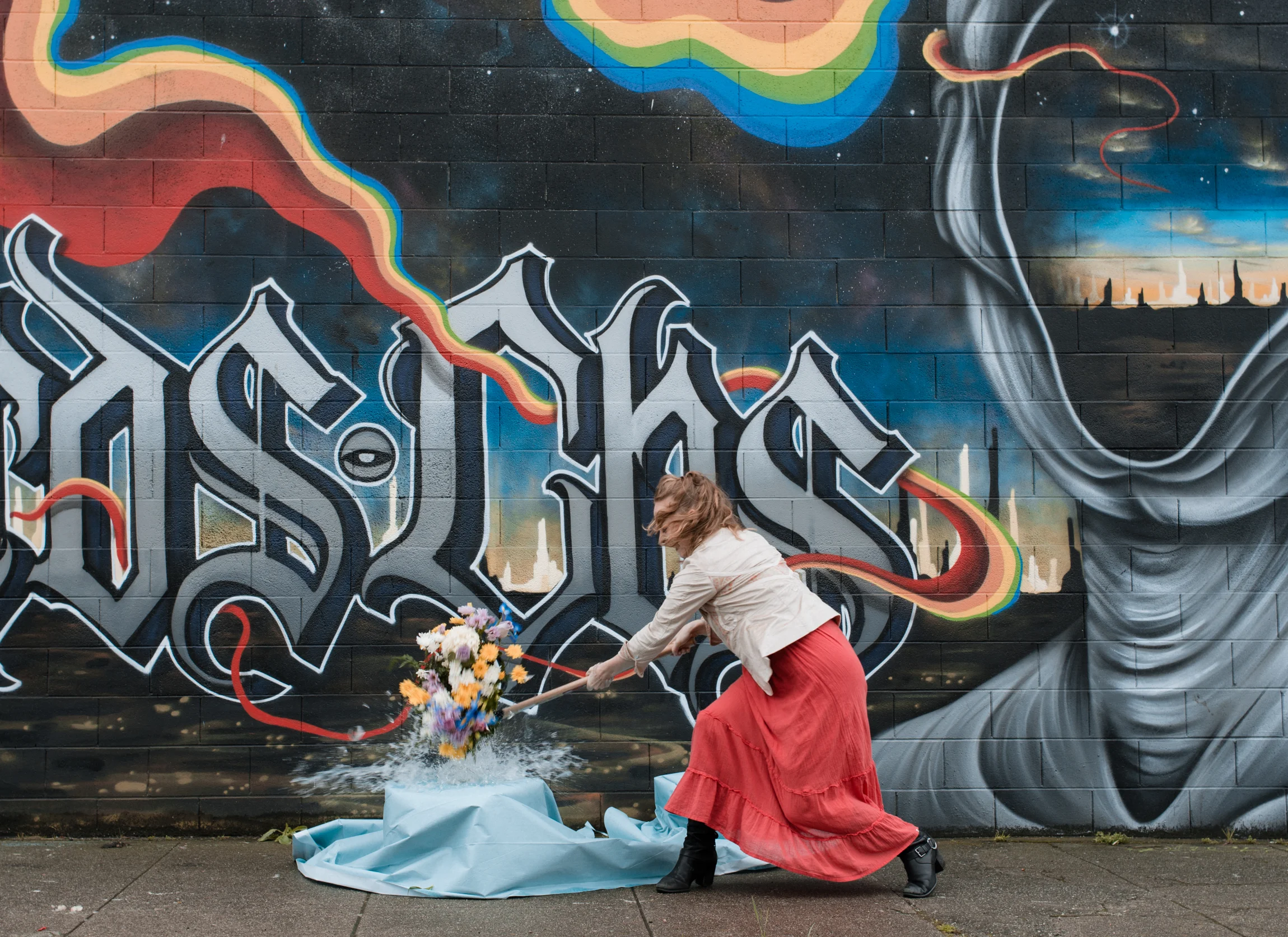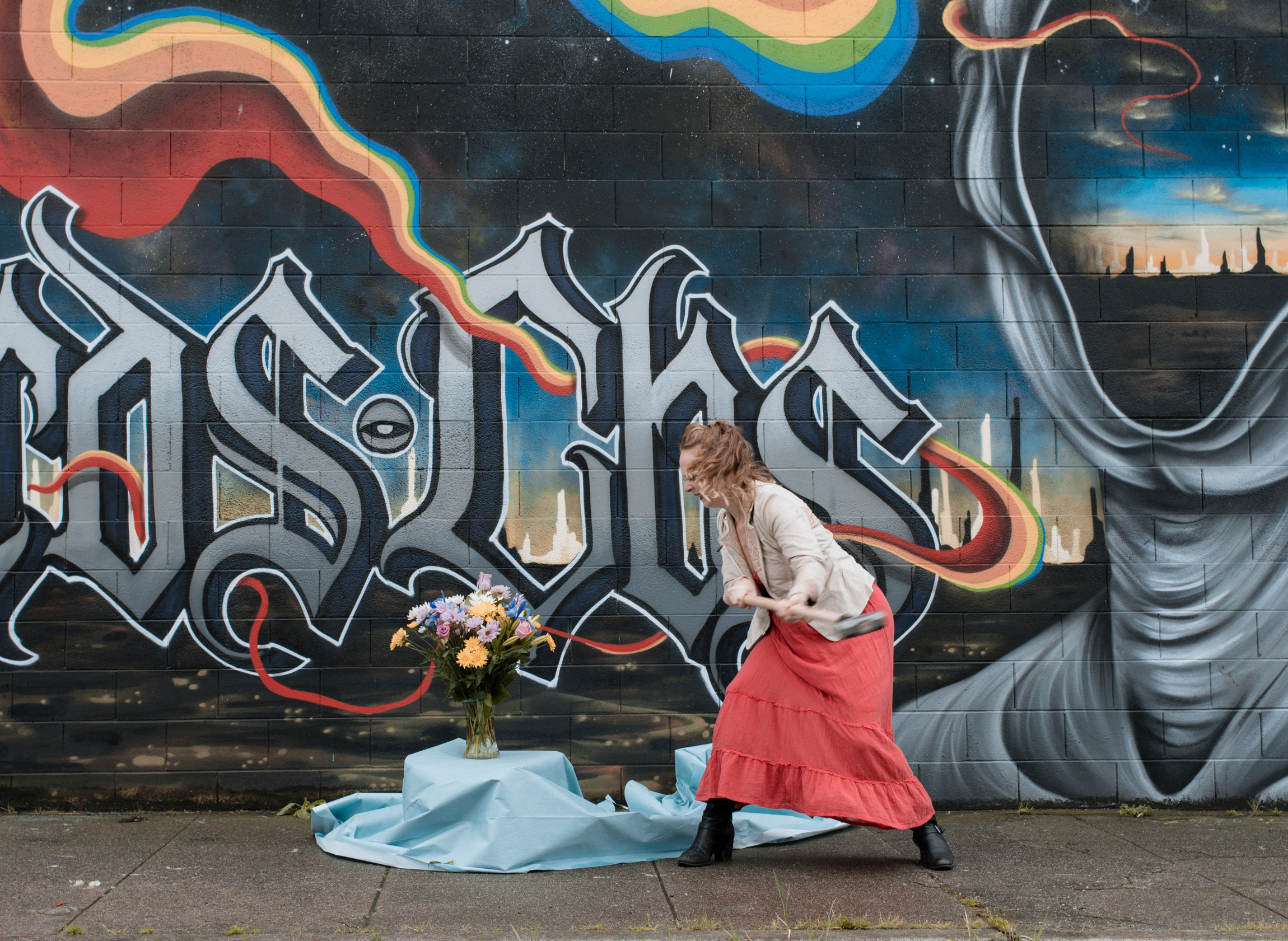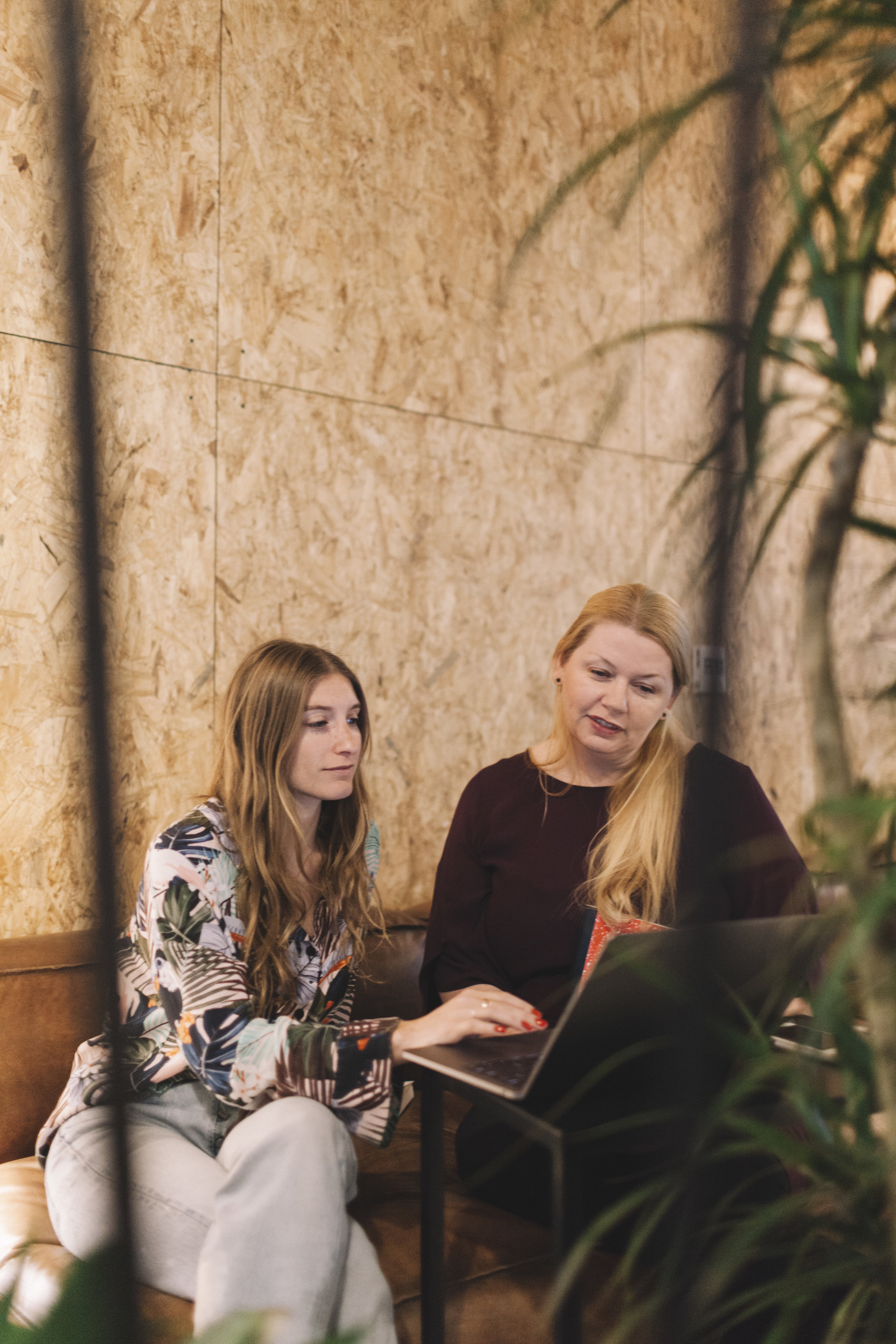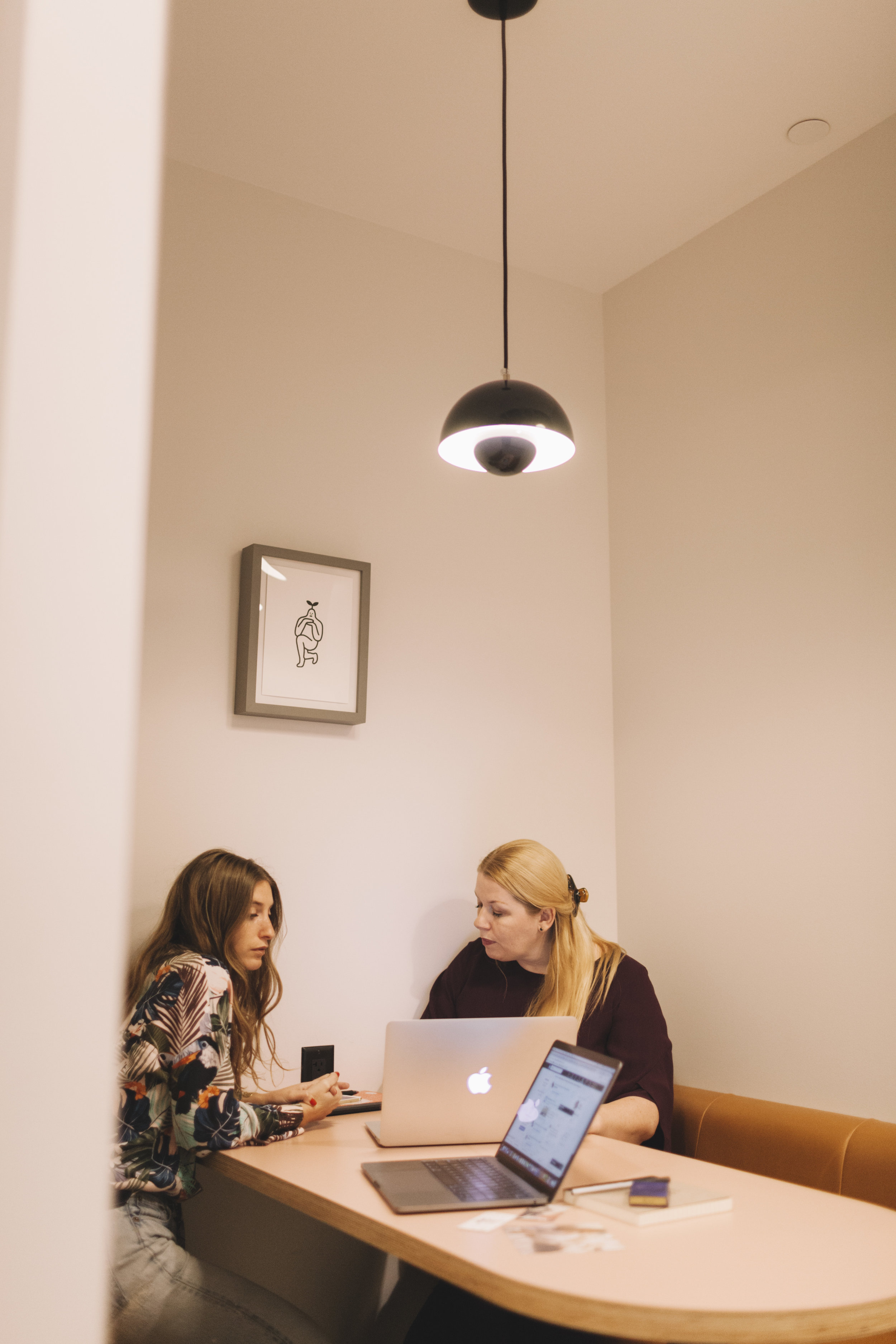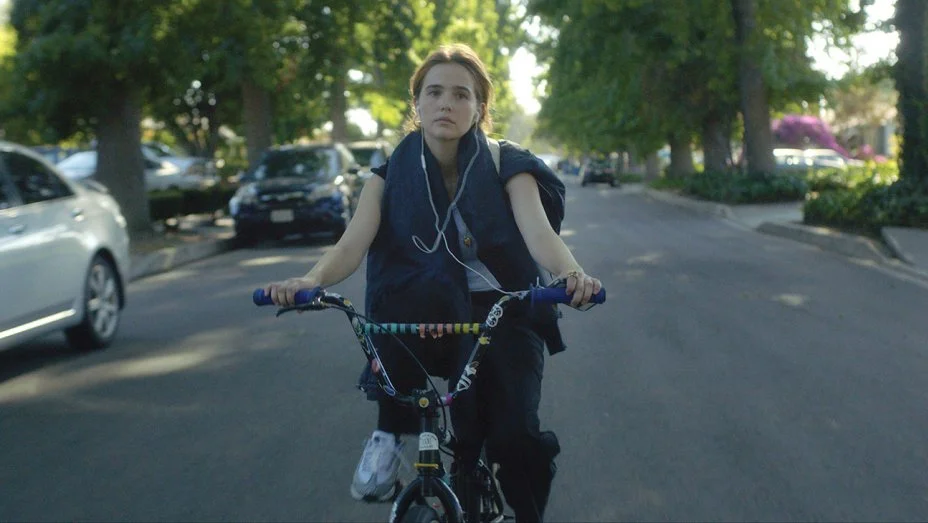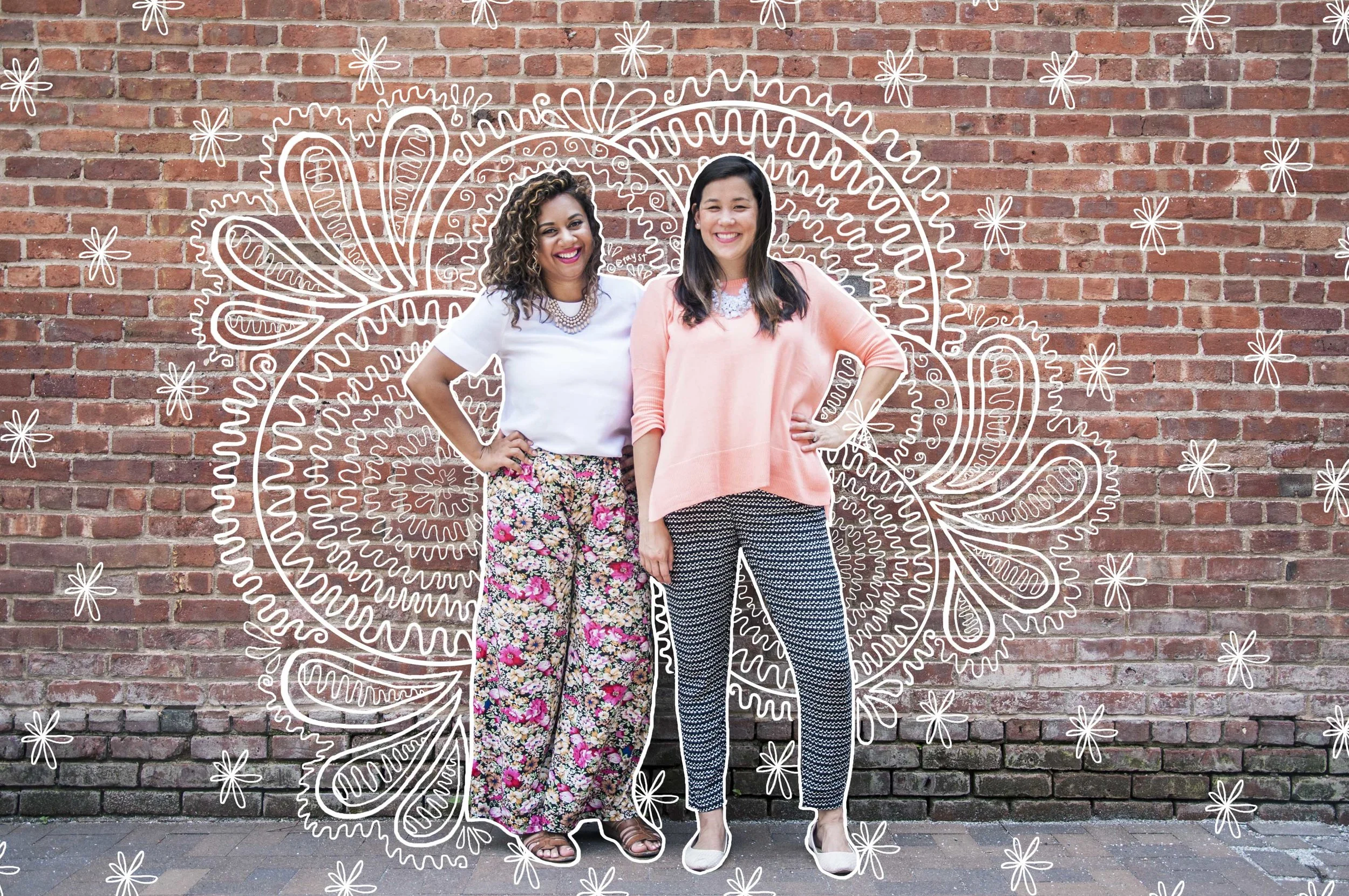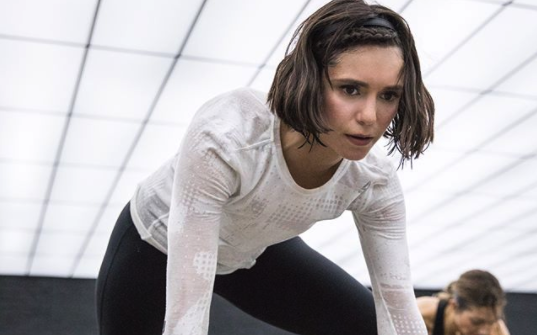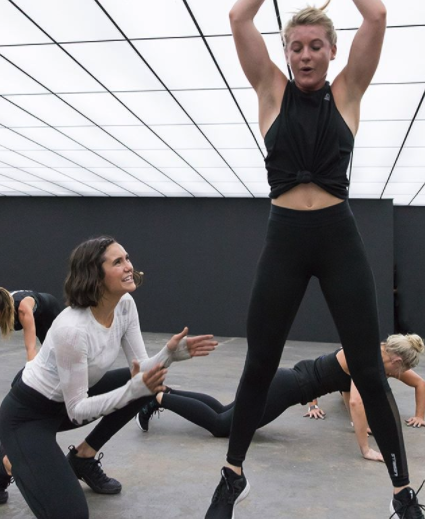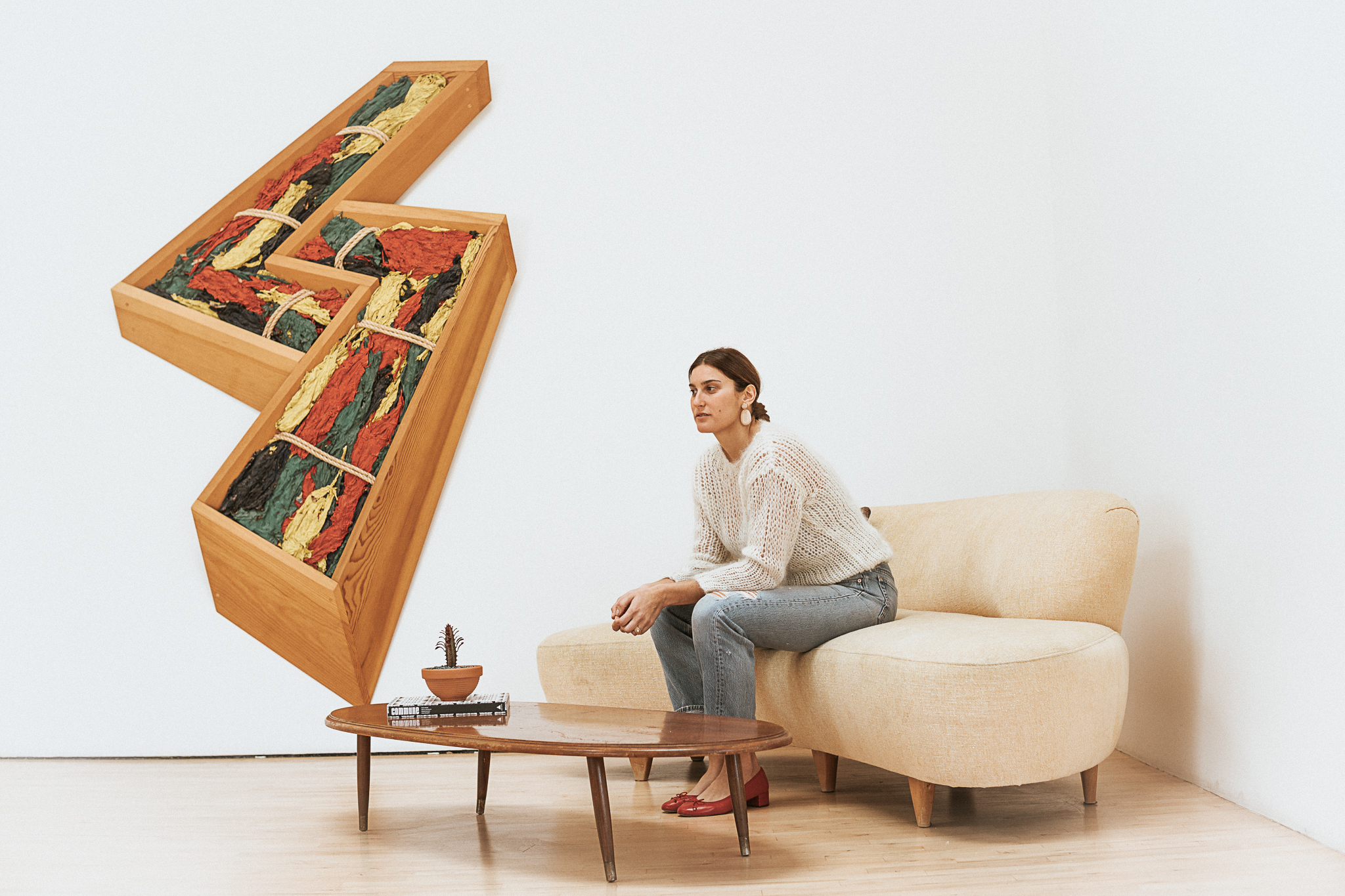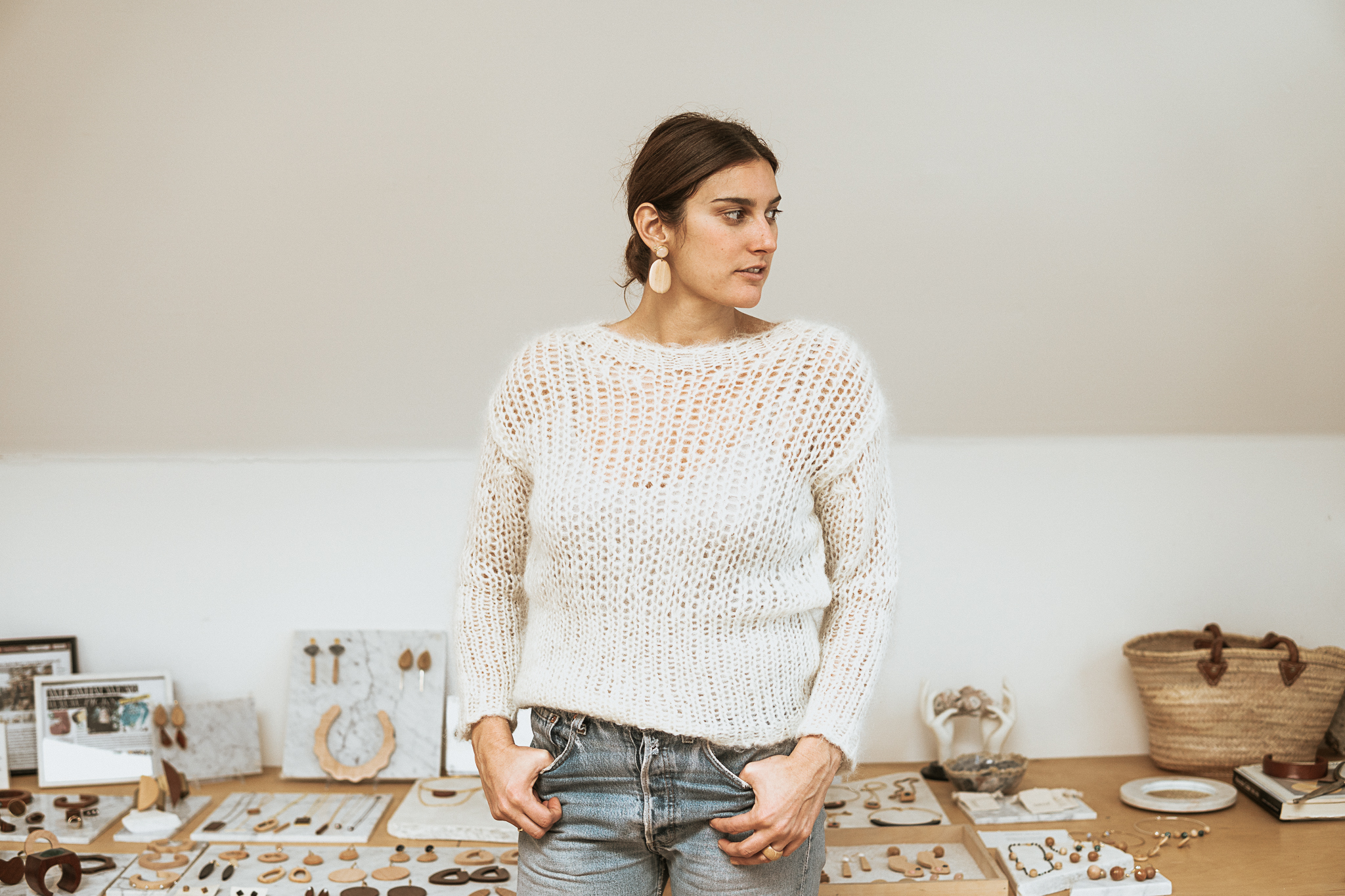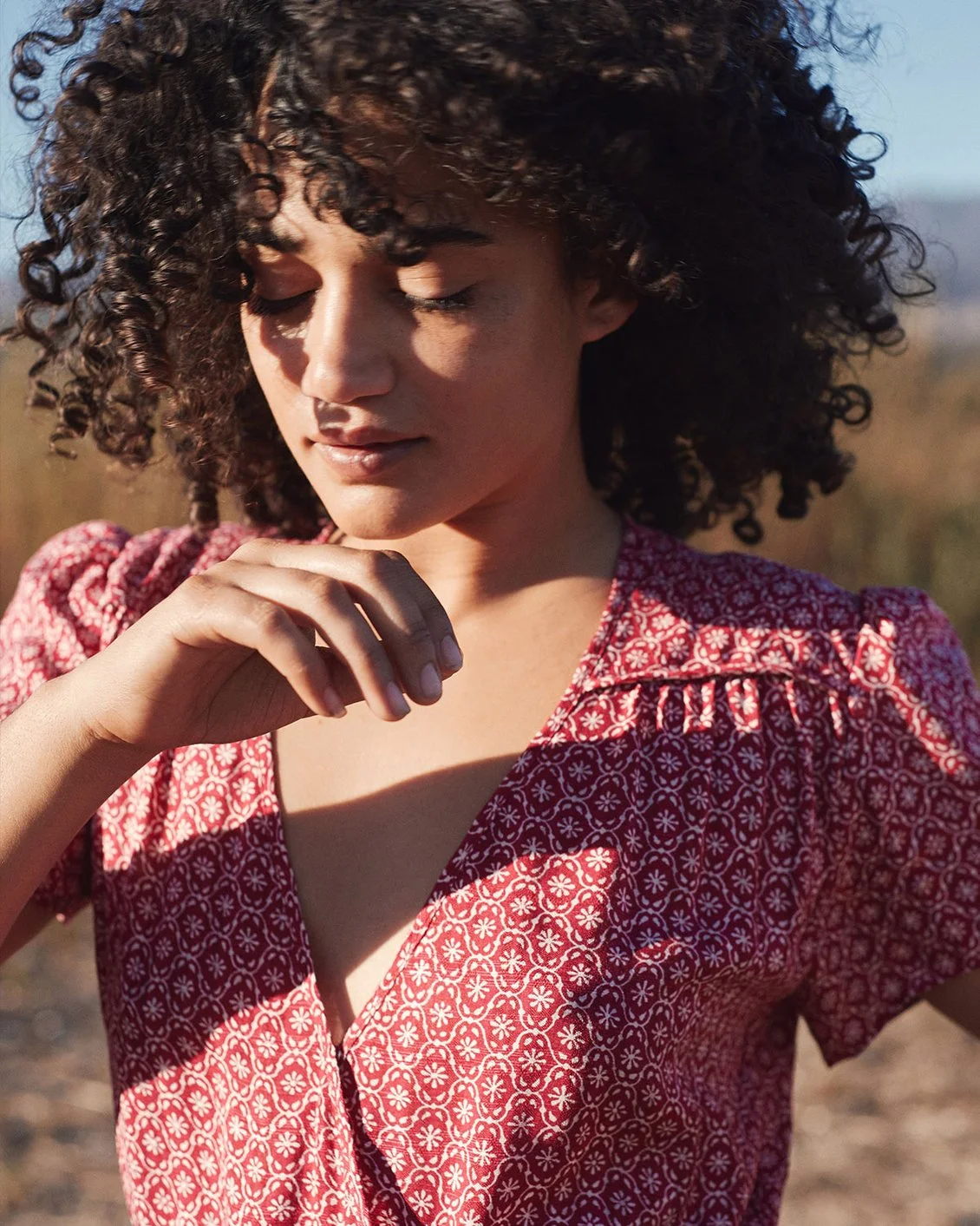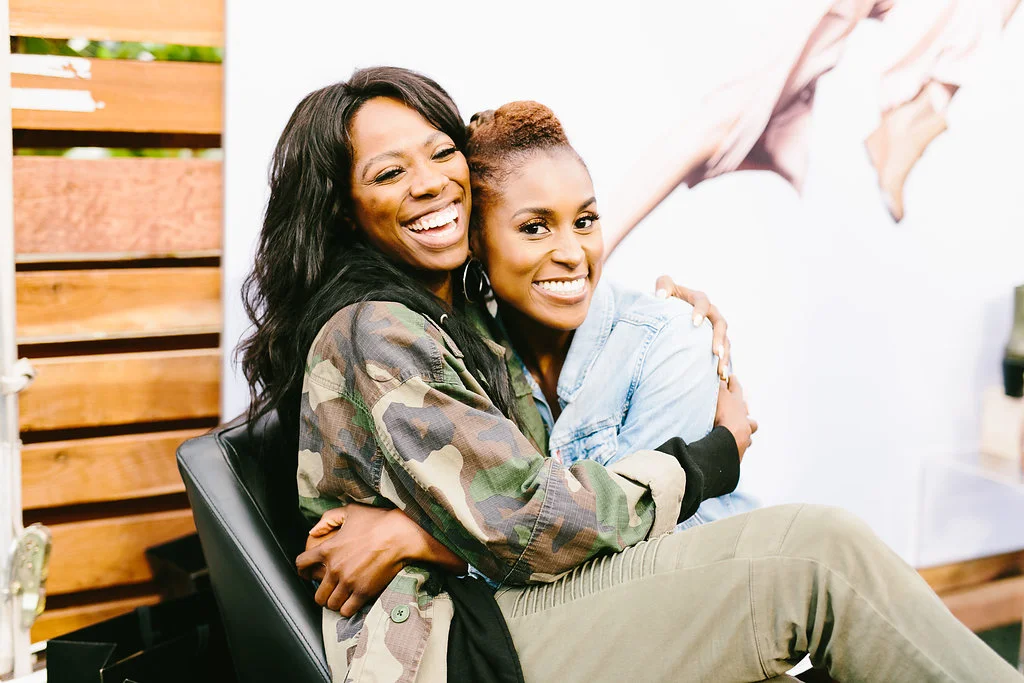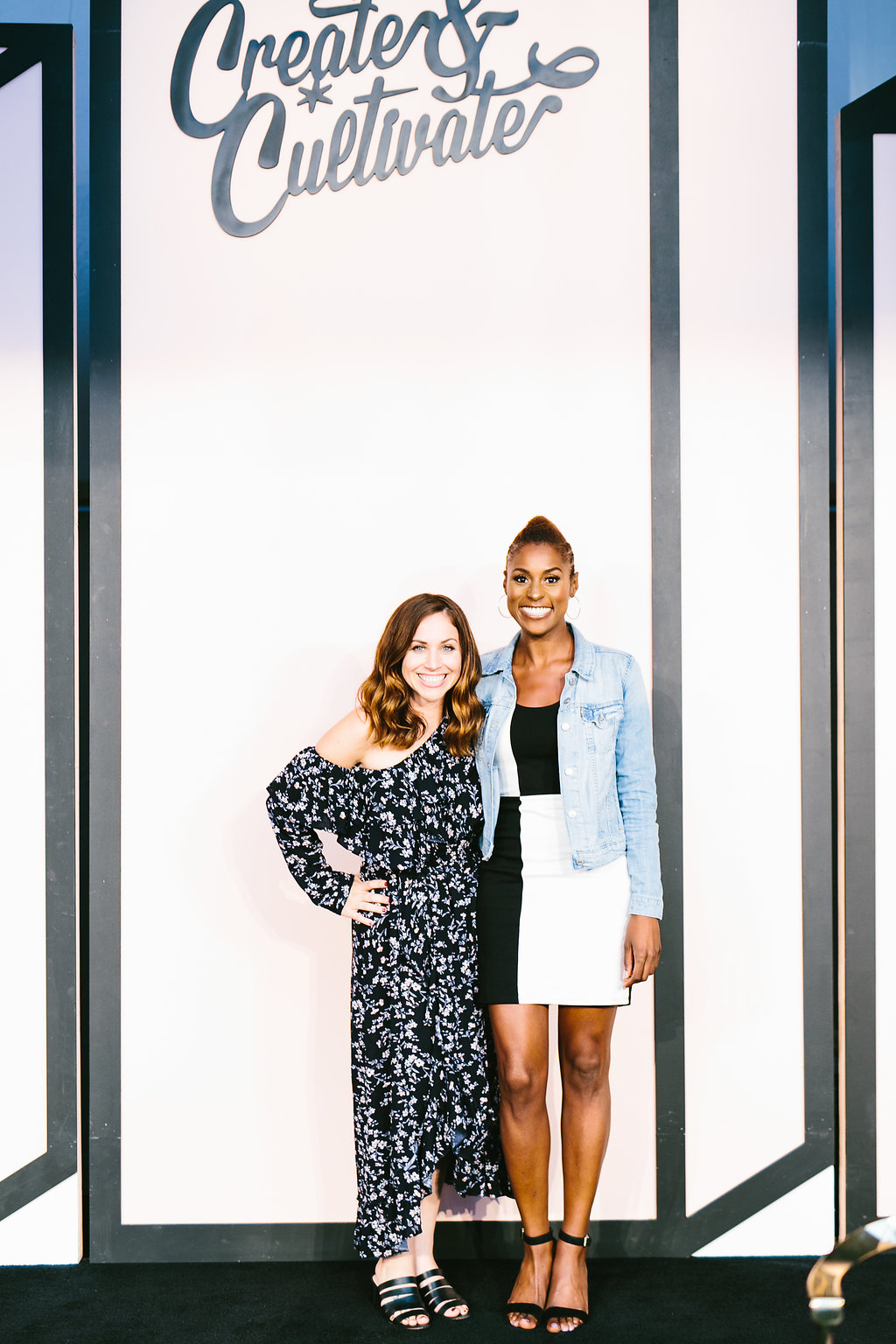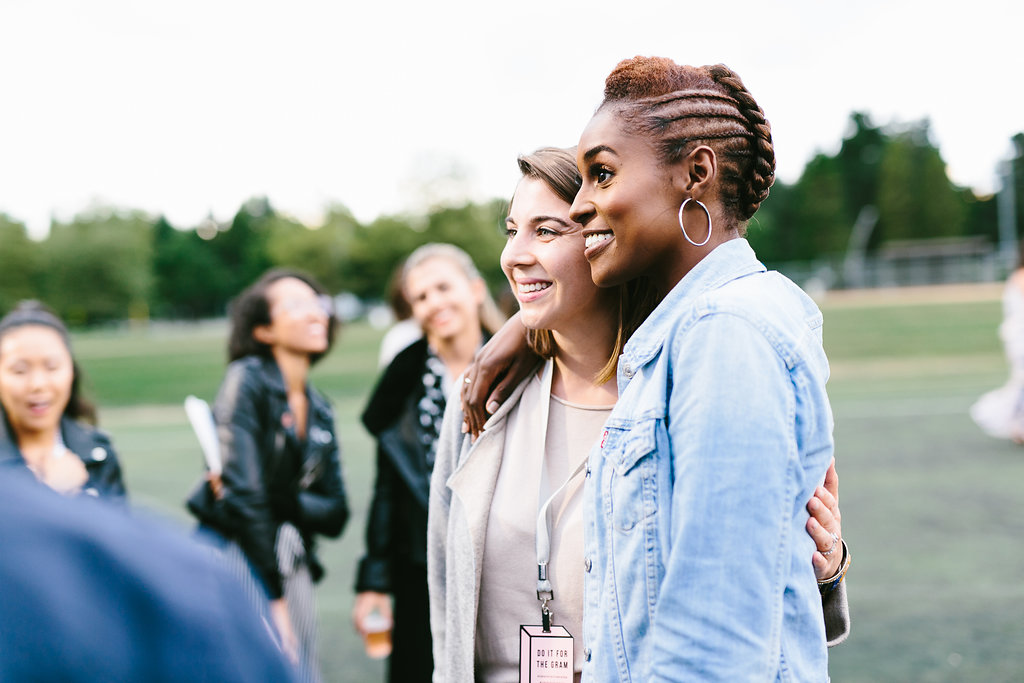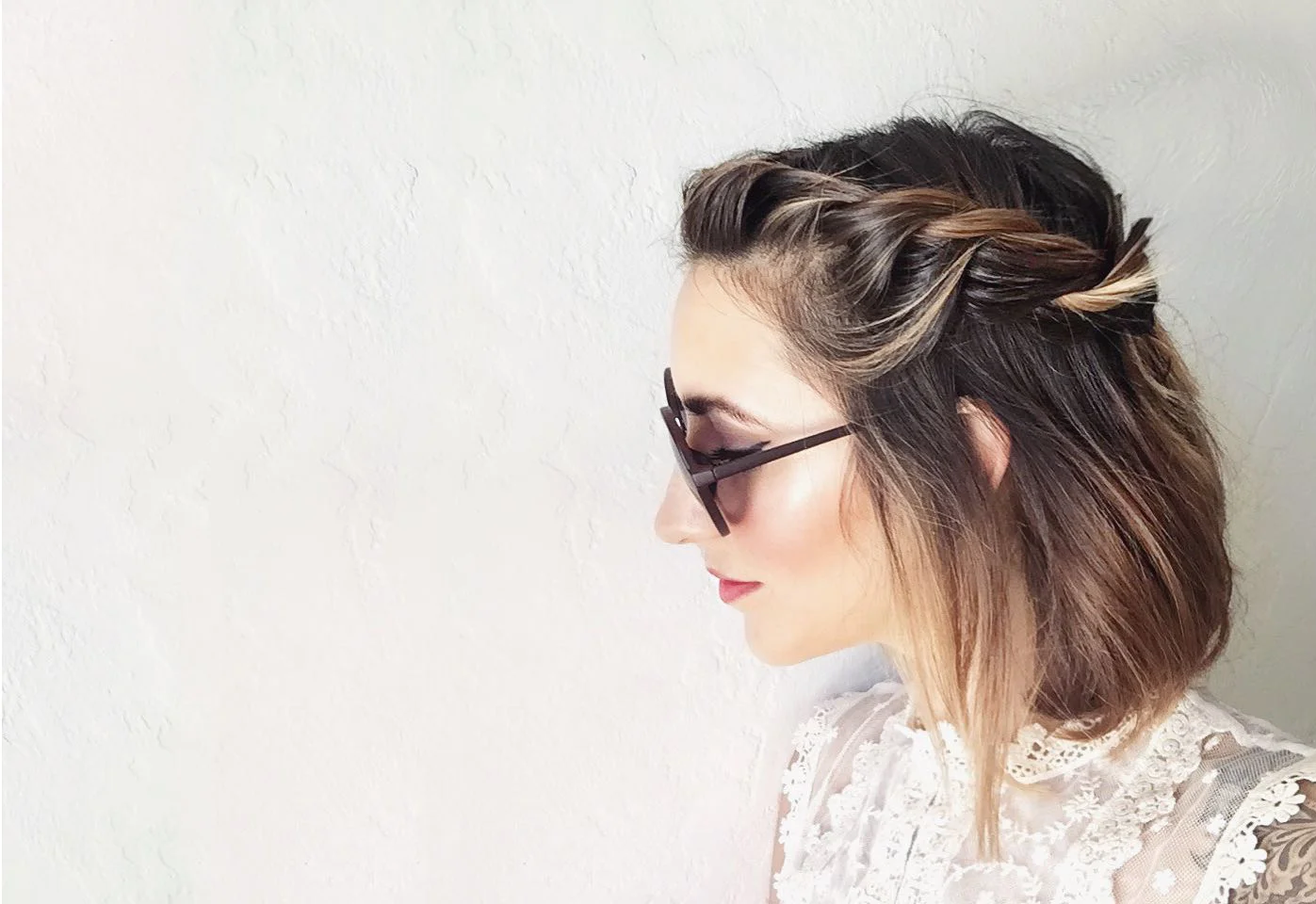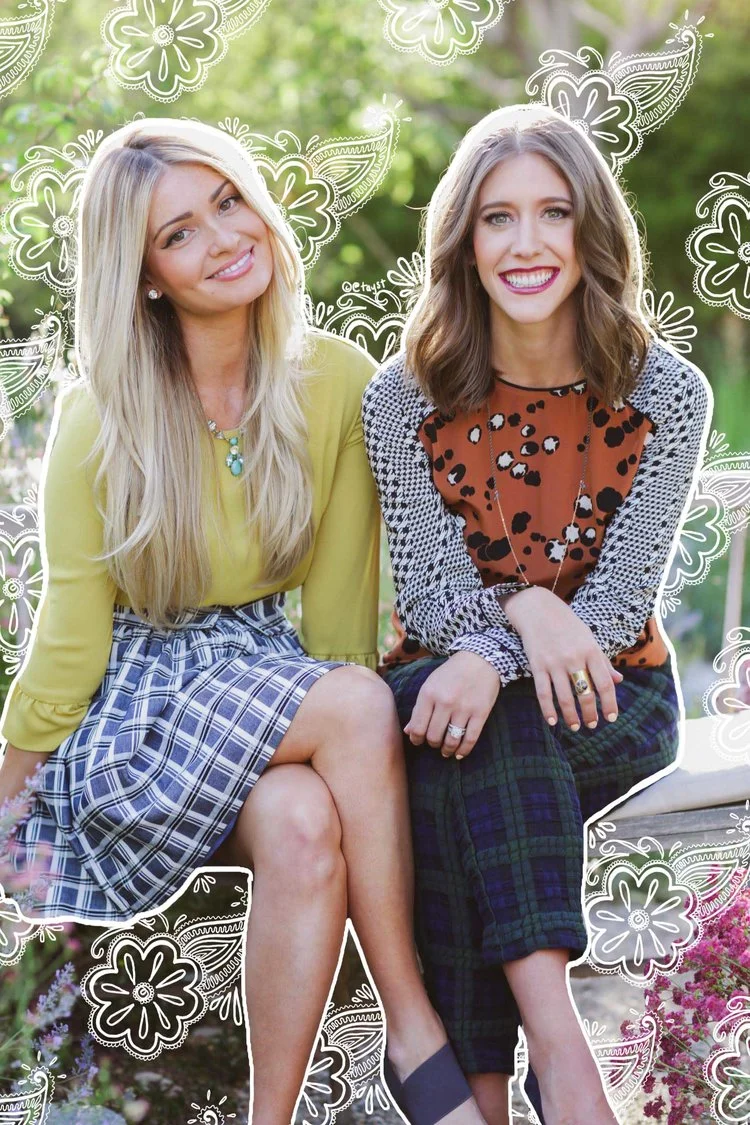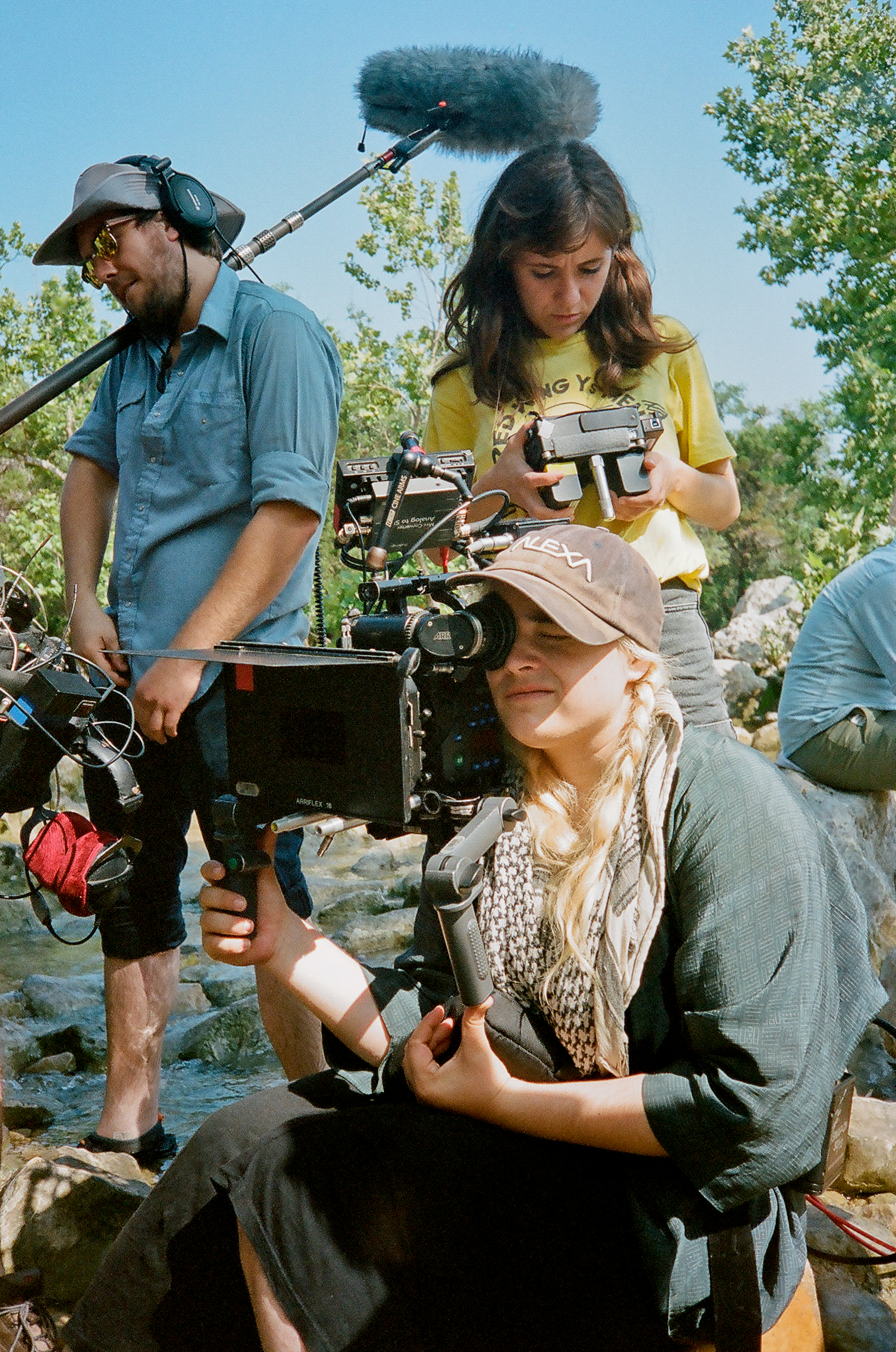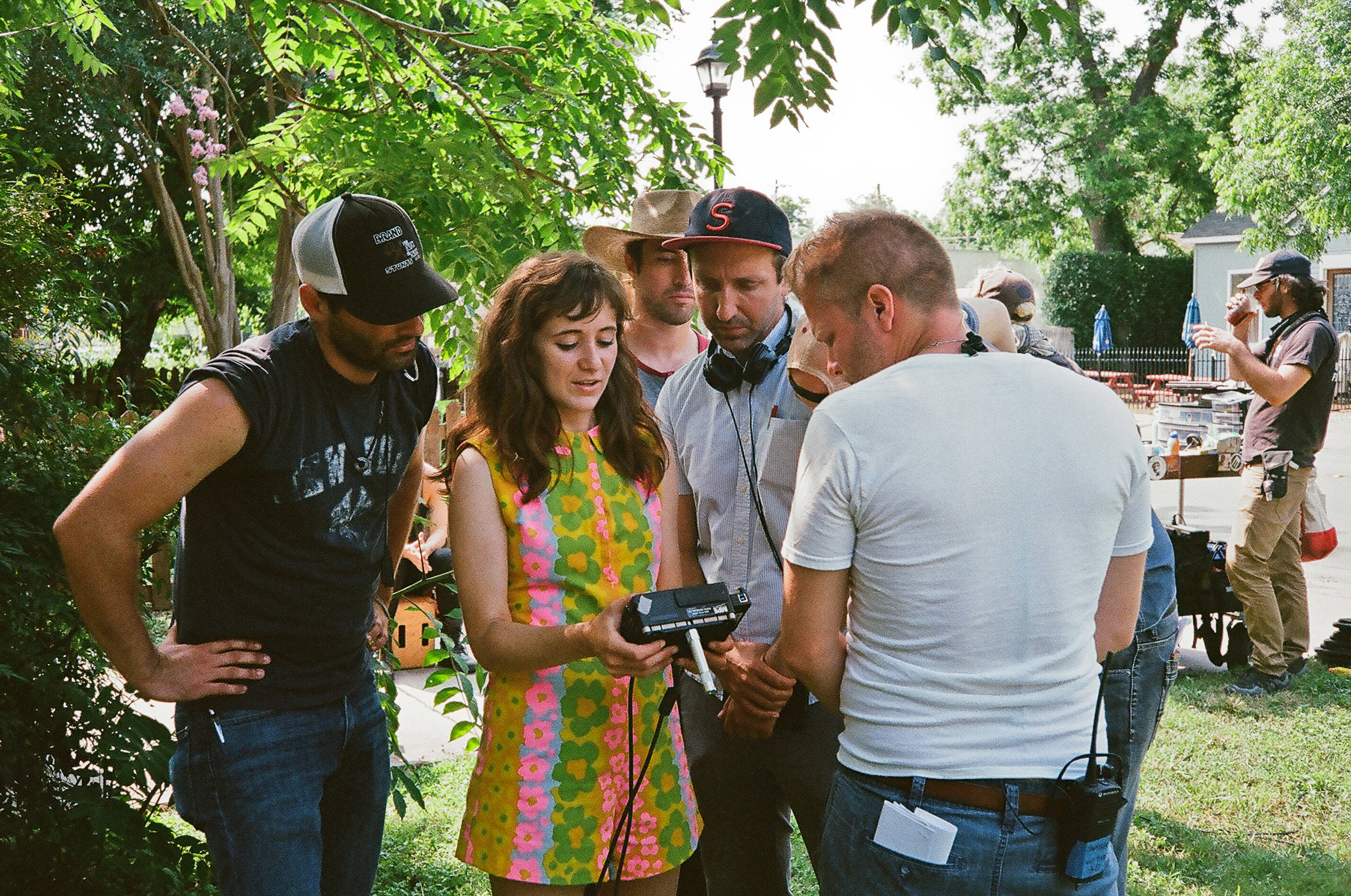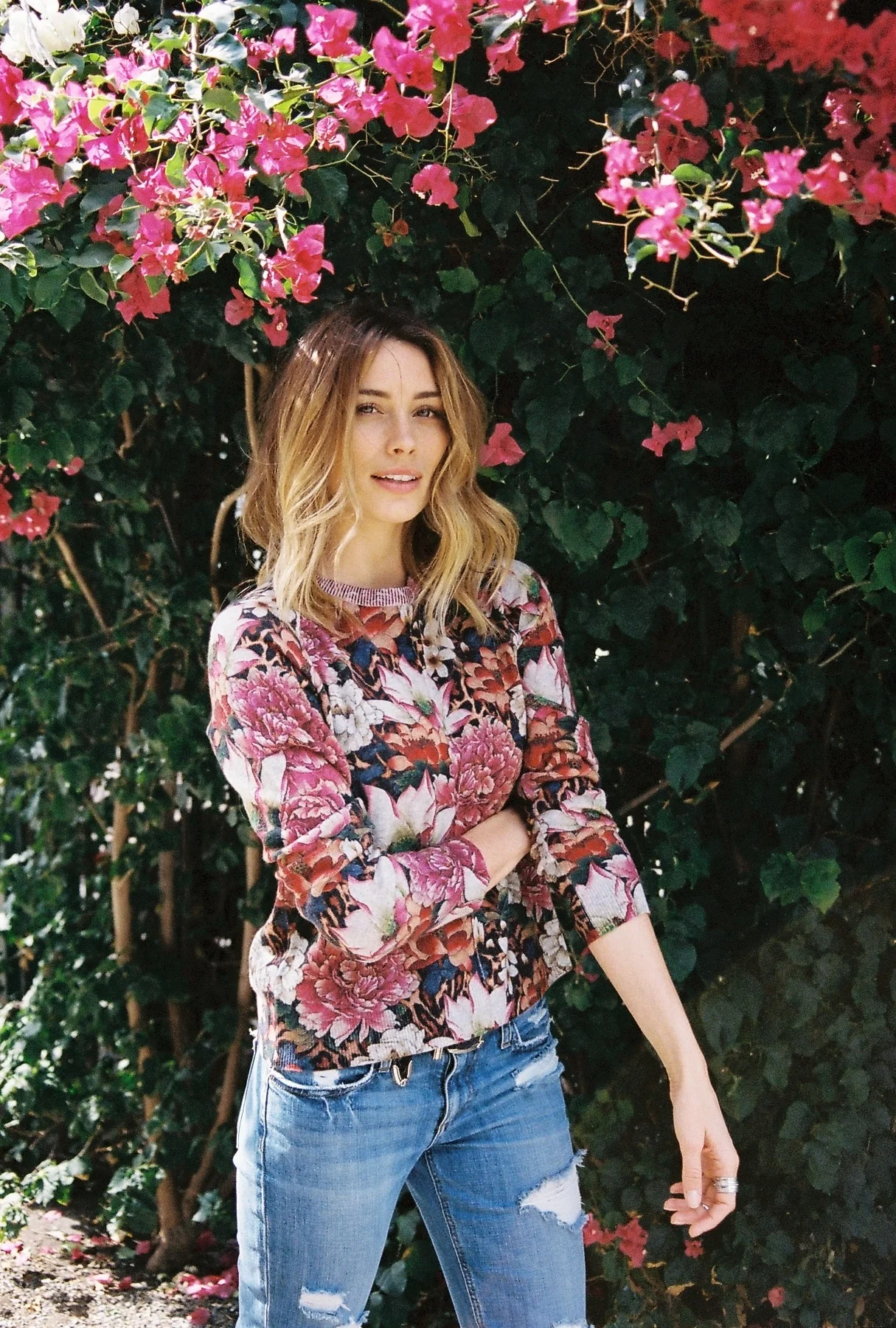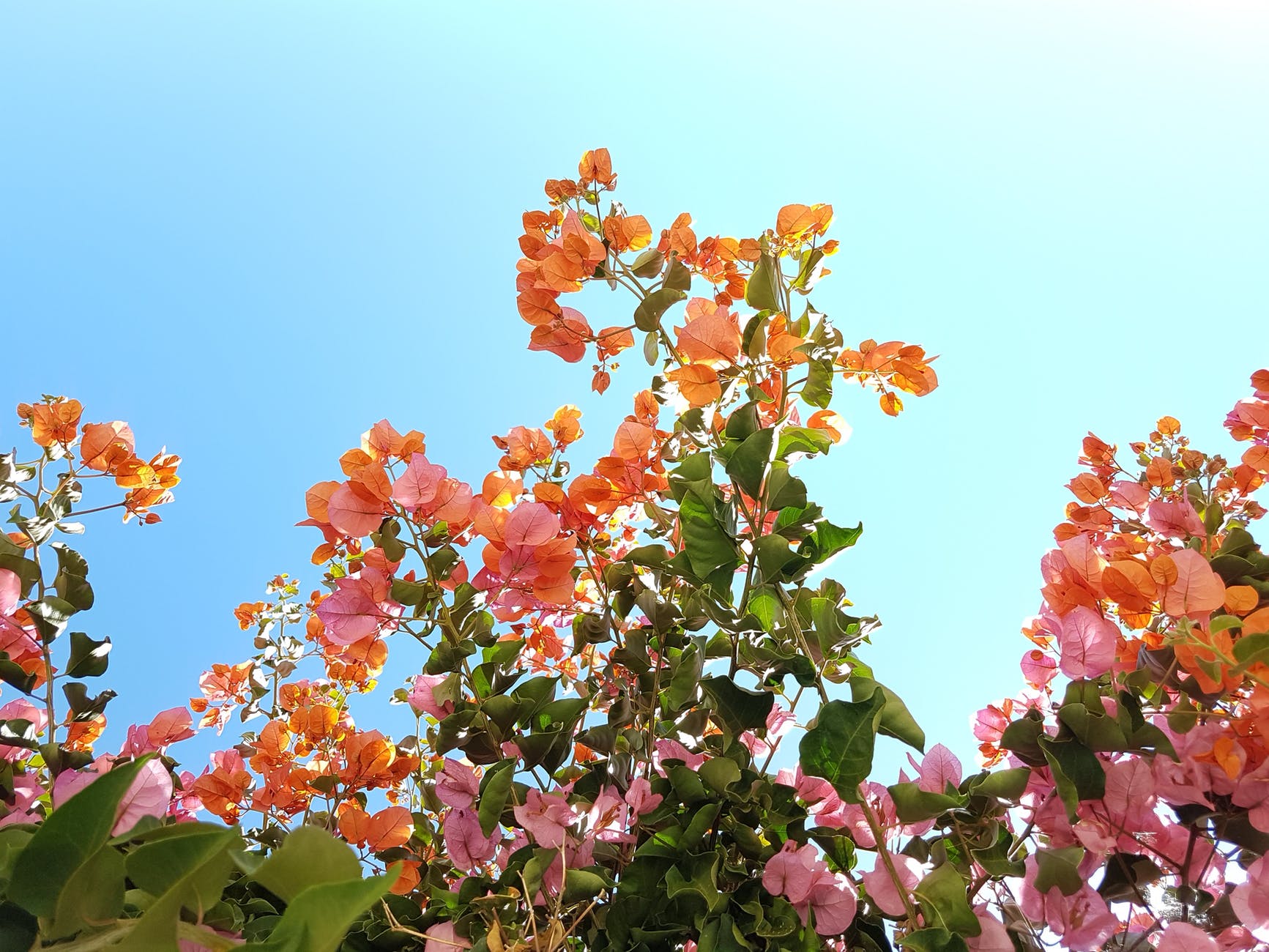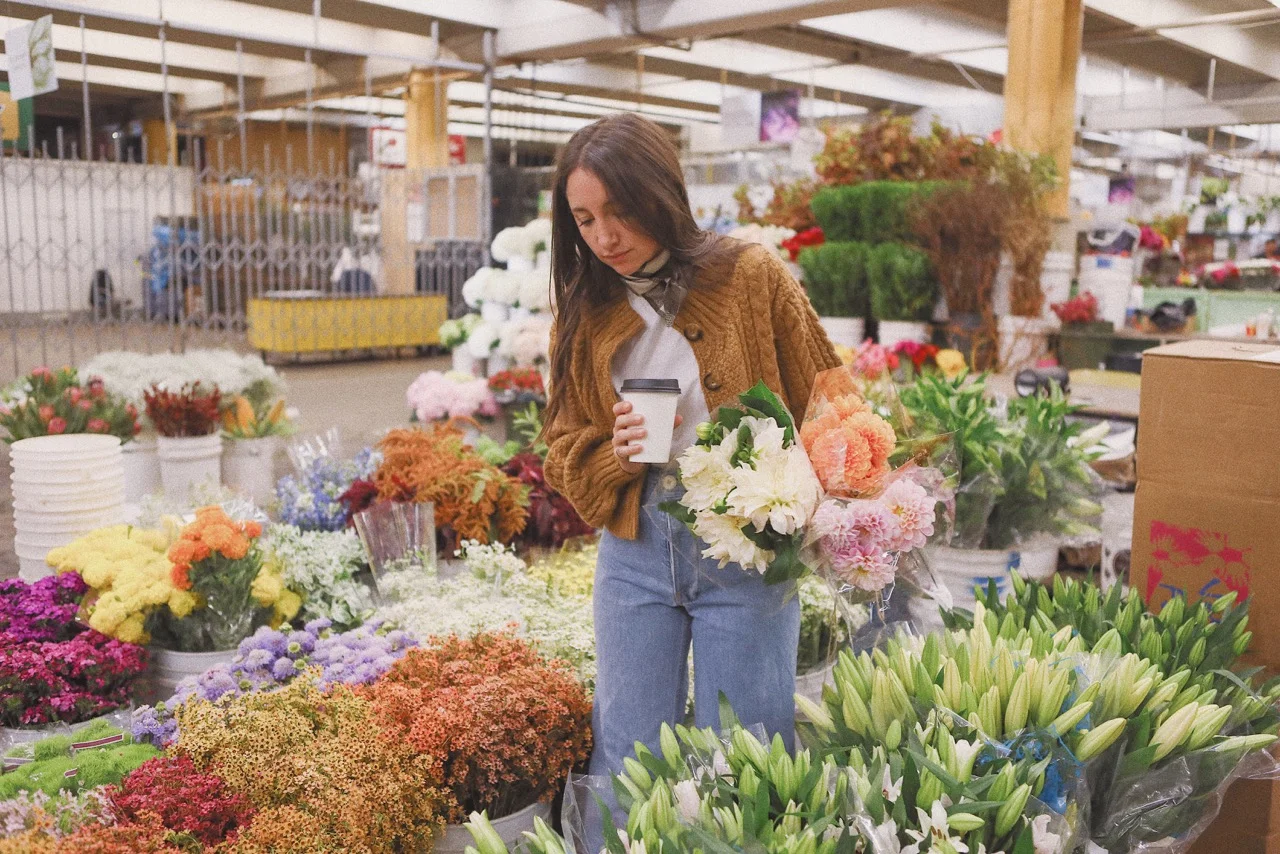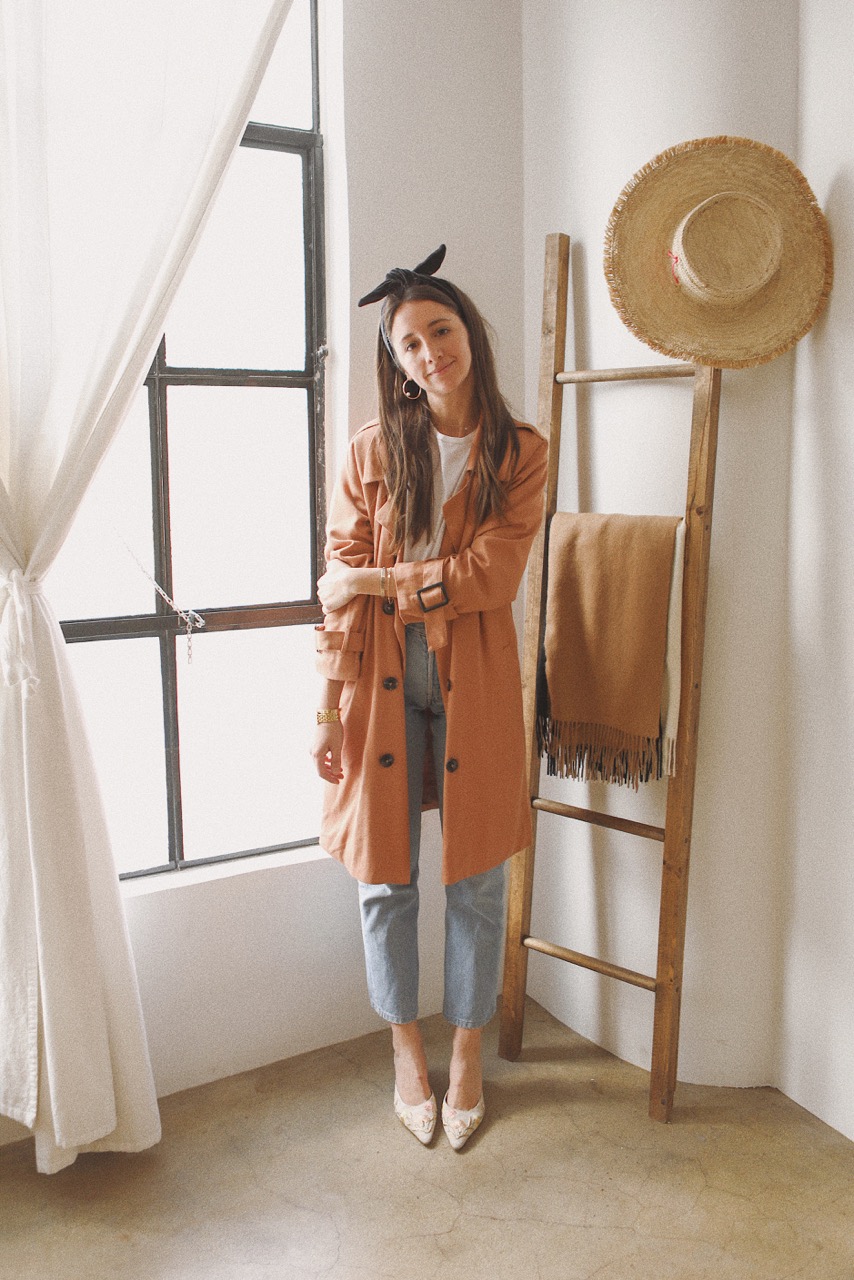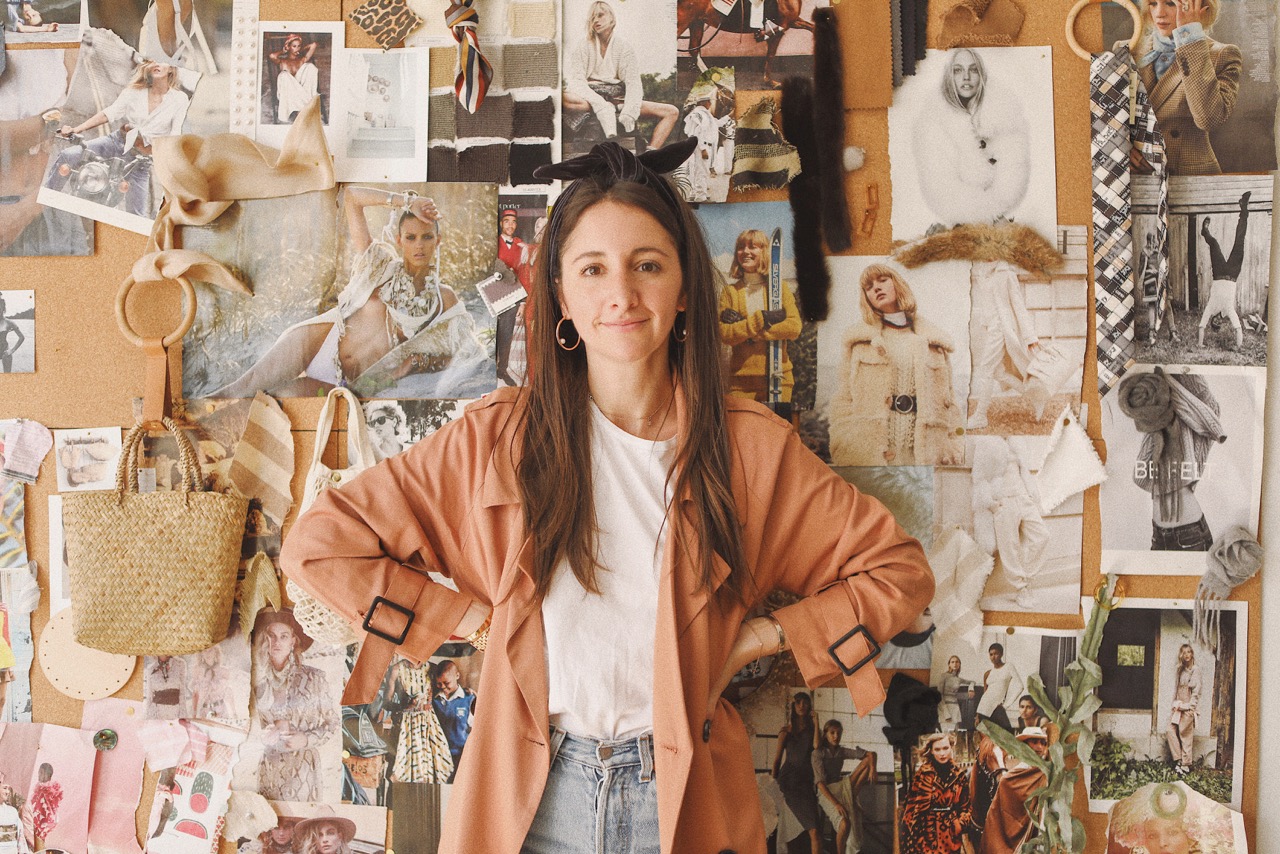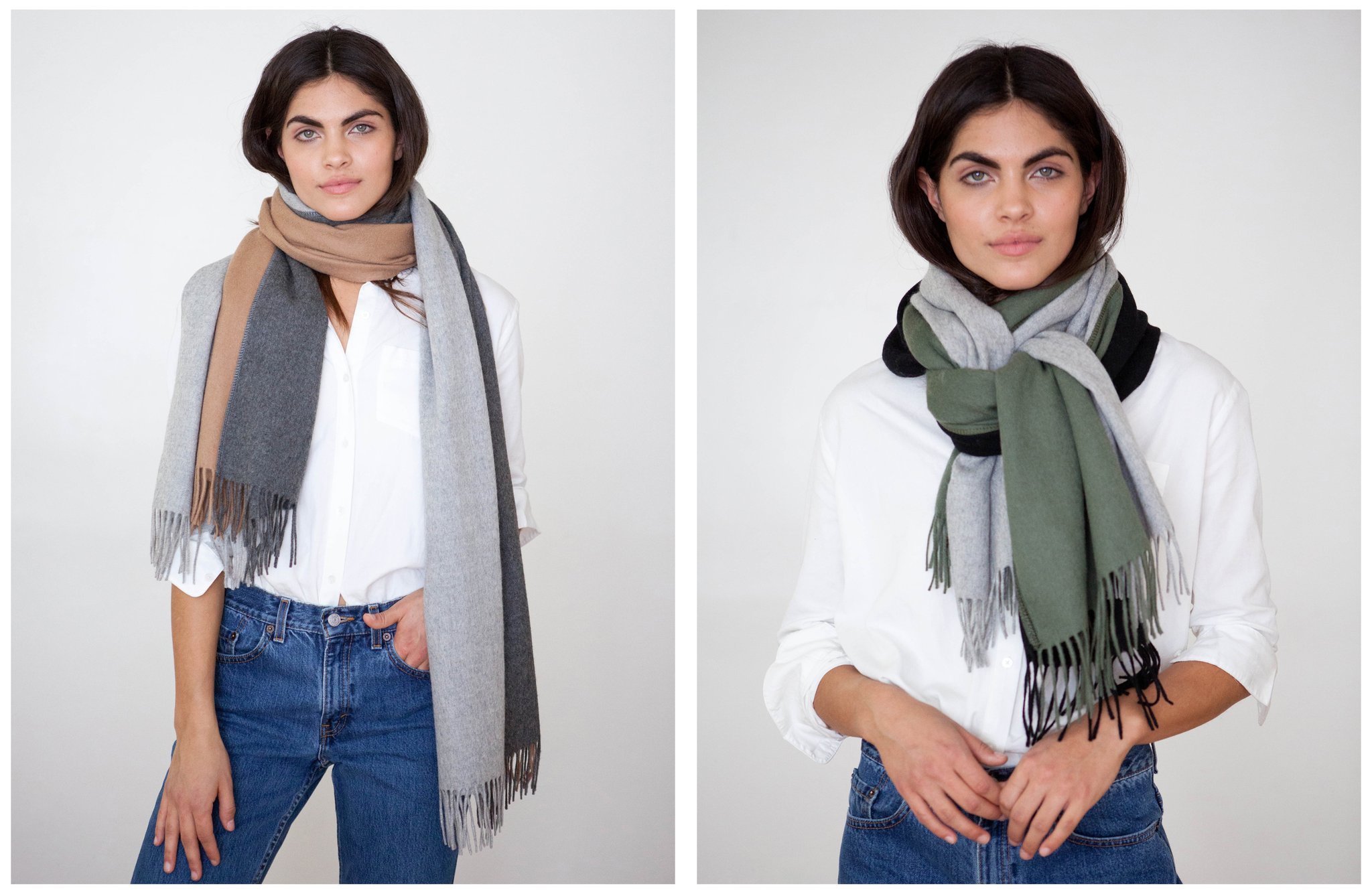Green Queen: Why Women in Weed Have the Power to Change Everything
Puff, puff, pass this article to a friend.
Let’s be blunt.
Jazmin Victoria Hupp co-founded Women Grow, the largest professional network in the cannabis industry. Since its launch in 2014, Women Grow has connected over 25,000 entrepreneurs at events in 45 cities across the US & Canada. The organization hit $1 million in revenue in 2015, with no outside funding.
Its focus is to connect and empower diverse people to launch national cannabis businesses and to serve diverse customers. Hupp herself is a self-described feminist who once told Edibles Mag, “I love the real meaning of feminism and I am angry the word has been f***d with by people who don’t believe that women and men should be equal.”
Again. Blunt.
She told us, “Women are better than anyone at working within a system that wasn’t created for their benefit.” Can’t say we disagree. And it’s why she’s a Green Queen, through and through.
Find out more from the founder below.
There’s a lot of water cooler talk about how legal marijuana could be the first billion-dollar industry not dominated by men. How does Women Grow factor into this? So, Women Grow is dedicated to “creating and cultivating”—women to be leaders of the cannabis industry. Why was it important for you to focus solely on women?
Women will purchase the majority of marijuana products after full legalization and the end of marijuana stigma. Marijuana is known for being a medicinal product, a wellness product, and a recreational product. On the medicinal side, women make the vast majority of medical decisions for their families and purchase 92% of over the counter medicines. On the wellness side, women are the prodimineent buyers of wellness services like yoga and acupuncture. On the recreational side women purchase the majority of wine & liquor that will be consumed at home. Women are desperate for a sugar-free and low calorie alternative to alcohol. As the stigma around marijuana ends, you’ll see women switch from a bottle of wine to a vaporizer at night. So since women will be the dominate purchasers of marijuana, it turns out that other women are best equipped to create the marijuana products and buying experiences that women want. Additionally operating a marijuana business today requires navigating a complex system not created for your success and it turns out women are better than anyone at working within a system that wasn’t created for their benefit.
I focus on women because they are the greatest untapped resource on this earth. They are already installed everywhere but working at half their capacity. When you upgrade the women, you upgrade the lives of everyone around them.
"I focus on women because they are the greatest untapped resource on this earth."
2015 you held your first summit. What was that like? What did you see that was inspiring?
Women Grow’s first summit was for just 125 women in the mountains of Colorado (the event has since grown to over 1,000). The black market of cannabis required business owners to be secretive and isolated from their peers. They had few people to ask questions or get support. We heard some stories from women in emotionally and physically abusive work relationships that had no one to turn to when what they were doing was illegal.
After legalization, women in weed were able to come out of hiding. By placing these women in community they were able to share knowledge and support for the first time. And we were able to take everyone through hours of business education to fundraise for their company. Now I get to attend office openings and anniversary parties of many of the companies founded after that first event. It’s an amazing feeling to see the staff of six women hired by one woman who sat in the front row of the event.
How has your business changed the last three years?
I ran Women Grow as CEO for the first two years and wow did I ever have a hero complex. I hated to see people struggle so I would give people the answers instead of mentoring them through the learning curve. So Women Grow expanded quickly to 66 cities and 3 countries but that growth wasn’t sustainable. I had built an large system that was dependent on me instead of creating independent leaders. This is one of the core reasons that we contracted when I left my role as CEO. I’m excited to see how Women Grow will blossom under Dr. Chandra Marcias, Gia Moron, and Kristina Garcia.
I also didn’t anticipate that many women had more experience fighting against each other than helping each other succeed. In my experience, women have a culture of destructive gossip that cycles negativity between each other. Instead of bringing feedback to the person who we’d like to challenge, we bitch to our friends about it.
Why do you think it’s important to decriminalize weed?
Cannabis (aka weed, pot, marijuana) is one of the safest and most effective plants we were gifted on earth. Our body naturally produces cannabinoids (the elements within cannabis) to regulate our body. When your body’s regulation is off, cannabis can supplement.
Cannabis is also one of the most flexible medicines, specializing in many of the symptoms women suffer from most. I use cannabis to fall asleep at night, to reduce inflammation in my body after yoga, and to balance my stomach when I eat the Standard American Diet.
Women Grow had no outside funding. What did you know about launching a business?
I caught the entrepreneurial bug as a kid and started launching websites at age 11. I started running theatre productions shortly after that and theatre teaches you a lot about running a business. You’ve got to pick your strategy (the play), hire your team (casting), get everyone to work together (rehearsals), sell tickets (marketing & sales), and deliver your product (opening night). Most companies never get to delivering their product so theatre was a great container to practice that cycle with lower stakes.
While I was in college for theatre, my computer broke and so I took a job at Apple for the employee discount. At age 20, I transferred to an independent Apple store called Tekserve in New York City and got a deep dive on every shade of a sales, repair, and consulting business. As an internal entrepreneur at Tekserve I got to create new offerings within the container of an already operating business. I got great at the creation, marketing, and launch of new things but was never responsible for operating what I created for more than a year. During that time I was also a director at Women 2.0, helping women become VC-backed founders with events in dozens of cities. Through Women 2.0 I was immersed in equity funding and Lean Startup methods.
"When your body’s regulation is off, cannabis can supplement."
In the Spring of 2014, my grandmother died and I took a few days off to reexamined my life purpose and what I was contributing to the world. Cannabis had just been fully legalized in Colorado and Washington so I decided to visit Denver for the first legal 4/20 celebration. I went to a huge event with a hundred different cannabis businesses and only met one female business owner. I realized that in this new blue ocean, women could have an unfair advantage in what would become a care-based industry. With that in mind, I met Jane West, who had already started to organize female business owners in Denver and we launched Women Grow in August of 2014.
For new entrepreneurs, what is your advice for starting?
We launched Women Grow with about $26,000 in founding memberships. Instead of going to investors for our startup capital, we went directly to our customers, female entrepreneurs, and built the business to about a $1M in revenue. The challenge with going to investors early is you have to immediately start serving two masters, what your customers want and what your investors want. By building the initial business on just customer revenue, you are more likely to create a business aligned with what your customers want before confusing it with investor advisors. You’ll also be able to get much better terms for those investments when you have a proven model versus them funding an idea on paper.
Starting your company based solely on revenue ensures that you scale your expenses with your revenue. If you use your outside funding for operating costs, you often end up in a situation with a high burn rate (money spent exceeding your revenues) and a ticking clock that forces you to raise even more money before you’ve proven your product works. Instead prove you can deliver something your customers want at a low cost and then raise funds to market the fuck out of it. Most companies raise money before getting that product fit correct and burn through it.
So many women are struggling at work. They’re burning out. You create happiness through a practice of yoga, meditation, cannabis consumption, and self-love. Can you chat about how these practices have improved your quality of life?
First I had to realize that my inner reality was creating my outer reality. By that I mean if I felt scarce, I would experience scarcity in my business. If I felt in flow, I would experience flow in my business. I stopped taking a salary from my company for the last two years to focus on self-work to work on myself and clear out the inner debris.
We all know that working out your physical body improves how your body functions. What I found is that I also had an emotional (a.k.a. energetic body) that needed just as much care. I tried dozens of practices and my current favorites are: meditation, Kundalini Yoga, Emotional Freedom Technique, ecstatic dance, sanskrit chant, and cannabis-infused baths.
This summer I’m launching a new company based on this self-work, called Rage Palace. Rage Palace is an event for women to release anger and workout their emotional bodies. We’re bringing together dozens of local practitioners to lead women through activities from sledgehammering a car to dance to crying on a grandmother’s shoulder. We’ll launch in San Francisco this summer and then tour the event as we perfect the formula.
What’s an exciting product you’ve seen hit the market?
I’m loving Treatwell’s Wellness & Balance tinctures. These are non-psychoactive, meaning they don’t get you “high” but give you all the benefits of cannabis for your body. It’s like taking the vitamin you didn’t know your body was missing.
You were named a genius entrepreneur. What’s it like to be called a Green Queen?
Honestly I don’t get called a Green Queen by anyone but reporters, they love puns. [editor's note: it's true, weed do.]
What’s your proudest accomplishment to date?
Losing 60 pounds by changing everything in my life that made me want to overeat instead of following some silly diet. I realized that food was my go-to comfort substance. It kept me awake and made me feel better in the short term. In the long term it was masking how I was abusing my body to make money. We hired a new CEO for Women Grow and I spent a year pulling apart all my bad habits. Losing weight wasn’t even a goal, it just naturally came off as I stopped compromising myself.
What do you hope to see from women in weed?
Everything. Women in weed have the power to change our workplace cultures, our medical outcomes, our wellness practices, and even how we party on Friday night. I’m excited to see how replacing alcohol with more thoughtful substances might lead to a decrease in sexual assault. I’m excited to see how commercial hemp can replace fossil fuels in every instance where we’re using non-renewables. I’m excited to see how living in alignment with nature could be.
What would you consider your superpower?
I can tell what you need before you even know you need it. Basically, I can read people and anticipate their needs. It’s what makes coming up with new businesses so much fun because I can make stuff that you hadn’t thought of, but once you see it you know you need it.
Want more from the cannabis culture? Check back on our Green Queens series in partnership with MISSBISH. We'll be featuring a woman in weed per week!
Want even more? Register to participate in the Slack Session co-hosted with MISSBISH. Green Queens in the Cannabis Industry is going down April 25th at 6:30 PST, mark your calendars and sign up here.
MORE FROM OUR BLOG
Green Queens: Flower Shop Is Creating New Lewks For Cannabis Brands
Green dreams roll thru.
Suzanne Shpall, the Creative Director over at Flower Shop taught us a new word: potpreneur.
It’s exactly what it sounds like, someone who is paving the way in the marijuana industry. Which, is exactly what Shpall and Lorna Donohoe, Flower Shop’s Head of Marketing are doing. Shpall works on designing new looks for cannabis brands, where Donohoe focusing on mainstreaming said brands. The company itself is a branding, marketing and PR agency comprised of entertainment, advertising, social media and cannabis experts. One of their clients is Mr. 4/20 himself: Snoop Dogg.
Donohoe is the former SVP of Global Marketing for Playboy, so controversial topics don’t fall far from her apple tree, but the duo are putting forth amazing creative work for their clients. In many respects, it’s a dream job. A fluffy white cloud of weed smoke where they imagine and execute branding for many of the cannabis brands making their way to market. “Our clients have the dopest product out there,” Shpall says, with, possible pun intended. “With my expertise in compliant packaging and sourcing, FS is able to work with clients to develop innovative packaging options so each of our brands can have product on-shelf that is totally unique to them, and completely compliant.”
Color us green with envy about the job these two Green Queens are doing.
Read on to find out more and why Donohoe calls being named a Green Queen a double-honor.
How did you get involved with Flower Shop?
Suzanne Shpall: About 2 years ago I launched my own edibles brand, called Highland Pantry, and was looking for help with PR / Marketing when I was introduced to Flower Shop. Once I met the team there, I knew I wanted to be involved. Having run my own cannabis brand, I have gleaned a unique understanding of what it takes to build a business in cannabis. Before joining the wacky world of weed, I worked in fashion as a designer, product developer and buyer for a handful of high-end Los Angeles based brands, then moved on to the food industry where I successfully ran my own gourmet, gluten-free cookie business.
Lorna Donohoe: I was running my own consultancy, dipping my toe in the water on a few cannabis projects. I felt like this industry was on the precipice of exploding and this cultural and defining moment only comes along every few decades. I also really believe in the power of this plant from a medicinal and health and wellness perspective, so I basically decided to sell my wine bar and wind down my agency and focus only on cannabis. There weren’t a lot of agencies dedicated to cannabis branding and marketing and it is something the industry really needs. I thought Flower Shop was one of the few that was doing sophisticated work and had a seasoned team so I basically stalked them until they hired me.
What in your background prepared you to work in this industry?
SS: All of my experiences and past careers, from working as a designer to product development and running my own business, have helped me get to this point. On top of all the skills I have from past work, I’ve gleaned the ability to be insanely organized (Im a bit anal when it comes to workflow) and agile when the project takes unexpected turns.
LD: I was the former SVP of Global Marketing for Playboy (who have gaming interests-- casinos and online-- as well as a huge array of consumer products in the market). I also worked with a lot of liquor and beer brands so became very good at working in highly regulated environments as well as helping to mainstream sensitive or adult brands. Additionally, I work in the wine business (just sold my organic wine bar) and feel wine has a lot of parallels with cannabis - agriculture, terroir, tasting notes, clones, appellations, - so I have a perspective and understanding of marketing and branding that is perfect for the cannabis industry.
Was there ever any pushback from people in your life?
SS: The opposite, only constant requests for “samples.”
LD: I think my mom is a little cautious. It took her years to get used to Playboy and understand it was a legitimate and real business. Now I'm like,”Hey mom, I've left booze and now I’m in cannabis.”
”Hey mom, I've left booze and now I’m in cannabis.”
What are some of the exciting projects you’re working on?
SS: Most of my current projects are still forthcoming, so can’t say much. But I definitely have a current fave. I’ve been working with one of the largest distribution companies to develop a brand for them and I can’t wait to see it in market - think ‘90s house parties, DJ battles, and street art.
LD: Honestly, this sounds like such a cliché, but everything I work on is exciting. The whole industry is emerging and it’s chaotic and challenging and thrilling, all at the same time.
One of our clients Heally (getheally.com) is a tele-health company, (founded by women) that gives you on-demand personalized medical visits with a doctor from your phone/ home. It’s a game- changer in the way people see a doctor, but they’re also doing a lot of advocacy work with ex-athletes who have become addicted to opioids and lobbying for research programs as well as efficacy studies. That’s exciting that you can go see a cannabis doctor, the same way you see your GP- for headaches, pain, or whatever ails you.
And some of the brands that we work with like Dr. Robb Farms and Island Cannabis Company are really doing big and innovative work with clean cannabis.
What are the biggest concerns for clients?
SS: Our clients have the dopest product out there. With recreation there is so much opportunity but also so many additional requirements specifically around compliant packaging, which can feel totally daunting. And the stock options out there are super basic. With my expertise in compliant packaging and sourcing, FS is able to work with clients to develop innovative packaging options so each of our brands can have product on-shelf that is totally unique to them, and completely compliant. Banking of course is also an issue, due to cannabis still being federally illegal, so everyone has that cash money on the mind!
LD: It varies - some are concerned with getting socials shut down and the inability to effectively market their brand. Some, with their bank accounts getting closed and others about the cost of becoming legal and compliant, which means they have less money to spend on marketing and product development. Taxes are a big concern.
What are you most excited to see from the cannabis industry in 2018?
SS: Impeccably designed products and rad consumption spaces.
LD: Education and de-stigmatization of cannabis - more women learning about this powerful plant, more females executives and founders - I think the industry is a really great place for women and the future looks great. I also think we will start to see more wellness and medicinal applications of cannabis for seniors, those fighting addictions, chronic pain, and more, which will help with de-stigmatizing cannabis.
Is it cool to see social acceptance? You both live LA and there are shops and billboards about weed delivery programs. It’s a brand new day.
SS: Totally. It’s awesome to be part of an industry’s growth and maturity, to be building brands that will dictate the next generation of the industry. I think with this also comes acceptance of those industry and community members who have been doing this since before it was cool. Growers who have been harvesting since the ‘70s, dispensaries who have been running their businesses in ‘the grey area’ to service their patients for years, paving the way for the mainstream, and advocates who have been pushing for research and acknowledgment of the magic of this lady-plant.
LD: Yes, it’s great but as an industry, there is a responsibility that comes with that - education, inclusion and social justice. There are a lot of people that fought this fight to legitimize cannabis that have not been acknowledged or that have been shut out. There are whole communities that have been destroyed because of the war on drugs. So, we still have a lot of work to do.
“There are whole communities that have been destroyed because of the war on drugs. So, we still have a lot of work to do.”
What are some of the challenges you face as women in the weed biz?
SS: Overall, this industry is a rad place for women to innovate and occupy leadership roles. As this industry grows into itself, I am excited to see women at the forefront.
That’s not to say it’s perfect. I still find myself the only woman in the room at some meetings, and some stereotypical dynamics do still play out. I have been fortunate enough though to surround myself with people who are amazingly creative, supportive and respectful of one another, regardless of sex or race. My boss particularly, Evan Eneman the founder of Flower Shop, is so supportive and allows my team so much room for experimentation.
LD: Often, I'm the only woman in the room at a meeting, but I am used to that from working in my previous roles. I do think this industry is much more open and female-friendly than most though.
Who are some women in the biz that you admire?
SS: This is the toughest question! There are so many..but a quick list:
Ariel Clark - a kickass lawyer making serious moves and advocating for this industry as well as her clients
MissGrass - go read / shop it alllll
Anja Charbonneau - LOVE everything about Broccoli
April Pride - an epic lady-potrepreneur with a super fun brand
My mom, Sherry - the inspiration behind my brand, Highland Pantry, and perfect example of the next generation of this industry / community
LD: There are so many women in this business I admire. I have heard the cannabis industry has one of the highest percentage of female executives and founders. I really admire Ariel Clark and Nicole Neubert of Clark Neubert Law Firm. They’re not only kickass attorneys but they do some amazing pro-bono work.
And Senator Kirsten Gillibrand who is co-sponsoring The Marijuana Justice Act.
What does it mean to you to be named a Green Queen?
SS: My green-dreams come true.
LD: What an honor - and I'm from Ireland so that's a double honor.
Want more from the cannabis culture? Check back on our Green Queens series in partnership with MISSBISH. We'll be featuring a woman in weed per week!
Want even more? Register to participate in the Slack Session co-hosted with MISSBISH. Green Queens in the Cannabis Industry is going down April 25th at 6:30 PST, mark your calendars and sign up here.
MORE FROM THE BLOG
Why Amani Al-Khatahtbeh Created Muslim Women's Day
Reclaiming her narrative.
We think it’s important to tell Muslim women’s stories to ensure that they are represented in the conversations directly impacting them. In this way, we choose to be allies by elevating the narratives we don’t always get to hear from. We stand with Muslim women against hate, discrimination, and violence.
Today is #MuslimWomensDay, a day to celebrate Muslim women and amplify their voices. We spoke with Amani Al-Khatahtbeh, the founder of the movement as well as the voice behind MuslimGirl.com.
Amani is adamant that we as a whole create a new precedent for Muslim women's representation in mainstream media.
Read more below.
Social media has the ability to highlight different voices, but it likewise has the ability to promote stereotypes. How do you combat the latter with your work?
That’s the nature of social media: it’s a double-edged sword, and we don’t shy away from that. I don’t think it’s just a matter of shutting down the hateful ways that social media is being used, but even more so amplifying counter-speech to elevate those voices that often get drowned out. Social media is the great equalizer in that way. Just as much as it gives a platform to bigots, it also gives an equal platform to marginalized narratives. The beauty of it is that it’s egalitarian as well as democratic by nature. That’s the only way that an initiative like MuslimGirl.com can have a fighting chance to be heard.
How has your experience has Muslim millennial differed from that of your parents' generation?
It’s an entirely different experience, especially since my parents were both born in the Middle East. I was born and raised right here in what people call the world’s greatest superpower. I grew up not only with one foot in two doors but also in the age of 9/11. I had my formative years during one of the most anti-Muslim moments in modern history. The needs of my generation, as well as the ways we choose to express them, are entirely different from that of my parents — people are often surprised that my mother chooses not to wear a headscarf, but that’s only one of the most shallow differences. Unlike my parents, but entirely because of their own unique and tremendous struggles, I also grew up with what would be considered an absolute wealth of privileges and resources by comparison. I also did so in a time and place where minority kids like me have the opportunity to be agents for change and tolerance in our society.
Convos about women’s empowerment are happening everywhere we look. How do you feel about the movement and its reach?
I think it’s really exciting that we’re living in — no, compelling the next wave of feminism. At this junction, I don’t think women of color will allow it to happen without them. I’ve never seen marginalized women become more vocal, more powerful, more adamant about being represented in the conversation in my entire life. For me, I’m bearing witness to an entire #MuslimGirlArmy demanding their place in the movement. It’s always been my dream to expand the Western feminist lexicon to make space for Islamic feminism and I think we’re doing just that.
Do you think it’s inclusive?
I think many women practice only partial feminism — the kind of feminism that only applies to personal or private life and circumstance, but is far removed from the struggles of other women outside of that. If we truly want to embody the concept of feminism, we would not rest until there is just equity for all women, not just the few that get there first. While we’re breaking glass ceilings, we can’t leave women behind to get cut by the shards.
While we’re breaking glass ceilings, we can’t leave women behind to get cut by the shards.
You’ve said, “history has taught us that we can’t compromise on liberation.” What are you unwilling to compromise on?
I’m unwilling to compromise on the reality that absolutely no woman is voiceless. Every woman has a voice, but there are those that are more systematically silenced than others. Not only is it our duty to empower those voices to be heard, but also to know when it’s time to shut up and listen.
If you could change one law, what would it be?
Can we please impeach the president via a Twitter poll?
As a Muslim woman how has the #MeToo movement inspired or motivated you to share your voice in the conversation?
Muslim women are placed in this precarious position where, if we want to speak up against injustices within our own community, we not only have to worry about internal backlash but even more so that Islamophobes will hijack our narrative and use our grievances against us to justify their bigotry. More than anything, I think the #MeToo movement has affirmed to me that we need safe spaces to own our experiences and talk about them.
"
Can we please impeach the president via a Twitter poll?
What do you hope young Muslim women in America learn from today’s leaders about sharing their voice and being heard?
To be totally honest, I think today’s leaders can learn a lot from young Muslim women in America about what it means to not only share your voice but also to do so against all forms of adversity, even when all the cards are stacked against you, even when it means quite literally putting your life on the line.
What does #MuslimWomensDay mean to you?
To me, #MuslimWomensDay is the culmination of a growing force of not only Muslim women who refuse to back down, but also our allies the world over that stand with us, believe in us and recognize a moment that calls for us to rise up in collective solidarity. I couldn’t be prouder or more moved by its reach.
How can non-muslims support Muslim women in America?
Pass the mic! Center our voices and stories. It can be as simple as hitting share or retweet on Muslim women-focused content or support Muslim-led media initiatives and campaigns. If it’s about us, let us be the ones to lead.
You can take part by simply retweeting and sharing Muslim women’s stories on your social media on this day, and celebrating the Muslim women in your life to let them know you care.
MORE FROM THE BLOG
3 Tennis Champions Talk On and Off Court Competition
Oh, we talking teams.
Getty Images, Matthew Stockman
They’re not waiters but boy, can they serve.
And thanks to the WTA, The Women’s Tennis Association, they’re getting paid for it. Right now, these women are doing it at the Miami Open. Just last month they were at the BNP Open in Palm Springs.
The WTA was founded by Billie Jean King, and her group of eight other renegades were revolutionary by 1970s standards. A full two years ahead of the passage of Title IX in the United States, they envisioned a better future for women's tennis.
In September 1970, the birth of women's professional tennis was launched when nine players signed $1 contracts with World Tennis publisher Gladys Heldman to compete in a new women's tour, the Virginia Slims Series. This story was recently saluted in Battle of the Sexes, the Emma Stone movie that followed the rise of the WTA and life of Billie Jean King. The Original 9, as they were called, included Billie Jean King, Rosie Casals, Nancy Richey, Kerry Melville, Peaches Bartkowicz, Kristy Pigeon, Judy Dalton, Valerie Ziegenfuss and Julie Heldman.
Now, the WTA is the global leader in women’s professional sport with more than 2,500 players representing nearly 100 nations competing for a record $146 million in prize money. It’s been a groundbreaking organization from the beginning.
Australian tennis champ Samantha Stosur is one of the players on tour with WTA. After receiving a racquet for Christmas at age 8, she became a former world No. 1 in doubles, a ranking which she held for 61 weeks. Stosur is also a former world No. 4 in singles.
"Look outside of your bubble and see where things are right now. Learn about the past. See where we were."
“Since I was 9 I’ve been competing against other girls, and now women,” Stosur says of the idea that women don’t compete, they empower. “We’re trying to grow everything as a whole, but at the end of the day we have to compete against each other in this sport that’s just the way it is.” Stosur says that it is still entirely possible to compete and root for the progression of all women. “Oh, absolutely. Definitely,” she says. “The WTA is all about that. All the girls on tour feel that. We want to be the best in the world, as a collective, as a whole.” And at the end of the match? “You shake hands and the better person wins on the day. As long as you give your best, what else can you ask for?” she asks. And people are tuning in to watch their best. In 2017, the WTA was watched around the world by a total TV audience of 500 million.
But it's not simply for show.
Stosur is also on the Player’s Council for the WTA. The Australian, who has been a member of the council since 2013, is one of four players elected as part of the “top 20” category of players. She mentions Venus Williams, another "top 20" player. “Venus was big on equal prize money and equality.” It's what they're always working toward. Stosur says it’s always a matter of “striving for bigger and better things for the tour as a whole.” The 2018 WTA competitive season includes 54 events and four Grand Slams in 30 countries. Stosur says, “Whether it’s about empowering women in our sport, or being the biggest sport in the world for women, or making tournaments better,” no stone is unturned. “Even the smaller details like how many nights you get at a hotel during a tournament,” are discussed.
Her advice to the younger players is smart, simple. “Look outside of your bubble and see where things are right now. Learn about the past. See where we were. See where you are now. Think about where we want to get to. Everyone is here together. I think it’s really easy when you’re young to think you’re out here on your own.”
One of those younger players is Swedish player Belinda Bencic. In 2012, Bencic made her debut for the Switzerland Fed Cup team. The following year, she won the French Open and Wimbledon girls' singles titles. And then, at the Premier 5 event in Toronto in 2015, Bencic won the biggest title of her career, besting the World No. 1 at the time, Serena Williams, who had won the last four Grand Slams in a row. Bencic was surely on her way to greatness. Then the unthinkable happened-- the teen was sidelined with a back injury that kept her off the court for two months in 2016. She then suffered a wrist injury that required surgery and kept her out for five months in 2017.
But Bencic is back. “It’s been difficult,” she says. “When I was younger, I was winning. Happy to be here. Everything went up, everyone started paying attention, but I was only 18. People expected me to act like I was 25.”
Getty Images, Clive Brunskill
“I felt the pressure. I felt the expectations, but I was doing it to myself as well. It was not easy.” Today she says she’s grateful for her injuries. It allowed her to take a step off the court, literally and figuratively, and get her mind right. “Now, my perspective has changed. I’m enjoying being back. I’m playing because I love it, not because I’m playing for someone else. I’m happy to be healthy on the court.”
“I felt the pressure. I felt the expectations, but I was doing it to myself."
As for those someone else’s, Bencic is not here for the body shaming or the haters. She says for instance, “My body was changing from a girl’s to a woman’s. You hear comments about yourself. People telling you how you should look. What your weight should be.” Her downtime allowed her to build up the confidence to block out the haters,l. “I realized when you’re up, everyone is cheering you on. But when you’re down, they love to say, ‘Oh, your career is over.’”
Bencic says she’s happy to make a “comeback” but she’s not doing it for anyone but herself. “I don’t care so much what others think of me anymore. When you’re young you care, and you can get caught up.” In all the ups and downs of the sport-- including the competitive side. These are World Champs we're talking about.
But Bencic is all about that mentorship life. “Some players are not friends, it’s true. But some players really try to help each other and be supportive of each other. I appreciate the players who were trying to help me. I want to do the same for younger players when I’m older. When you come on tour at 16 you don’t know anyone. For someone to be nice to you and want to practice with you, it makes you feel good. I hope to be the same person.”
“We are pretty good at knowing the difference between on and off the court,” she says. “I can face my best friend on the court and I’m going to try and beat her. You can’t be mad. On the court, I’m trying to beat her as a tennis player. Not as my friend.”
“I can face my best friend on the court and I’m going to try and beat her. You can’t be mad. On the court, I’m trying to beat her as a tennis player. Not as my friend.”
Maria Sharapova shares this “on court” and “off court” mentality as well, explaining,“I firmly believe that there are never too many opportunities for women to be supporting other women - both on- and off- the court. Just recently I announced a women's entrepreneur program that I've partnered on with NAWBO, the National Association of Women Business Owners. At the core, it’s about helping female business owners who are starting from the very beginning of their journey get to the very top, through mentorship, education and professional guidance. And it’s a chance for me to share my passion for helping other women business owners thrive.”
MORE FROM OUR BLOG
Zoey Deutch Is No Flower In Her New Movie
But she is blooming brilliant.
"Flower," the new dark teen comedy from director Max Winkler, starring Zoey Deutch was made in 16 days with a half a million dollar budget. Not bad for a flick that's earned a yellow check as a NYT Critic's Pick.
Not bad for a film that begins with an underage girl giving a police officer a blow job.
That's right. When we first meet Deutch's character, Erica Vandross, she’s performing oral sex on a cop in his squad car. Nearby, her own squad secretly records the encounter in order to blackmail him. They score a paltry 400 bucks from officer Dale (the entirety of his bank account), as part of an ongoing extortion hustled up by Erica to earn enough cash to bail her dear old dad out of jail. What, you weren't a vigilante at 17? As Deutch says in the movie’s trailer, “Shaking down a child molester is our moral obligation.” Sure, at her high school she gets called a “slut,” but Erica, rather believably to the credit of Deutch's portrayal, does not care what anyone thinks of her. “It's called feminism," she tells Luke (Joey Morgan), the son of her mother Laurie's (Kathryn Hahn) new boyfriend.
There are male critics who don't love the flick. But women (and the New York Times) are in agreement: it fucking rocks. For Deutch, who played the *almost* only female in Richard Linklater's "Everybody Wants Some," and last year's "Before I Fall" it was an opportunity to play a role traditionally written for a dude.
Erica is confident, but manic. Oogles the hot old dude at the bowling alley. Wears socks with slides, rocks a mean mom-jean short, a "Daddy" t-shirt, enjoys giving blowjobs and drawing said penises in her diary of dick. In short: Erica's not "likable," or so say the powers-that-be-reviewers. There are a laundry list of unbecoming traits that friends and fam heeded the actress against. "I must have poor reading comprehension skills. I thought she was fucking awesome," joked Deutch. "The unanimous response was, 'Aren't you afraid of playing someone potentially so unlikeable?'"
The answer simply, was no. In fact the only part of the movie that flummoxed the then-twenty-year-old was a dancing scene. "Blowjob scenes, totally fine," Deutch jokes. "But dancing was the worst. I'm the worst dancer."
"Blowjob scenes, totally fine," Deutch jokes. "But dancing was the worst. I'm the worst dancer."
But the way she carries the film is a dance. That between "likable" and "unlikable," teetering between the two so deftly that you're not, NOT rooting for her. Despite her shortcomings and occasional cruelty, you want Erica to win at life, to love herself, to reclaim her innocence, at least in some capacity. She's not without soul. She's certainly not without heart. "Flower" shows teens as they are-- not as they ought to be.
It's also fun and so refreshing to see this part played by a woman, you understand.
"This kind of character when played by a man is morally ambiguous," says Deutch. "When it's a woman," she continues, again returning to that word women all too often hear in the workplace, "she's unlikable." Contrary to the warnings of peers, Deutch says playing the role of Erica "is the most profound and fun and fulfilling thing I've done in my career so far."
"This kind of character when played by a man is morally ambiguous. When it's a woman she's unlikable."
Her director, Max Winkler, agrees. "I'm really proud of her performance," he says. "For a twenty year old to be able to carry a movie like that...I'm still not jaded by how good she is." It's an enthusiasm he likewise shared for his crew. On set, he says, "Almost all of our department heads, except for the gaffer and the grip, were women." Adding, "The set ran so much better. Everyone follows the DP on set, and there was no ego, there was no fighting."
"It was so weird for me to realized that I had never worked with a female DP," says Deutch of Carolina Costa, the film's Director of Photography. From there Deutch started looking into other film set stats. "Did you know that less than one percent of women score movies?" she asks. She didn't. Now she does.
Though the film was made two years pre-#metoo movement, there are parallels that alone make the movie worth seeing. Without giving away any spoilers, while the solutions the teens come to in moments of revenge, and subsequent panic, aren't necessarily the best solutions, they are still taking action. Which is something that Deutch is all about. "We're not capitalizing on the movement," says the actress, "but the hope is that all of the discussions breed more action."
MORE FROM OUR BLOG
These Women Keep Us Smiling on a Daily Basis
A catalyst for happiness.
A catalyst for happiness.
Naomi Hirabayshi and Marah Lidey co-founders and co-CEOs of Shine met while working at DoSomething.Org. Spurned perhaps by the company name as well as a mutual desire to “provide an accessible solution to wellbeing," the duo developed a daily text messaging service to address our shadowy negative thoughts. Instead of letting them lurk in the dark corners, Naomi and Marah wanted to normalize the struggle, the day-to-day hustle of life.
With a background in advertising, where she “built an understanding of the value of an impression” and “how much people will pay for exposure,” Naomi was able to convert that information while at DoSomething. Calling it “the most formative step” in her career, prior to starting Shine, Naomi built “an expertise in the power of messaging to reach people around issues they care about.” As the Director of Mobile Products & Messaging at the company, Marah likewise lead a team to create engaging digital experiences to encourage young people to make an impact on their community. She also oversaw and lead the creation of the organization’s mobile apps.
Naomi says, “In our friendship we were able to process work and life goals together because of the shared trust, admiration, and accessibility. What’s amazing is that our dynamic was both the catalyst for the product, and our dynamic was also the perfect breeding ground to become co-founders.”
Shine became the way for the the co-founders to scale the support they offered each other through a product. It also became a way to provide an accessible solution for wellbeing services.
At the beginning of this year Marah and Naomi launched a new campaign, called #ResolutionRealTalk. In celebration of the New Year, #ResolutionRealTalk works to remind people to practice self-compassion around 2017 goals. The co-CEOs explain that 80% of New Year resolutions fail by the second week of February. Self-compassion is one of the primary ways to stay on track. “Our goals often aren’t sustainable,” explains Marah. “Change is hard overnight, and when we set unrealistic, binary milestones for ourselves and subsequently struggle to reach them in a short timeframe, we crash and burn.” With a record number of millennial women leaving their jobs, Naomi and Marah want to prevent the work-and-burn crisis that is affecting their generation.
“The things that are the hardest are hard, because they’re worth it.”
Tweet this.
Along this journey Naomi says her kindness was often perceived as weakness, but knows that often “the things that are the hardest are hard, because they’re worth it.” Acknowledging that Mindy Kaling's message of ‘Why not me?', really resonated with her, "as a woman, a woman of color, and an entrepreneur.”
In their personal lives most everything is currently taking a backseat to Shine. With the goal of making their messaging service “the largest platform for millennials and well-being,” they admit to being “all in on Shine.”
With 93% of users reporting that they are more confident and have seen an uptick in daily happiness and mental health, the future looks brights (and female) with Shine.
MORE FROM OUR BLOG
Nina Dobrev’s workout playlist and best fitness advice
Get #LikeNina
Nina Dobrev is an actress and fitness fanatic. You may recognize her from her roles in Return of Xander Cage and Flatliners. When she’s not busy filming on set, Nina is in the gym with her girls.
Get the scoop on her new Les Mills GRIT workout, what’s on her gym playlist and the one fitness routine every on-the go woman needs in her life below!
Tell us about your girls you workout with, what do you love about group workouts?
I am lucky enough to have an amazing group of girlfriends who all love working out as much as I do. For me, it makes the experience much more fun. Especially when we do our weekly dance classes. It doesn’t feel like a workout, we have a great time and we sweat which a bonus! I’ll take a group workout with my ladies over a solo workout any day.
What are your essentials to a healthy lifestyle as an on-the-go girl always working on the next big thing?
Working out for at least 30 minutes each day is my Zen time that keeps me going. I make sure to put my phone down and completely unplug so I can focus on doing something good for my body.
Can you chat us through how working out with Les Mills has changed how you feel about your body?
Les Mills GRIT has transformed my body completely. To put it simply, these workouts kick my ass! Les Mills GRIT workouts work every single muscle in the body and have allowed me to build strength that I never had before. Once I started seeing results, I couldn’t stop.
How do you juggle your fitness and wellness routine while filming on set?
I am fortunate enough to have Lissa (Lissa Bankston, Reebok X Les Mills International trainer) with me, we make time every single day. 30 minutes, everyone can do it. Even after the hardest, longest days, I have learned to hold myself accountable for making this time no matter what. However, what’s amazing about Les Mills is that they offer workouts you can truly do anywhere, anytime – with or without a trainer, or even a gym. Les Mills On Demand workout programs let you workout from online anywhere. They have 15 minute to 55 minute classes available for people of all fitness levels so it really gives you no excuse to not find the time.
How does maintaining a wellness routine affect your positivity and perspective?
Maintaining a consistent wellness routine is so important to me. I love working out. It’s in my body, it’s in my soul, and it’s part of who I am. Sleep, and the proper fuel are also vital to maintaining wellness as well. I won’t settle for less than 7 to 8 hours of sleep every night, and I start each day with a special shake packed with protein and vitamins to help kick start my day.
IYO, what’s the one fitness activity every working women should try to do at least once a week?
If I had to recommend one fitness activity that every woman could fit into their schedule just once a week, I would have to say the #LikeNina Les Mills GRIT workout that I developed with Reebok and Les Mills. It’s quick, only 30 minutes, but it is SO hard. The best results come from the hardest work, and I am a firm believer that everyone can make time for a 30 minute workout each day.
Go-to playlist you listen to when you’re working out:
Woman - Kesha
She Wants Me Dead - CAZZETTE
Lose Control - Hedley
No Problem - Chance the Rapper
Feel It Still - Portugal. The Man.
Most Girls - Hailee Steinfeld
Sorry Not Sorry - Demi Lovato
All Night - Steve Aoki, Lauren Jauregui
Coming to C&C LA? Nina will be joining us on our Keeping It One Million panel at this year’s conference, don’t miss it!
What’s on your workout playlist? Let us know in the comments below!
MORE FROM OUR BLOG
Poppin' By: In the Gorgeous Venice Studio of Designer Sophie Monet
Sundays are for champagne talks.
Introducing "Poppin' By" a Create & Cultivate profile series in Partnership with Chandon. Every month this year we're profiling a female entrepreneur, popping by their work space and enjoying a bit of bubbly. Here's a cheers to amazing, working women!
SOPHIE MONET.
For designer Sophie Monet, business is a family affair.
The jewelry maker, who currently designs all pieces out of wood, works out of a former gas station, purchased and remodeled by her sculptor father in the '80s. There is a full woodworking shop. The family dog roams about. And her father's work hangs on the walls.
It was during a break home from college that Sophie asked her dad to teach her the ways of the workshop. Though she spent time in the shop as a kid, it was during her college years that she started to really hone her own skills, sanding and cutting pieces that would soon become recognizable as Sophie Monet pieces. She handcrafts each one, spending quiet mornings in the workshop by the sea-- ocean sunsets only blocks away from the space in Venice, CA. Using wood, stone, and metal, Sophie continues the process she began in 2009, when she crafted her first ring while playing around with her dad's drill press.
Today, her office is upstairs-- a space she also shares with her sister, who runs a recruiting business. Currently, Sophie runs her entire operation, from production to inventory to sales to all photoshoots, out of the space. 'It's really amazing to have our family under one working roof," she says. "We all help each other out." One of her bigger clients is Anthropologie.
After graduating from The New School, Sophie learned the fashion ropes while working at a fashion tech startup in Santa Monica. At the time, she was side hustling on her jewelry line and specifically worked it into her contract that she'd have every other Friday off to fulfill orders. "I think," she says," when we pop by the studio, "it's because my boss was a woman, and really understood the need." That boss, was Erin Falconer, half the duo of Leaf TV and an entrepreneur in her own right. "I was so inspired by her," says Sophie, explaining that Erin and her business partner Geri Hirsch were the first two to convince her to get on Instagram. Erin and Sophie still connect at least once a week.
In 2013 Sophie decided to take the leap, leaving her role at the fashion startup, but taking the know-how learned on the job about fashion and marketing with her. Though she knows it was a risk, she's committed to growing and expanding the Sophie Monet brand.
"If you want it all, you can do it all," says Sophie. We agree.
More from the designer below.
What is the most exciting part of your job?
I get the biggest smile on my face when I see someone wearing a piece of jewelry I made. Knowing they appreciate the art of it and meeting people face-to-face is the best part of what I do.
Do you like/love/hate when people pop by the studio?
I absolutely love it. My studio is always open to creative friends and neighbors. I think it’s really important to take breaks and enjoy the space we work in. Our family art studio is a place we can all get together, talk about our ideas, and share the tools we have.
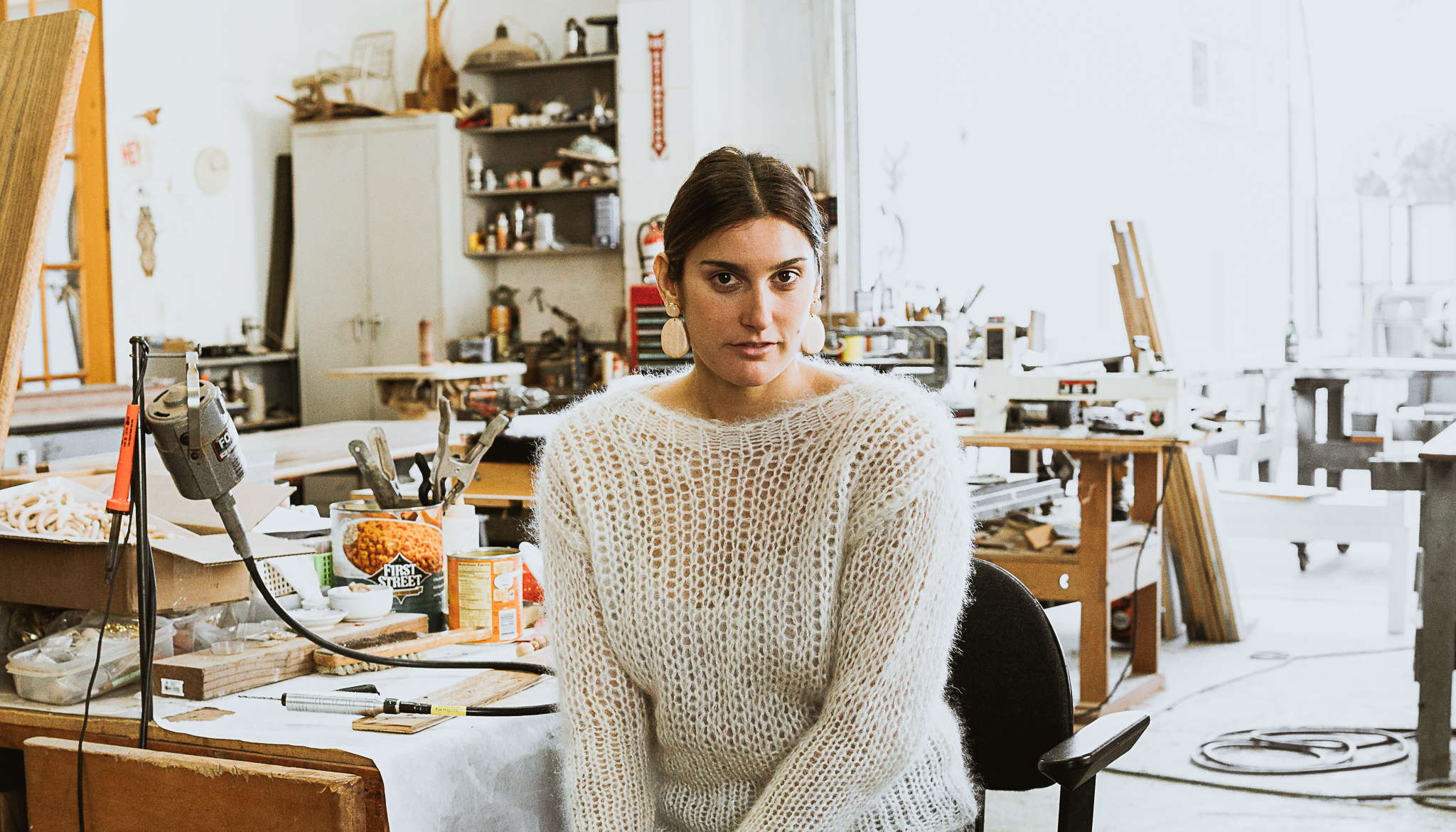
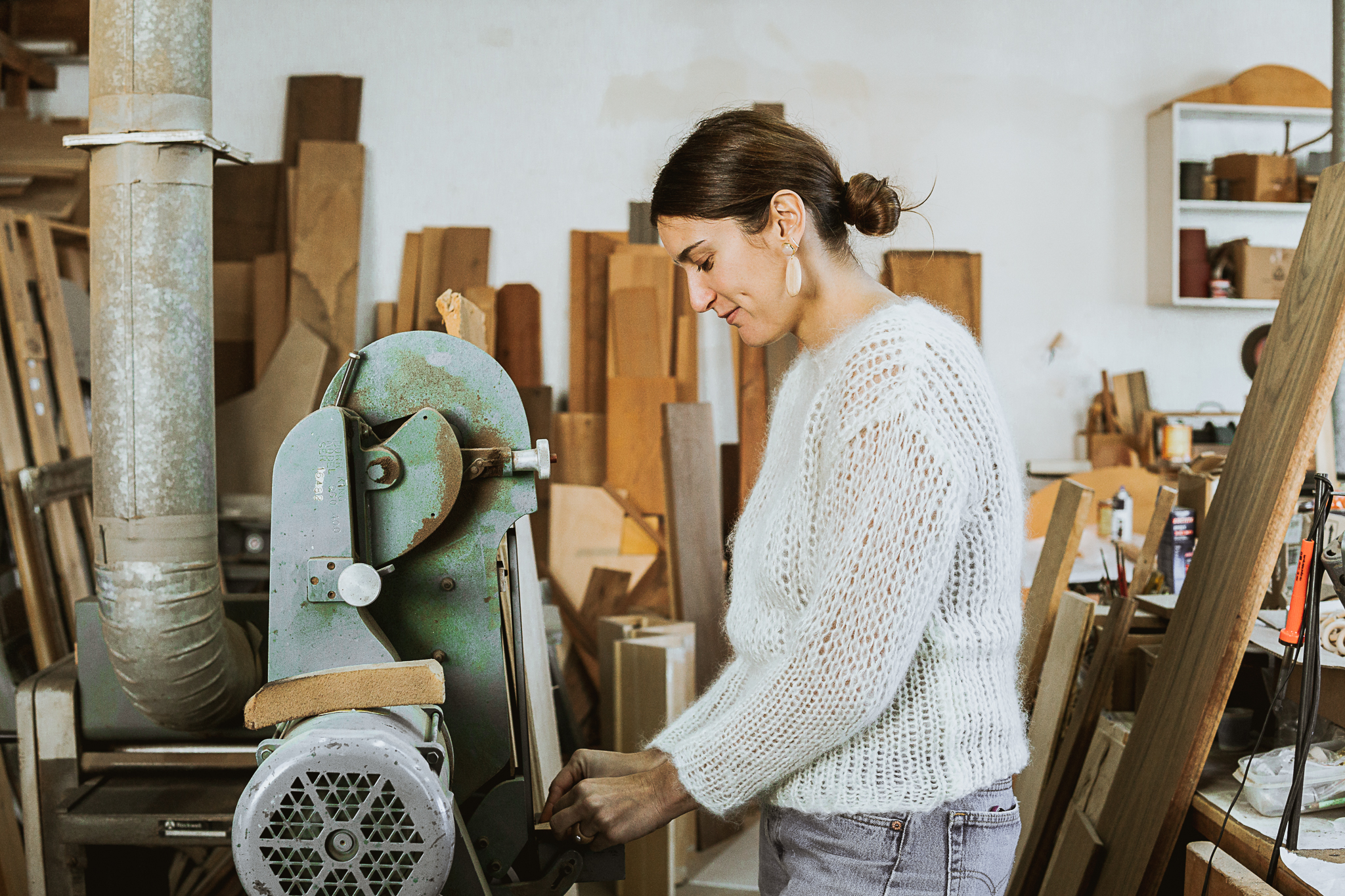
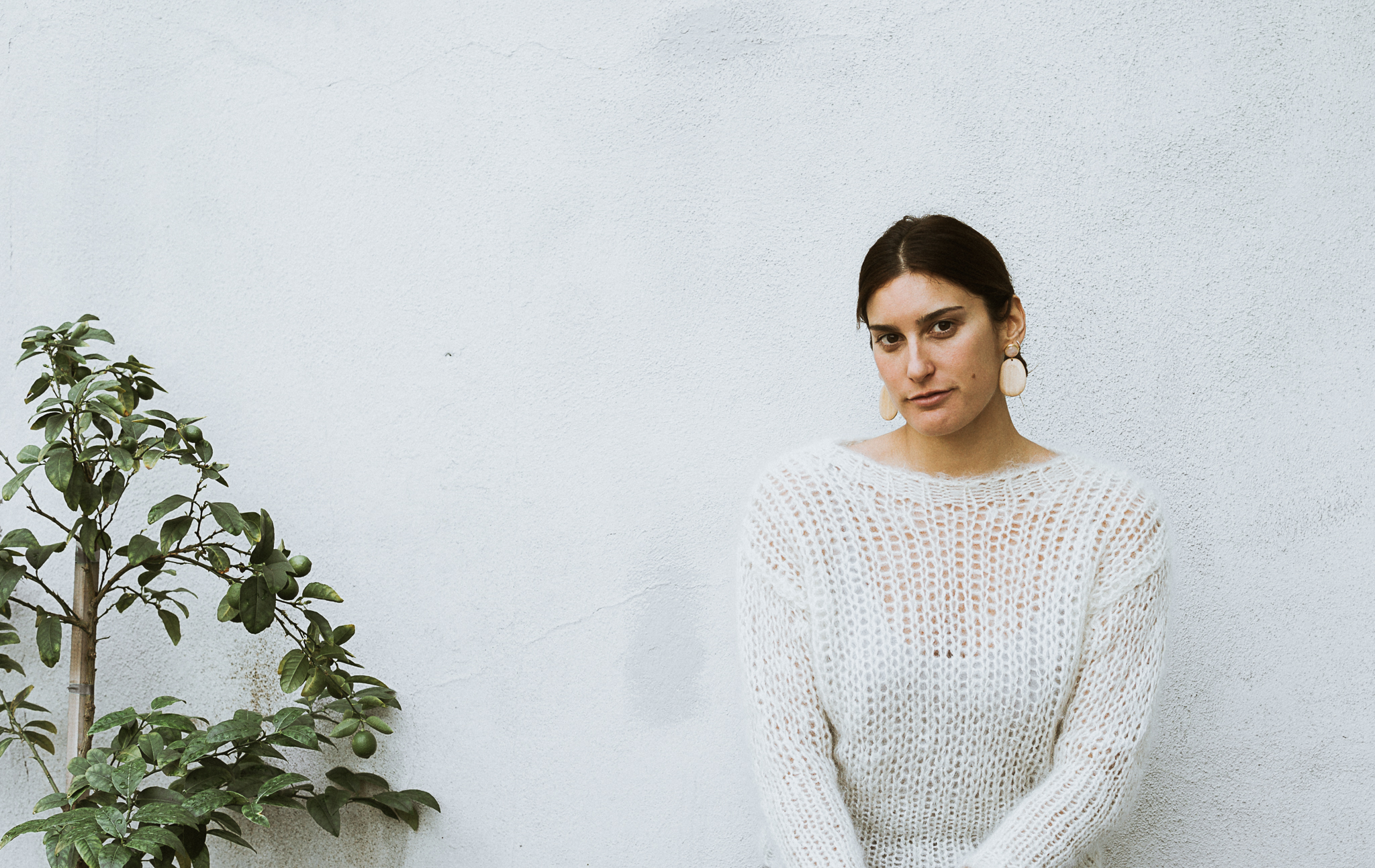
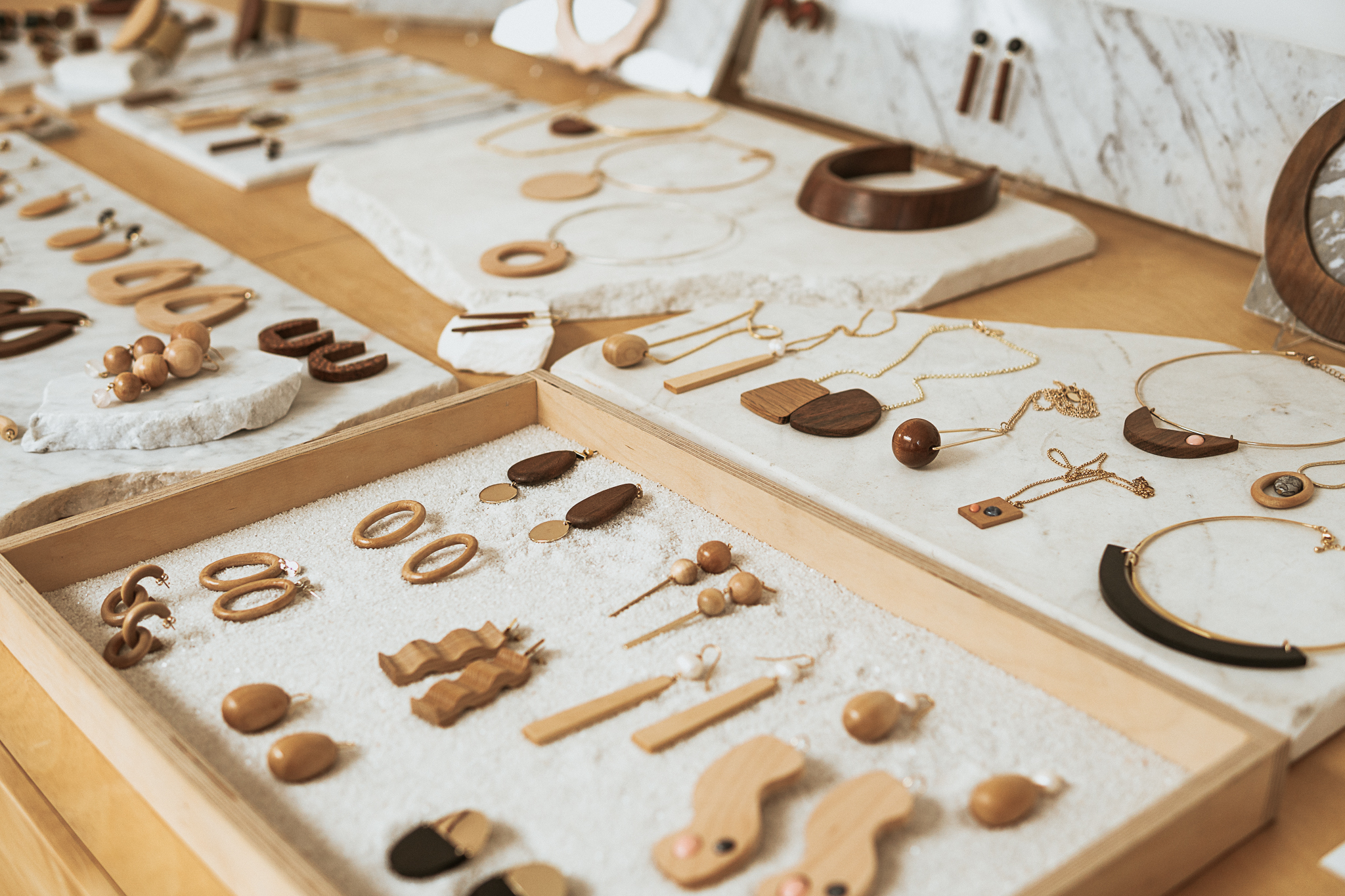
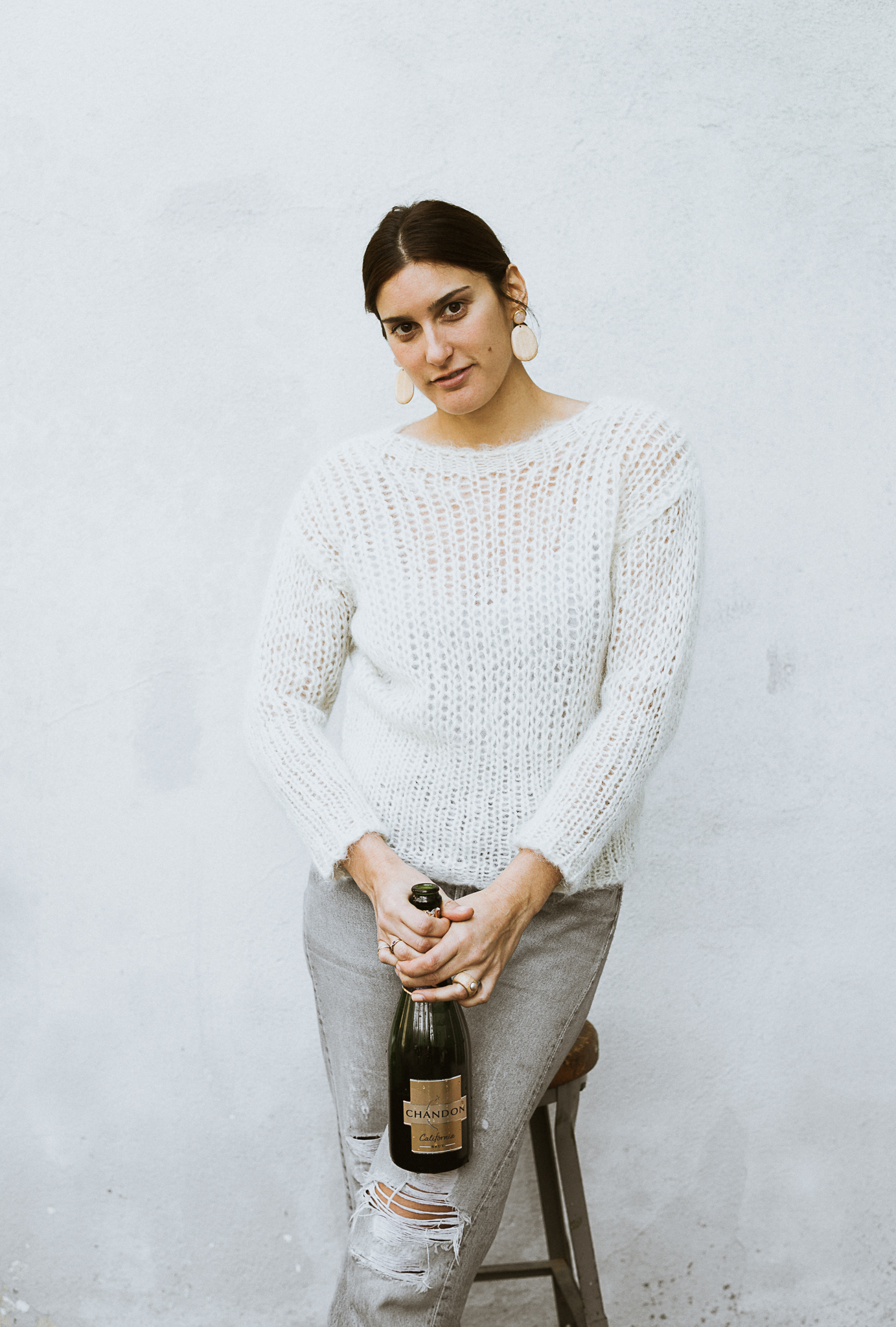
What your favorite part of your workspace?
We just finished our roof top deck. My dad made a beautiful table for it to watch the beachy sunsets from.
"Sometimes the most rewarding part is having patience and letting things come slowly."
Tweet this.
How long did it take you to learn all the machinery and how to use it?
I’m constantly learning. It never stops. I have mastered a few of the tools we have but would love to work more with a lathe.
Who is your biggest influence?
My family. They are my foundation from which I get all my inspiration.
What do you want women to feel when they wear a Sophie Monet piece?
I want women to feel empowered, successful and comfortable when they wear my jewelry. Accessories are meant to stand out and feel special because they add something to your outfit. When I put on a pair of earrings with a simple pair of jeans they instantly make me feel happy and a little more confident.
What has been the most surprising element of entrepreneurship for you?
Having your own business there are surprises and new learning experiences almost every day. Sometimes it’s hard to make time for yourself when you’re juggling a lot of different roles. I’ve learned how hard it is say no when you really really, really want to say yes to everything. Sometimes the most rewarding part is having patience and letting things come slowly.
For more of Sophie's work click here.
Be sure to check back next month for the next installment of Poppin' By.
Photo credit: Anna Maria Lopez
MORE FROM OUR BLOG
Stars of The Teachers Talk Writing Process & Working with Friends
Crushing on women who are crushin' it.
The Cast of TV Land's The Teachers
TV Land's Teachers is an irreverent ensemble comedy about six elementary school teachers based on a web series created by The Katydids and Matthew Miller. The Katydids, a comedic troupe of six women from Chicago whose names are all derived from Katherine, wrote, executive produced, and star in the show (C&C fave Alison Brie is an executive producer), which is entering its third season.
We were able to grab the attention of 2/6, which is an F by school standards, but def an A in content.
Kate Lambert & Kathryn Renée Thomas chat with us on everything from the writing process to being scared to audition to superpowers.
On the writing process:
What does the writing process look like for the six of you?
Kathryn Renée Thomas: We generally spend the first 10 to 15 minutes talking about garbage. We have to get it out. We all arrive in the morning and have to gossip about what horrible things Trump tweeted last night or whatever Real Housewives did-- we cover all the really important things. Then we just dive right in.
Which means?
KRT: It depends on where we are in the process with the script to be honest. Sundays we come in and there are times where we’ll have to brainstorm a plot for an episode. But sometimes we just jump right in and start throwing out ideas. In the beginning we have a couple weeks of brainstorming. Sometimes a plot gets thrown out by the network and we’ll have to come up with something new to plug into a current script. There’s one script that we’re going to table read together for the first time. There’s another script that already has been table read that we’ve gotten notes on. Everyone has written their punch-ups and we bring them in and we sit around a monitor with our writers' assistants and we all pitch for different lines.
Kate Lambert: Going into Season 3 we’re looking to explore our characters on a deeper level. So that’s something we’ve been doing as well.
On having tough convos with the team:
You work together on so many levels and have known each other for a long time. Is it hard to be honest or tell someone you don't like their idea?
KRT: We’re pretty open and honest with each other. It was a hard transition at first. We’ve been together for over 9 years. It started with improv and it started as a joke. This group started as, “Hey we all have the same name. Isn’t that funny? Let’s do a show.” 9 years later we’re executive producing and writing our own show. The transition happened slowly, but we started treating the improv as a business early on and getting pretty serious. Then when we were actually getting paid for what we were doing as a business, we had to shift gears. At first, it was hard for me a to hear a “No” or have my pitches rejected in the room. Especially from people who were my friends and my sisters. We had to learn pretty quickly that that is just part of the process and part of the writer's room process. Any writer's room you go into, you’re going to have to pitch one thousand ideas and maybe none of them get chosen that day. I had to separate friends from business and say “You know, these are just my business partners,” for a while. Then once I got comfortable enough to understand,we’re doing what’s best for the show, I was able to go, “Oh yeah these are my friends!"
On the turning point for the business:
You mention a turning point-- when it all changed. When was that?
KL: It originally started as a one-off show. It was a lot of fun. Then it ran at a small black box theater in Chicago and that was so much fun and so exciting. I think it was the highlight of everyone’s week, and we had a great time and there was such an interesting chemistry between everyone that we thought we should explore. We ended up hiring a coach and getting a run on IO which was a huge deal. From there, we decided to make videos. It's such a great way to get your comedy out there. We made a video promoting the run and we thought that if people didn’t know our name or names of people in the group, they could watch these videos and that would entice them to come to the show. From there it turned into more of a business. We got a website, a Facebook fan page, we took professional photos, and we had a friend design a logo for us. We decided that we wanted to pursue this together, put our best foot forward and try to get to the next step.
KT: I wanna give a shoutout to Kate Lambert because she was really awesome about leading the charge with a lot of that stuff. I think it was Lambert's idea to create a press release for our show and some of the videos we started to make. Which, at the time, I didn’t know a lot of people in the improv community that were doing press releases about their show runs. I think that was a step above what other people were doing.
KL: Aww, thanks!
KT: It’s true! You really lead the charge on some of that stuff and I think it was incredibly helpful and lucrative for us.
On relationships and culture shock in Hollywood:
You've obviously got your tribe and support each other. What was in like moving from Chicago to Hollywood?
KL: Well, I think when you move to Los Angeles, like anything business and Hollywood related aside, the weirdest thing is that the weather never changes. And you lose all sense of time. I can't tell you whether I’ve lived here a hundred years or four. Living Chicago, you remember experiences according to weather and what people were wearing. I really can’t tell if something happened 3 years ago or two months ago.
KT: I’m so Midwestern and I think all the women in the group are really. My idea of LA was a very stereotypical -- douchey managers and fakey-fakey everything. Boob jobs and coke, you know? I was thinking, I’m this nice Midwestern girl, I’m not going to fit in there. But I love it out here. I think what helps with moving from the midwest to LA is the fact that we had a team of people whom we'd been working with and that support system was amazing. We were also really, really lucky to work with TV Land-- I'm not saying that because they’re our boss but they were really willing to take a risk with our voice and our vision. We anticipated that if we did sell this show, we would have to change it a lot to make it mainstream or that we’d be let go in creative aspects, and maybe just get creator credit. We truly found the love of our lives with TV Land because they let us keep all the same cast, all the same producers, all same writers, and they say yes to a lot of the crazy stuff we come up with. So my idea of this bad boss, people being douchey, was really squashed as soon as we started working with them. Not only that, but they’re just the nicest, warmest people so we felt like we were being brought into a family. That was such a great surprise.
KT: Also, on the business side, we came from a sketch background and all of our characters in the web series were different. But they were different by shades of gray and we tried to really blow them out for the show. We had to differentiate the characters and make their differences even more apparent. We also had to make them freer and move into their histories more. We weren’t just exploring them for two minutes anymore-- it was 22 minutes now. It was all a process of developing the characters to a further extent.
"Our success, in the end, came out of a lot failure."
Tweet this.
How did your backgrounds in sketch comedy prepare you for the successes you've seen?
KT: We failed a lot. Our success, in the end, came out of a lot failure. We’re 6 weird quirky girls from Chicago who were auditioning for a lot of things-- not all for weird quirky girls though. We weren't getting cast but instead of taking that as “Forget it, you’re worthless,” we collectively thought, “Forget it, we’ll do our own thing.” So being told no so many times, getting rejected, doing a show to an audience of one, or a hundred who aren’t laughing, we took all that and we learned from this and said how can we just keep going? And we managed to succeed anyway with our own trajectory and our own voices and we have more creative control than a lot of people do.
Early group shot. photo credit: TOM MCGRATH
On dealing with uncomfortable moments:
What’s worse, doing a show with an audience of one who is laughing hysterically or audience of a hundred who are silent?
KL: I always think it’s more uncomfortable to perform for one person. I’d much rather be in front of a crowd of one hundred people. To be honest, sometimes it’s pretty hilarious when nobody laughs. You just have to focus on what you think is funny. If an audience feels like you’re trying to be funny, they get uncomfortable for you as a performer because they can feel your nervousness. You just have to be comfortable and pretend it’s a huge audience.
But you were scared of auditioning...and didn't do it for a long time...
KL: I was lucky. I was working at a department store and the people I worked with knew all about my dreams and what I wanted to do. They were incredibly encouraging and they honestly really pushed me and helped me get over my fear. It was when I was working there that I took my first improv class for actors and I was there when I got cast in my first sketch show. I think it was a combination of support from friends and family, my parents obviously. And also just realizing life's short and I need to do what I want to do. Working jobs like that was good for me in some ways because it made me realize just how bad I wanted the job that I have now.
KT: For me, it can go either way. You can definitely kind of get in your head like Lambert was saying. You can even let go a little more than you would with a crowd of a hundred people. If you’re in a crowd of four people in the audience, it’s kind of like “Well maybe I can take more risks this way. I’m not gonna blow it in front of one hundred people.” I might take a risk and let go a bit in an audience of 4 people and I might play more lightheartedly and have more fun, that often times happens. It just takes a minute to get out of your head to move from “Fuck this, no one came to my show,” to “Okay, well let’s make the best of it.”
On their superpowers:
KL: I can love any dog on sight. And anytime I see a dog I get extraordinarily excited. I think dogs are the best thing.
KT: Oversharing. Girl, I’m an open book. It’s gonna get me in trouble some day.
Teachers is on TV Land. Catch up with the series here.
MORE FROM OUR BLOG
Why LA-Based Christy Dawn Is About So Much More Than Cool Dresses
It is super cool tho.
Everyone in the digital fashion space has deemed LA-based fashion label Christy Dawn the “It,” the “Cool Girl,” the “Dress Every Girl in LA Is Wearing.” And they’re not wrong.
But they’re not entirely right.
That’s not the whole picture.
It'd be hard to flub your fashion in a Christy Dawn dress or sweater (recently launched!!), from both a fashion POV to an ethical one to yes, even a spiritual one.
The breezy Cali brand sources deadstock fabric, manufacturing is done locally, they pay their sewers a living wage (15+ an hour), host a ping pong lunch everything Friday at 3pm, and just got everyone who works for them health insurance. “Christy Dawn isn’t just me,” the founder and lead designer says. “It’s every person who puts energy into the garment.”
This is the pulse that beats through the company. “It’s not hard to find good people,” she says, “ if you treat them well.” As a business owner she says treating her workers well is a “non-negotiable.”
One such person is Pedro Trujillo, the company’s production manager who has been Christy Dawn’s sewer and sounding board from the beginning. Christy and Aras Baskauskas, her husband and biz partner, used to work from his couch. He used to tell them, “Most of my clients don’t usually come down here.” But working from Pedro’s couch gave Christy insight into the people side of production. “Pedro paid people so well,” she says, “it was a priority for him.”
Years of modeling also gave her insider info into her priorities. “I knew how to make an e-commerce site survive. I gathered so much data from jobs,” she says. “I asked so many questions.” She also gathered information ”No one ever mentioned the artisans,” she says of doing e-commerce every single day for four years. “There was no respect.”
"Abundance is about so much more than money.”
Tweet this.
As Christy Dawn grew, so did the need to find a space. Last January Christy and Aras made the decision to really go for it— they signed a lease in the Arts District, but shortly thereafter they knew it wasn’t right. “For us, the space is super important,” she says. And they made the decision to forfeit their deposit, instead moving into the 12,000-square-foot factory in downtown Los Angeles. It’s bright, clean, with a fully built out kitchen, and on tap kombucha and coffee.
It’s a place you’d be proud to work at. To show your fam. And it is a family affair at Christy Dawn.
Pedro’s daughter Valeria is the company’s production coordinator, whom they recently gave her first raise. “We told her, we’re going to give you what you ask for.” And they were true to their word. Last year Christy and Aras also called up Pedro one day and told him and Valeria to meet them at a Toyota dealership. They bought the father and daughter matching Rav 4s, so they could get to work safely. “Our company is growing,” Christy says, “but we don’t need 20 million dollars. We want every one of our sewers to be able to afford what they’re making. Money is just multiplication. It’s just numbers. It’s just energy.”
It’s an energy in each dress, blessed by Pedro’s wife Teresita, who does all the finishing work. “She’s the last person who has her hands on every garment,” shares Christy. A little while back she saw Teresita talking over the garments. She asked Pedro what his wife was doing. “She was blessing each dress,” says Christy. “We had no idea.”
What she does have an idea about are her hopes for the brand's longevity, commitment to deadstock, and sustainability. “There’s nothing timeless about a trend,” she shares of her hopes for the brand’s longevity. “I’m not afraid anymore if it’s a ‘success’ or not. Abundance,” she shares, “is about so much more than money.”
Photography: James
MORE FROM OUR BLOG
How CRWN Magazine Founder Is Changing the World by Being Herself
Real Queens fix each other's CRWNs.
Real Queens fix each other's CRWNs.
“Don’t touch my hair! “ Many of us have heard Solange Knowles sing about it, but Lindsey Day co-founder of CRWN magazine is doing something about it. Lindsey launched CRWN, a hair and lifestyle magazine for black women, with longtime collaborator, Nkrumah. It’s no secret that women of color go to inexplicable lengths to transform their natural hair to Caucasian standards of beauty. It’s an arguably negative cycle of self-denunciation with a great financial and cultural burden. However, in this age of information saturation, there has been a surge of natural hair influencers on social media and a boom in Black hair care products. Both Nkrumah and Day felt compelled to contribute to this movement, finding that the one thing missing was “a premium magazine documenting the phenomenon, or authentically portraying our narrative”(Day). And thus, CRWN magazine was born, a culturally aware art platform that prides itself on showcasing only NATURAL Black hair.
Day is no stranger to running magazines, uplifting social morale, or being on the cusp of innovation, but the road to her existential success was not direct. She landed her first full time job at Interscope Records, while also editing a blog called “livelevated.com” with collegiate friend and creative director Nkrumah. At the time they were working in the corporate music industry and found a little haven in this side project. During Lindsey’s six years with Interscope, she witnessed the economic crash and the corporate industry flip inside out due to expanding technology. This uncertainty drove Day to crave ownership. And in 2009, she co-founded “Made Woman,” “an online magazine that helps young professional women connect and learn from each others’ careers.”
She quit Interscope, worked full time at MW, and took some freelance gigs along the way. One of which turned into a full time position with Intern Queen, doing content, business, and project management, honing in on her digital marketing skills.
As she was approaching 30, the wordsmith needed a change. She reconnected with Nkrumah on a Brooklyn rooftop in 2014, where they reflected on ownership, career, and voids in the marketplace, but most importantly “what life would look like if we could sustain ourselves by serving our people.” That was the beginning of CRWN.
CRWN is a quarterly print magazine with an e-commerce offering. It is 100% independent and self-funded, and has built successful advertisement relationships based on its ability and promise to stay true to its core message of authentic Black culture. This authenticity is what drives the owner. Lindsey says it’s her “love of my people, and the work,” it’s about seeing “a woman or girl flip through CRWN and her eyes light up…or when a sister confides in me about her hairstory and how CRWN is a place where she can finally see herself…These are the reminders that CRWN is so much bigger than Nkrumah and myself.” A profound feeling that most of us hope to evoke at some point in our life.
CRWN is culture. It is the Black musicians, painters, photographers, writers, activists, and visionaries of a culture that have never been honestly represented in the media, nor maybe even to it themselves. It is healing Black people in America by saying ‘it is beautiful to be you.’ The team at CRWN feel a moral obligation to tell their story and document their culture. In years to come, Lindsey sees CRWN growing into a “true media platform and hub for the culture,” where creatives and business people alike can come and “cut their teeth,” as she says.
CrwnMag Issue no. 01; CrwnMag Issue no. 02.
The co-founder's ability to show up, persevere, work hard, and trust her gut instinct, has brought her to a place of ownership, pride, humanitarianism, and cultural revival. She has created a tangible change in the Black community, and most importantly, an awareness of truth and self-love. In a world where African Americans have been systematically misrepresented, discredited, and traumatized throughout the course of history, Lindsey Day and CRWN have created a haven of acceptance, beauty, self-love, and open conversation. The powerhouse tells it like this, “This is the first time in my life I’ve known I’m walking in my true purpose.”
Arianna Schioldager is Editor-in-Chief at Create & Cultivate. You can follow her @ariannawrotethis.
MORE FROM OUR BLOG
Issa Rae on Failure, The Old Hollywood Boys Club & Throwing Chairs
When Issa Rae joined us on stage at Create & Cultivate Seattle as keynote conversation with CEO founder Jaclyn Johnson there was a fair amount of fan-girling that went on. Which, fair. The self-made YouTube star has made moves since Awkward Black Girl, creating and starring in HBO's Insecure, as well as landing in Time Magazine's "Firsts" issue, credited as the "First black woman to create and star in a premium cable series."
Here's what she shared with the audience.
On the old boys club:
"You’re constantly getting excuses from higher-ups that they can’t find people.. But they’re not trying hard enough.
Sometimes you have to take a risk on people that have no experience, so they can work. There is an old boys club at the end of the day. They’re recycling people and they are risk-averse. But when you have black and Latino people supporting a black show, the results are clear and it feels authentic. For us it was making sure that we’re doing our part to give other people the spotlight."
On your ‘one shot':
"During Awkward Black Girl... I was producing that out of pocket, and my pockets were empty. That was hard. I produced it with 25 dollars. We set a Kickstarter goal of 30k and ended up raising 60k. And then Pharrell [Williams] contacted us in the middle of our season and asked if he could fund the second season. That changed the game from there."
Shonda Rhimes and co ended up reaching out to Issa.
"I was producing Awkward Black Girl out of pocket. And my pockets were empty."
Tweet this.
"I pitched them a show called I Hate LA Dudes. It was something true to my heart and true to their hearts too. I developed that with them. I felt like it was my one shot. I was extremely eager to please. Shonda was great at hand-holding but where I fell short was navigating network notes. When the studio and network would give notes I was a 'yes woman' and I lost what I was trying to say in the process. At the end of the day they want you to funnel their notes through your voice. I didn’t get that at the time. They ended up passing on the series. I thought that was my one shot. So when HBO called and I knew that I should never dilute my voice again."
On failure:
"I can’t go a day without failing. I think where I thrive is knowing I’m not gonna make that mistake the same way again."
On bringing up other people:
"Too often we try to find people that are established or go the star route and networks encourage that. But I’d been following Yvonne’s [Orji] career for such a long time, just via Facebook. She was one of the random people I had friended post election when she had posted a video trying to claim Obama as a family member after the election. I thought it was the funniest shit ever. I just friended her. When we got picked up I hit her up and said, ‘Hey will you audition for this?’
The web is where you can be the most free. It’s your pure unfiltered voice. And it’s where you can highlight other content creators. Which is what Issa Rae Productions is about. It’s about building a pipeline to get people into television and film. It’s been super exciting as a genuine fan of dope artists.
Everyone on the Insecure team is all about that. Elevating other content creators. That’s what it’s going to take to shift the industry and shift the crazy excuses as to why there aren’t relatable shows of color."
On first mini-viral moments:
"Me and my girlfriends were sitting around drinking Moscato one night. Because we heard Lil' Kim talk about it in a song. And we could afford it. We had a freestyle session where I thought, I need to record this. We are killing it. We weren’t. I used Windows Movie Maker and turned it into a music video. It spread around our campus."
On breaking into the industry:
"At the same time [as the viral videos] I was trying to break into the industry traditionally. I came to LA to try and sell a spec script I wrote with a partner. I was told by executives that there was no audience for the kind of work we we’re trying to do. I had a lightbulb moment when I thought I am such an avid user of Facebook, it would be so cool to do a mocumentary about what it’s like to be black at Stanford and just upload it. And did it. It started spreading to other schools. For me that was an epiphany that I had direct access to an audience. But I graduated and didn’t do it again until about two years later. Awkward Black Girl was my third web series. It blew up from there."
On being ‘Insecure’
For Awkward Black Girl I was 100% nervous. I had never put my own face out there. I wanted another friend to star in it, but by the time I actually went through with it she was like, ‘Girl I’m in law school.’ I knew I was running out of time. And I knew the character and that I could play it. That took a lot of pumping up. I know how ruthless people are, but I had to get over it. I had my best friend come over and showed her the first edit and watched her genuine feedback and laughter. Then I closed my eyes, uploaded it, and went to sleep. By the time I woke up, it had spread beyond my network, which I thought was just incredible."
"I can’t go a day without failing."
Tweet this.
On representation:
"I was a fan of television shows that had a specific type of humor. But I never saw people of color representing that humor. Sometimes they were being laughed at or the butt of the joke, but they weren’t cracking the jokes."
At the time Issa had a film blog where she would vent her frustrations.
"On the blog I would talk about what I wanted to see. And I would talk shit a lot. And one commenter was like, ‘Bitch you talk a lot of shit, why don’t you do it?’ And I was like, 'Oh maybe I can.' So I really created Awkward Black Girl so I could continue to talk shit."
On the start of her career:
"There is someone who should have equity and is the reason I put out the show. Commenter ShyWeb18 is responsible for my entire career. Shoutout to her."
On female friendships:
"When I was in in college I loved watched the reality shows for the drama and the ignorance and the ridiculousness of it. But then I thought this is all we have depicting black female friends. We’re constantly battling each other, we’re conniving. We’re throwing chairs and wine bottles at each other. And I’ve never thrown chairs in my life.. at my friends. We wouldn’t be friends after that. I wanted to depict the real friendships that I knew. Yvonne’s character Molly is based off of one of my best friends.
I love women. Some of my best friends are women. There’s just a comfort and a shorthand and a support system. For me it comes from being around dope active women. There’s a narrative that we don’t support each other, that we’re catty, that we tear each other down. That’s never been my experience. It’s so rewarding to grow with so many different women. "
Photo credit: Smith House Photography
Arianna Schioldager is editor-in-chief at Create & Cultivate. You can find her @ariannawrotethis.
MORE FROM OUR BLOG
This Millennial Female Firefighter Is the Only Woman on Her Crew
And you thought your job was hard.
Over the past few months wildfires have burned hundreds of thousands of acres in California. Families are losing their homes and everything they've ever owned. Animals are scared. (Shoutout to the LA hometown hero who rescued the baby bunny.) And the Santa Ana winds are making headlines again for blowing embers and flames up and down the coast.
But when wildfires strike, 25-year-old Bailey McDade, a “granola geek turned badass of the brush fire” hikes toward the flames. "I was a good kid. I loved to play outside," the firefighter says of her youth. "Always barefoot, always running around in the woods. And always playing sports. I feel like that's a huge part of my career choice. It feels like I'm still on a sports team." After studying Wildlife Science at Virginia Tech and serving with AmeriCorps, Bailey followed her love of environmental biology all the way down to Belize and back up to the Yukon studying wildcats. Her continued interest in everything outdoors led to her current role as a wildland firefighter, noting that on her worst day, she “wants to be sitting on a log in the woods somewhere.”
"I never get to talk to anybody about my job," she tells us when we speak. Which, makes sense considering during fire season Bailey can work up to 160+ hours. "My job can be a lot of different things," she explains. There's no typical "day in the life."
"Some days it's going to the station and waiting for a call, but for large fires, which we get sent to all over the country," she says, "it's typically about 200 hours per assignment, or 14 day stretches." #Hero.
She eats on the fire lines. Sleeps on the fire lines. "The job is all about being flexible. You wake up, you breakfast and then you get your assignment. I could be on a fire line, or cutting down dead trees and brush. Doing structure protection or putting up sprinkler systems around houses. Or we could be standing right in the flames."
When she’s face-to-face with the flames—close enough to feel the heat on her face and in her lungs—her pants, shirt, and face shroud made with flame-resistant plastic fabric help keep her protected as she stands waste-high in the heart of the fire.
Contrary to city firefighters, as a wildland firefighter Bailey says she doesn't wear much. "Everything that we use we have to carry on our backs," she explains. She Bailey and her team wear specialized fire gear. "It kind of just looks like cargo pants and a button down shirt. It feels like cloth, but it's a fire-resistant plastic blend." Everything needs to be durable enough to withstand 200 hours, 14 days straight. Part of the reason the gear is different is because she and her team are hiking into the fire. "We can spend a full day hiking," she says. "We sleep in it, we eat in it. We live in it for weeks at a time. Every pound counts when you're hiking straight up a mountain. We don't have the luxury of going back to our trucks very often. We might have to walk ten miles in our gear."
Which, isn't a bad thing for the self-described "antsy" woman. "I love to be active," she says. "Sometimes with fire we say there's a hurry up and wait mentality. You may not be doing anything that you think is a big deal that day, but it's part of a much bigger operation. You might be digging a trench for 14 days straight and not feeling like you're doing anything, but that might save a community." She says, "My hardest days are when I'm sedentary."
An environmental biologist turned badass of the brushfire, Bailey is currently the only woman on her crew. "There are other women on other crews, but I'm the only one on mine," she shares. "I can't say that I feel the difference. We all pack the same weight, wear the same gear, and do the same job. I sometimes have to remind myself that women in this field and in general, we don't have to prove anything. These guys are like my brothers. They've been there for me through hard times. Those guys are willing to carry me out of a forest."
They've even nicknamed her. "The guys on my crew call me Fern Gully, but it's all in good fun."
"I sometimes have to remind myself that women don't have to prove anything."
Tweet this.
Bailey is willing to make the same sacrifices for her team. "I'm working with a lot of people who are like me. And I'm working with a lot of people who intentionally chose this job. Nobody accidentally becomes a firefighter. We're all in sleeping bags on the ground, sleeping next to each other under the stars. We eat sitting in the dirt. We're there for a very serious job, but sometimes it's really fun to be around other people who also enjoy this lifestyle.
And as for her solo female status? "Somebody is always going to be able to do more pull-ups than me, or hike faster," she admits. "But I'm also going to be faster and stronger than someone else. At the end of the day we hike into fires together, we fight them together, and we hike out together."
If you want to help the 200,000+ people in California affected by the wildfires we're listing several ways to help below.
Ready Ventura County has set up a texting service. Text UWVC to 41444 and 100% of your donation will go directly to those impacted by the fires.
The American Red Cross is looking for volunteers to help evacuees.
The Los Angeles County Animal Care Foundation is accepting donations through its website.
The Humane Society of Ventura County is also accepting donations.
There are a number of verified fundraisers on GoFundMe where you can donate to relief efforts.
MORE FROM OUR BLOG
3 Entrepreneurs Share Their Secrets of Building a Smart Brand
Your audience is always watching.
We're ever curious about what makes a brand successful-- and if there are certain tenets that will always remain important, especially in the face of shifting technology.
So we asked three of our upcoming Create & Cultivate DTLA panelists to share.
Ask for help and to let people help you whenever possible because you can’t do it all yourself. Also, find people that are better at you to handle the things that you don’t have time to do.
Work hard, be persistent, and don't be afraid to put yourself out there.
Don’t try to imitate the success of others. Instead let their success inspire you to find success in your own way.
Carly de Castro, Co-Founder, Pressed Juicery
Defining a brand mission and building every facet of your brand with this in mind. Also learning from your mistakes. No brand is perfect and I would be lying if I said that we made some choices that we maybe thought were good for our company but in the end were not. What we learned is that it’s not only about the good choices you make, but how you learn from the not so great ones - this learning process has truly helped create and strengthen the Pressed Juicery brand DNA. I also think it’s extremely important to stop and just be grateful every once in a while. As a growing and rapidly expanding brand sometimes it can feel like there aren’t enough hours in the day to get everything done. We’re always thinking about the next step and striving to be better – but once in a while it’s necessary to just be thankful for what we’ve accomplished in these short 5 years, it’s a great boost of energy for me as we move forward.
"It’s not only about the good choices you make, but how you learn from the not so great ones."
Tweet this.
Emily Henderson: Founder, Style By Emily Henderson
1. Steer away from anything generic. I’m not saying be controversial, I’m saying be interesting and if you feel strongly about something but are scared of the outcome - just do it. It’s fine. Most of the time you aren’t alone and your audience will respond to that opinion and if not, you’ll still get traffic.
Obviously if you are a big companyyou have to be a little more careful, but I’m much more attracted to brands that have more of a personality, make a statement ,and stay away from cliche social sayings or really bland expressions.
2. Trust is EXTREMELY important. There are times when you’ll be tempted to sell out, there are times when you will sell out (I have) but man, just know that your audience is watching and while it may not be the death of you it can be hard to recover if you endorse something that you know people think is cheesy.
3. Think about your end goal for each new project. Is it money? Exposure? To broaden your network? New portfolio work? Fun? Ideally it's a combination of those things. Then cater how you handle that project based on your end goal.
Arianna Schioldager is Create & Cultivate's editorial director. You can find her on IG @ariannawrotethis and more about her on this site she never updates www.ariannawrotethis.com
How This LA Business Owner Tries to Live a Zero Waste Life
Waste not, want not.
We’re making zero waste toothpaste in the kitchen of Meryl Pritchard of Kore Kitchen. She’s using an olive wood spoon made from branches; no trees were cut down in the name of the spoon. She uses aloe instead of Bandaids. Her water jug is filled with spring water a friend delivers. Even her TP is made with wheat straw and requires no deforestation.
“Why would we cut down trees so we can wipe our butts?” she asks me as she mixes the concoction of coconut oil, baking soda, turmeric, peppermint, and cinnamon. She scoops it into a glass jar for me to take home.
“The turmeric makes the toothbrush orange,” she tells me, “so don’t get weirded out.”
What’s weird is how little I know about recycling; a blue bin is hardly a perfect solution. “Less than 10 percent of plastic that gets thrown in blue bins is recycled,” she explains. The reasons for this are multifold: people don't sort, rinse, or really know what can and cannot be recycled.
[Unfun fact: In Los Angeles alone nearly 10 tons of plastic fragments-- think parts of plastic bags, straws, and soda bottles-- are carried into the Pacific Ocean, every day.]
Meryl hasn’t always been about that zero waste lifestyle. For a minute she was about that life. In her early twenties she was working for a well-known Hollywood celebrity stylist. “We’d spend days picking dresses, fitting these beautiful women, and then they’d get torn to pieces in the press.” It made her feel terrible about herself and her body. “At the end of the day,” she tells me, “I’d think, if people are saying this gorgeous woman looks terrible, how am I supposed to feel about myself?” It lead her down a dark road rife with body image issues: “I was trying every fad diet out there, not eating,” she says. “Feeling bad in your own skin is the single worst feeling.”
[Define it: Zero Waste is a philosophy that encourages the redesign of resource life cycles so that all products are reused. No trash is sent to landfills or incinerators.]
“Feeling bad in your own skin is the single worst feeling."
Tweet this.
“This is my trash from the past three months!” she exclaims. "I’ll keep it and I’ll analyze it. I like to keep it because then I can go through it and find a solution.We don’t have a relationship to trash. People just don’t know where it’s going-- someone picks it up, takes it away, so how are you supposed to care when you don’t see it?”
But then she came across a book, “The Kind Diet,” by Alicia Silverstone. Meryl says she had so many ah-ha moments while reading, from coming to understand aspects of the food industry to what she was putting in her body, she knew it was time for a change. She emailed “every single holistic nutritionist in LA who had a website and seemed legit,” and was surprised when they all responded nicely. “I was so used to dealing with people not getting back to me or being nice,” she says in reference to her styling career, “that the energy immediately felt different and promising.”
She began working with a holistic nutritionist who let her sit in on all client sessions. “That’s when I saw healing first hand. I watched as people would cancel surgeries doctors told them were 100% necessary, and they’d go on to live life healthy.” With a little experience and a lot of enthusiasm she went back to school at 23. What she says is a “great age to make a shift.”
She attended The Institute for Integrative Nutrition, which teaches over 100 different dietary theories. As she was learning them, she’d try them. “You are the best doctor you can have— you live in your body, you feed it, you feel what doesn’t work.” The hitch was that Meryl had no idea how to cook. “I would go on Google or talk to Siri and ask really basic things like, ‘Siri, how do I cook a chicken breast?’ But it taught me that I can do anything. If you want to, you can figure it out.”
Kore Kitchen evolved naturally from this mindset. Kore is a “curated and nutritionally designed, meal delivery service and cleanse offering based in Los Angeles.” The intention is to help clients adapt a healthier lifestyle through simple nutritional philosophies: eat whole, organic foods, that are local and sustainably sourced.
There's no packaging in her pantry. She fills reusable glass jars with foods from the bulk bins.
With these Kore values in mind she began cooking for friends and delivering meals. “It would take me forever.” she says. “What would take a chef 20 minutes would take me 3 hours, but with food you’re transferring energy into the meals.”
“I was planning the menu, doing the shopping, the cooking, the delivery, and right after I finished I’d get up and do it all over again.”
She had a few clients during this time, but it was when friends and clients Donovan and Libby Leitch recommended her to Gwyneth Paltrow, the business took an unexpected turn. “I delivered her meals and heard nothing for a few months,” she says. Until Goop’s food editor reached out in December 2014, saying they loved her recipes and would she contribute a few to the site. She shared some recipes for Goop’s 2015 Detox Guide and the email floodgates opened.
“It was just me with one pan, in this kitchen, and I had all these orders.” She hunkered down, found a chef, Anna Lagura, whom she met through a happenstance convo with her neighbors across the hall, and signed a lease for a commercial kitchen space. Anna and Meryl now work out of L.A. Prep.
Of Anna, Meryl says, “She’s the person I’m most inspired by. I can send her a photo of any dish and she can make it with our philosophy. And she knows all of the clients and their food preferences by name and memory.” The meals Kore offers are organic and made from local ingredients whenever possible. They use no processed foods, no additives, no antibiotics or hormones, no preservatives, and no refined cooking oils or refined sugars. They are 100% gluten-free and dairy-free.
The business has been running for about a year and a half, and Meryl acknowledges the difficulties of being a self-funded, small business, but insists that she prefers it this way. "No funding required us to be more creative with our marketing," she says, adding "and I think we have a stronger connection to our clients."
“It’s difficult, but it’s also really fun. Business is like life, there shouldn’t be an end goal— you should be learning and growing all the time.”
"Business is like life, there shouldn’t be an end goal— you should be learning and growing all the time.”
Tweet this.
Growth for Kore however, does not include meal delivery services outside of Los Angeles. It is important to Meryl that they stick to their values of staying local. “We’re not a corporation, we’re a small business.”
“I don’t want to grow outside of LA. Local is really important to me because of the carbon footprint. With other meal delivery programs, you have to wonder, why are you in California eating food from North Carolina?”
It’s also why they have partnered with LA Compost, a local compost with four hubs, one of which is five minus from the commercial kitchen space. “All of the food that you’re eating, the scraps are going directly to the compost. Not trucked out of the city and brought back to be sold as soil.” They also now have a plot at the Elysian Valley Community Garden where Meryl is trying out her green thumb.
“We’re not trying to feed everybody,” she says, “we’re trying to feed our community.”
Click through the below gallery to see more of Meryl's zero waste lifestyle and see our toothpaste!
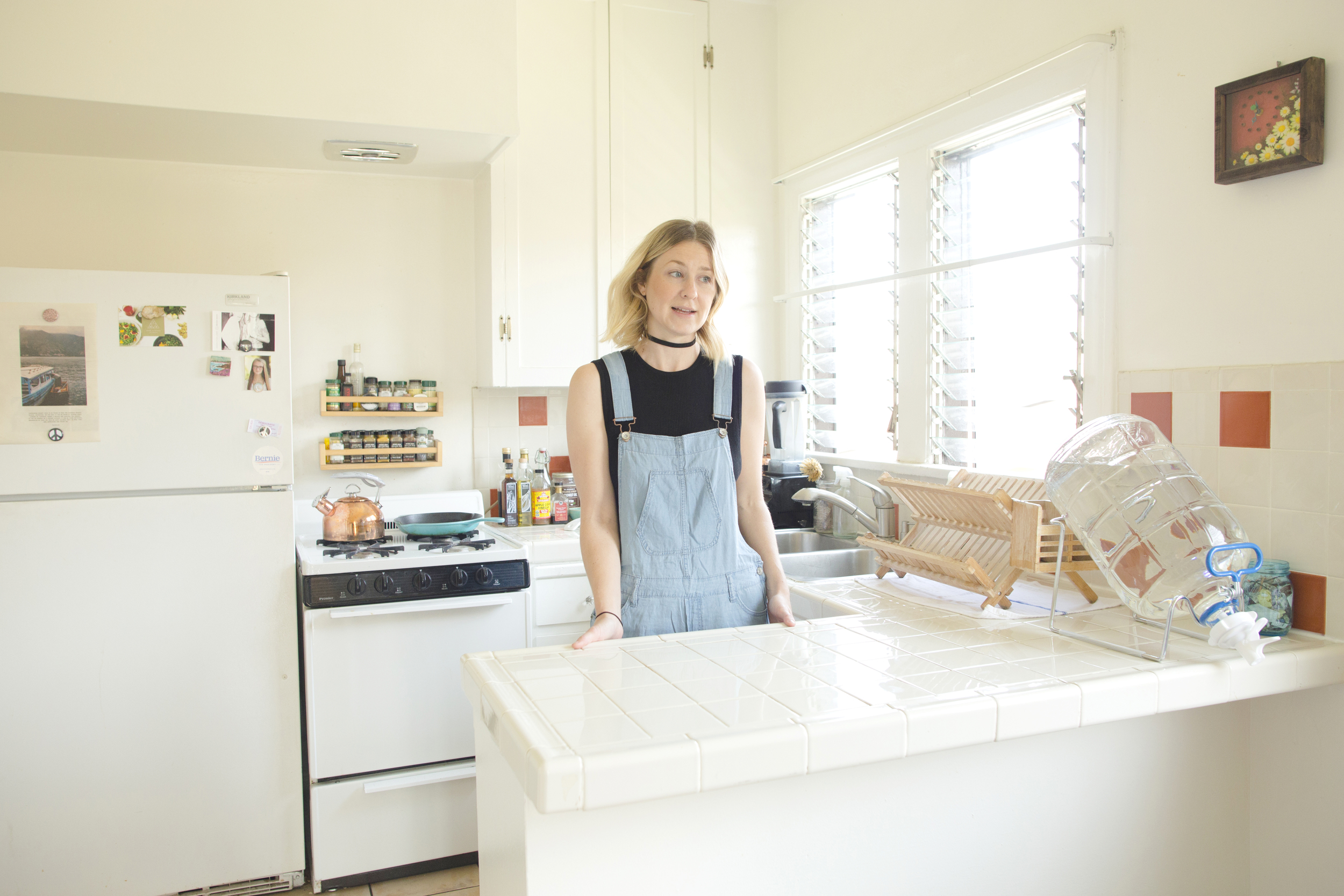
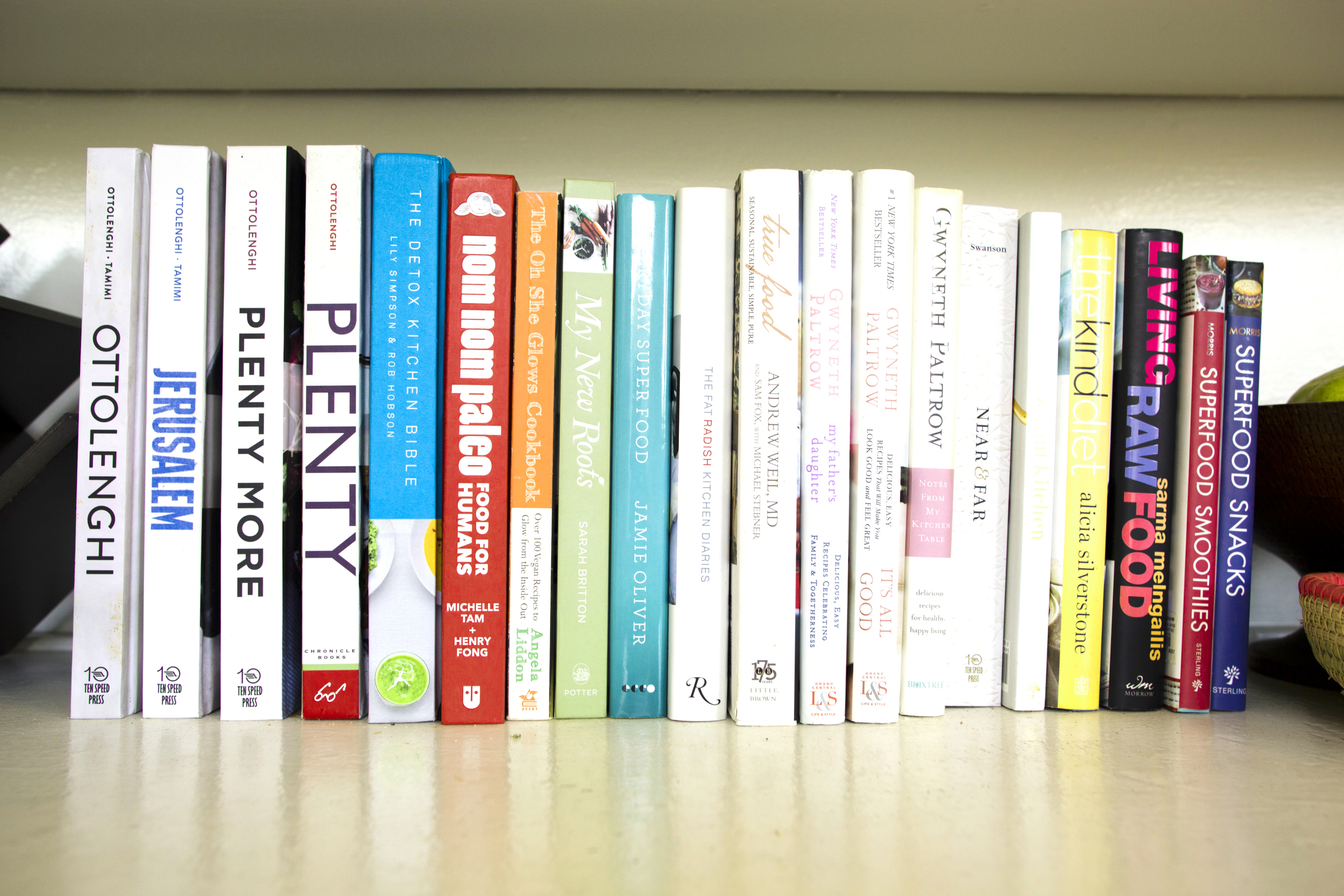
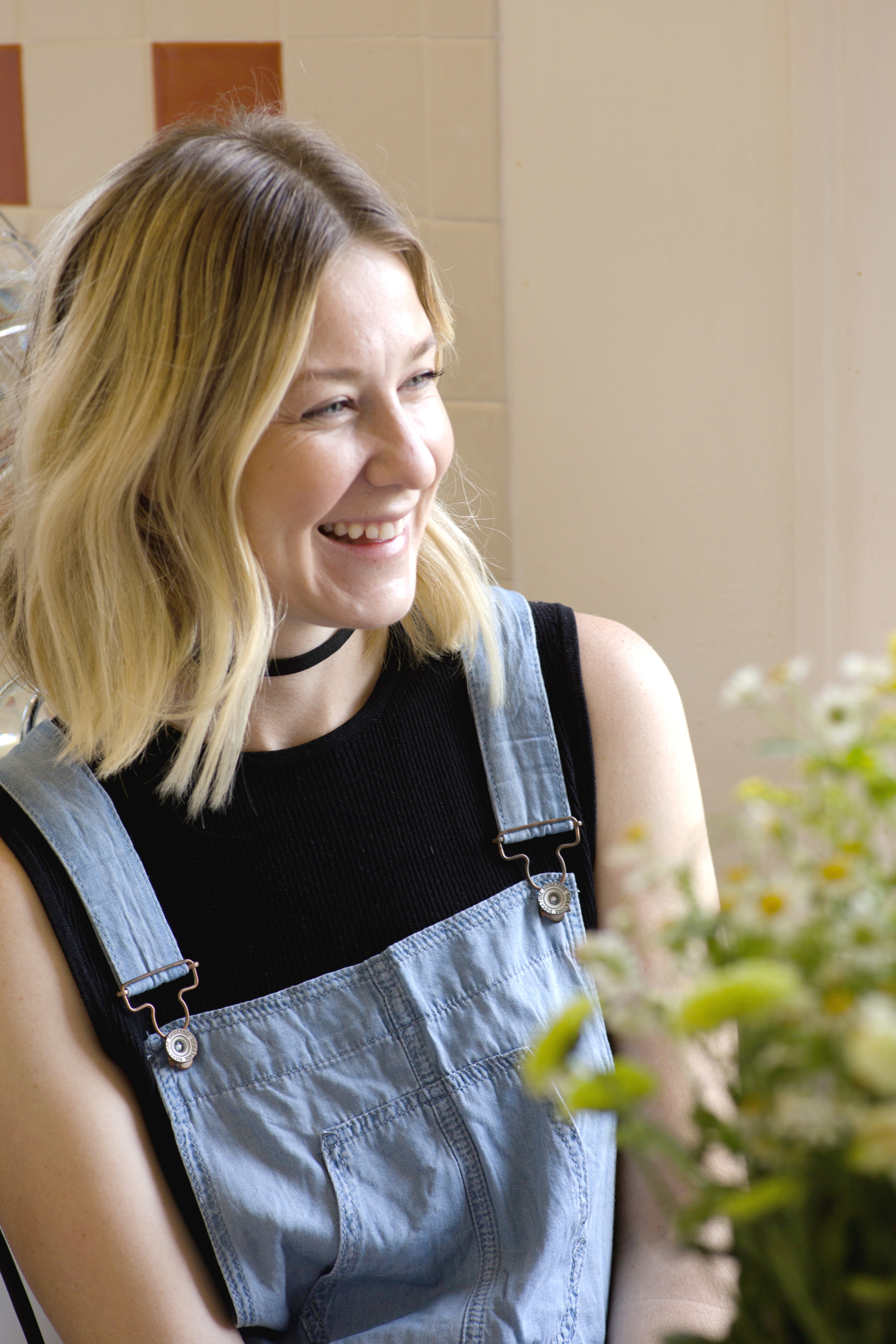
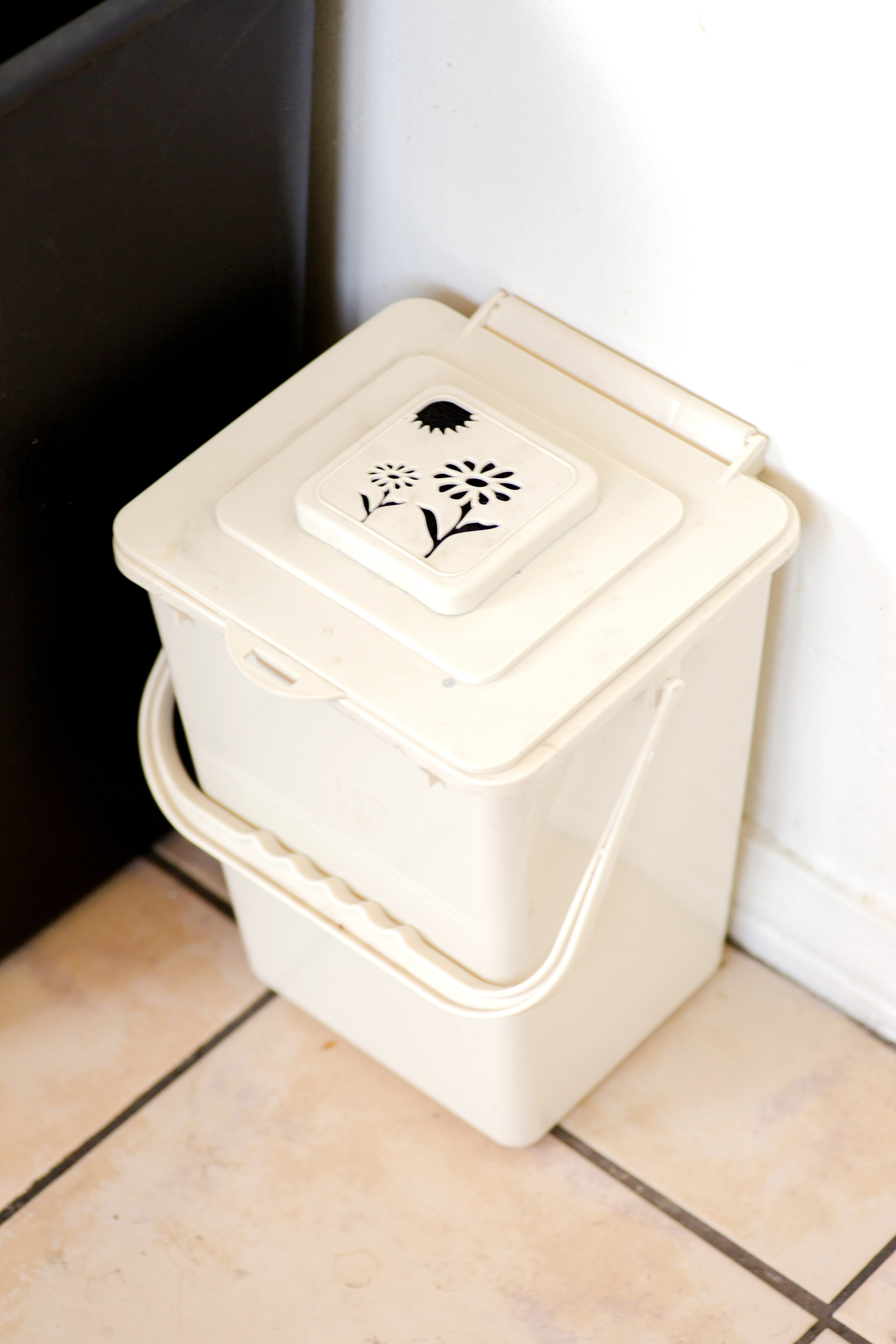
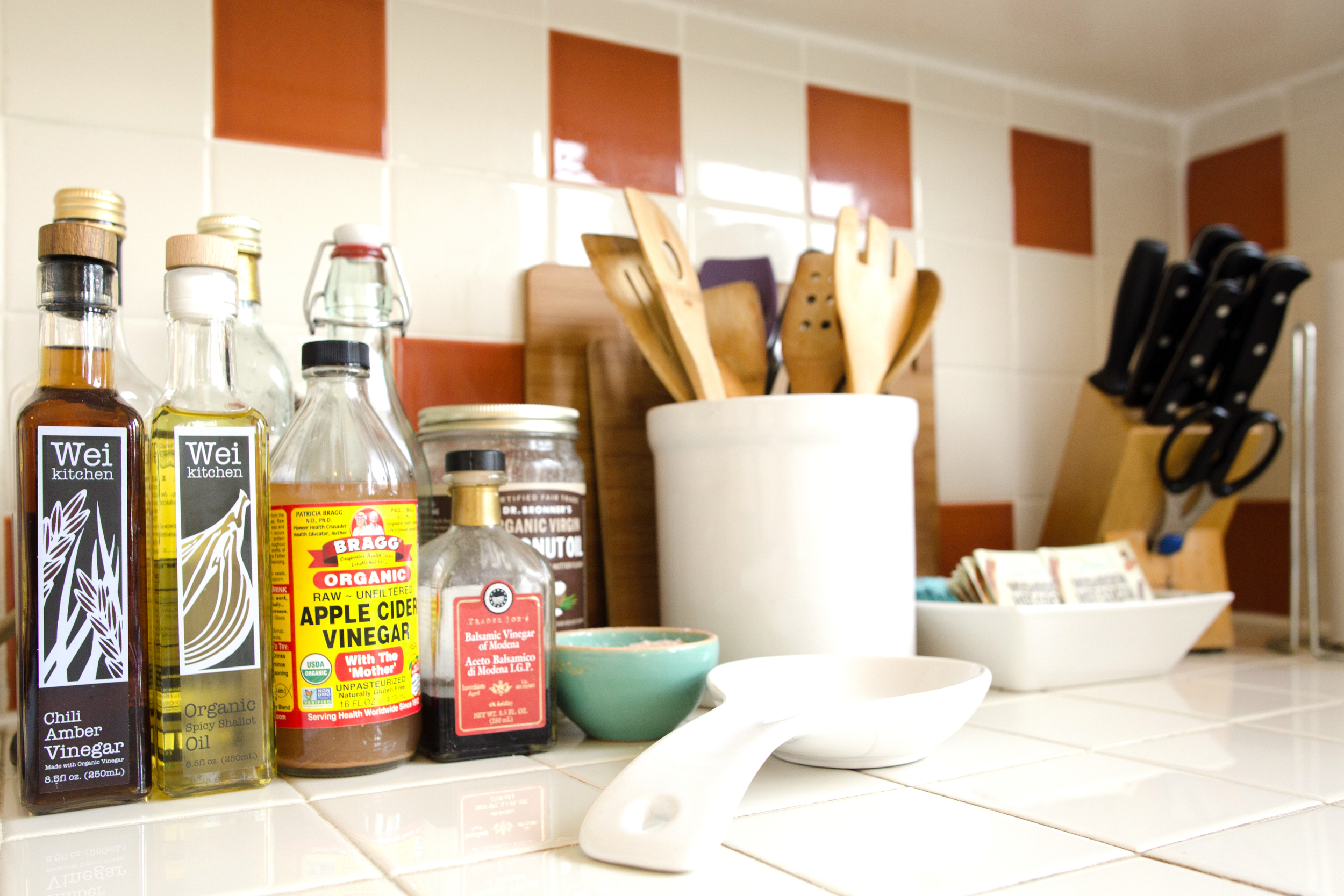
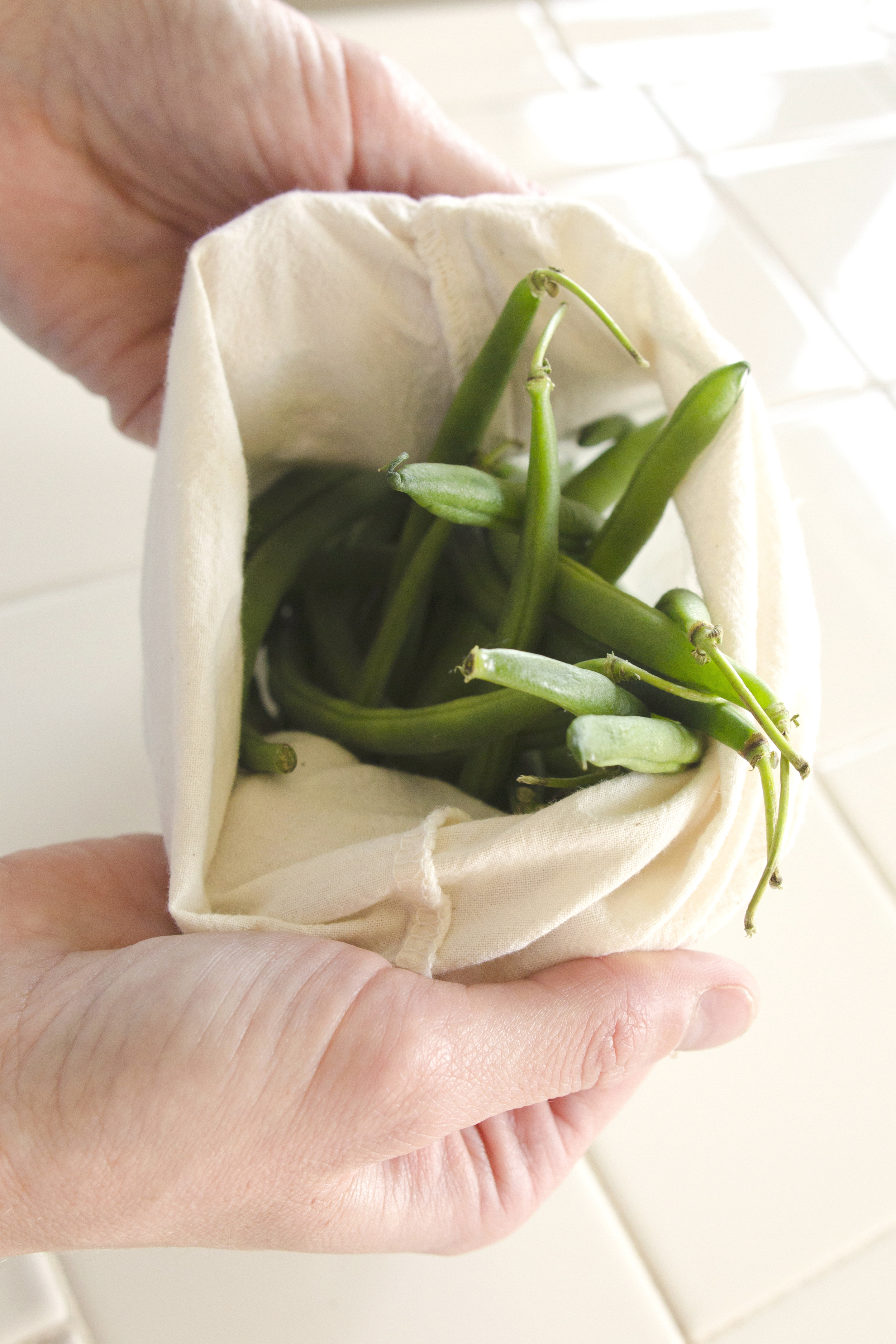
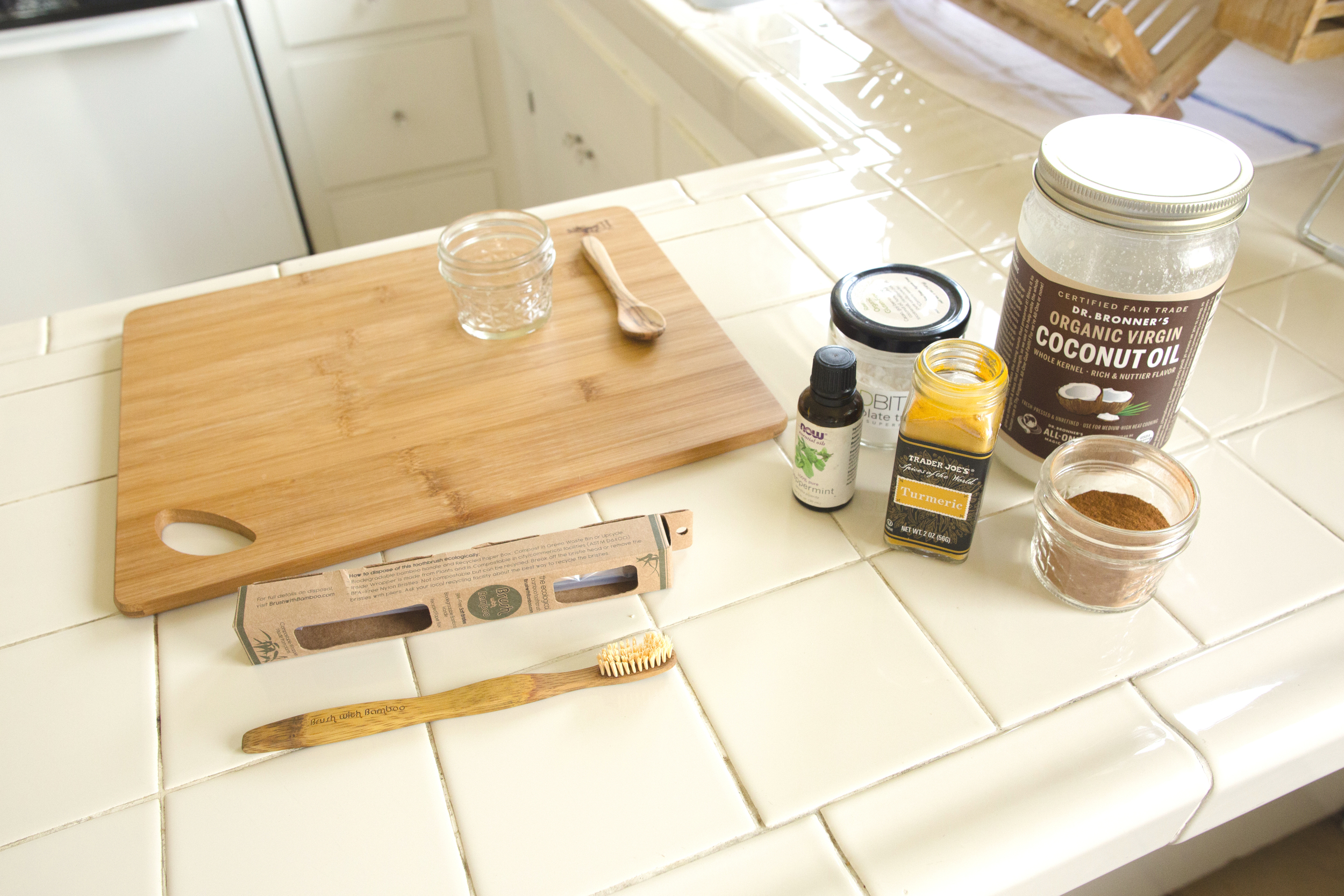

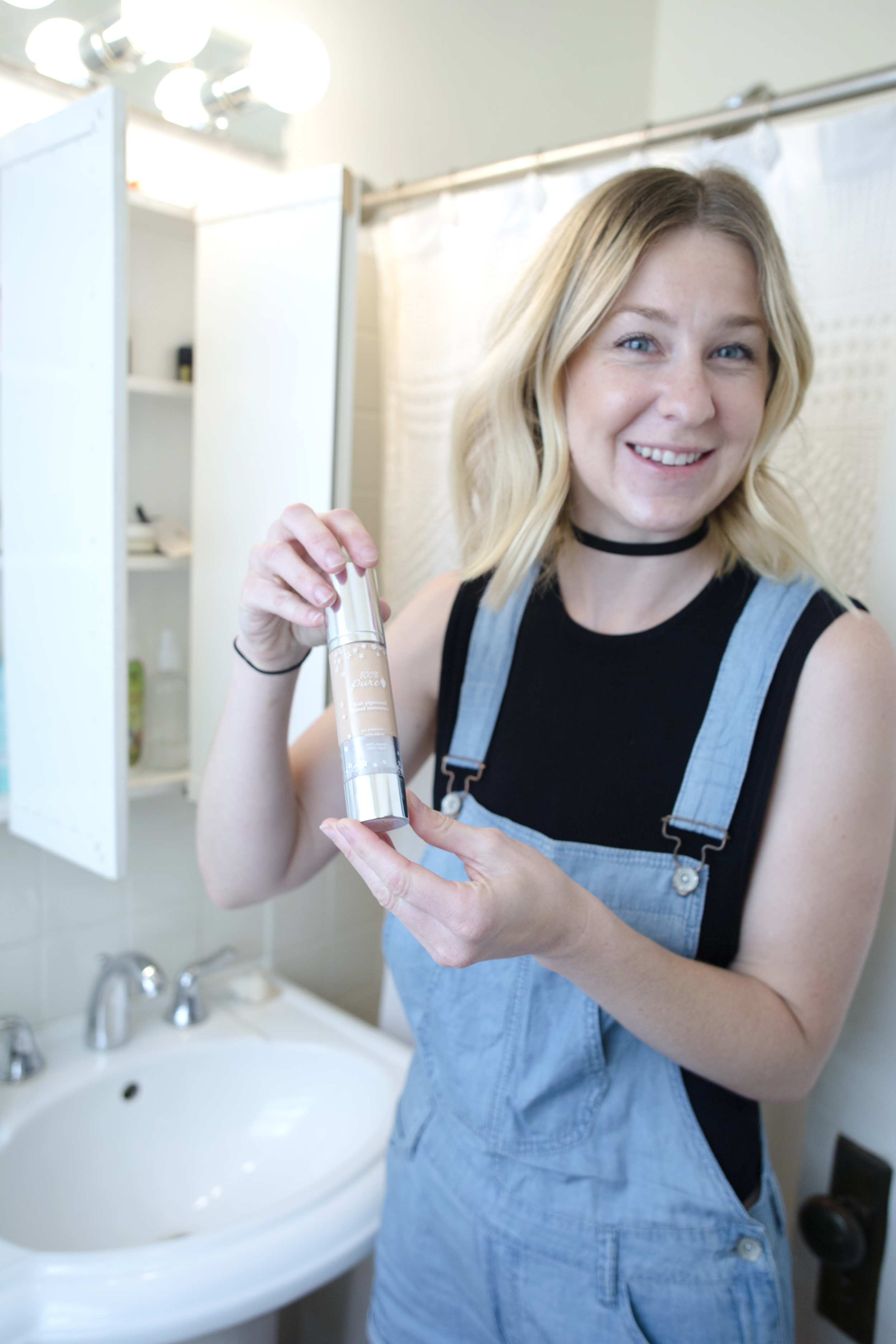

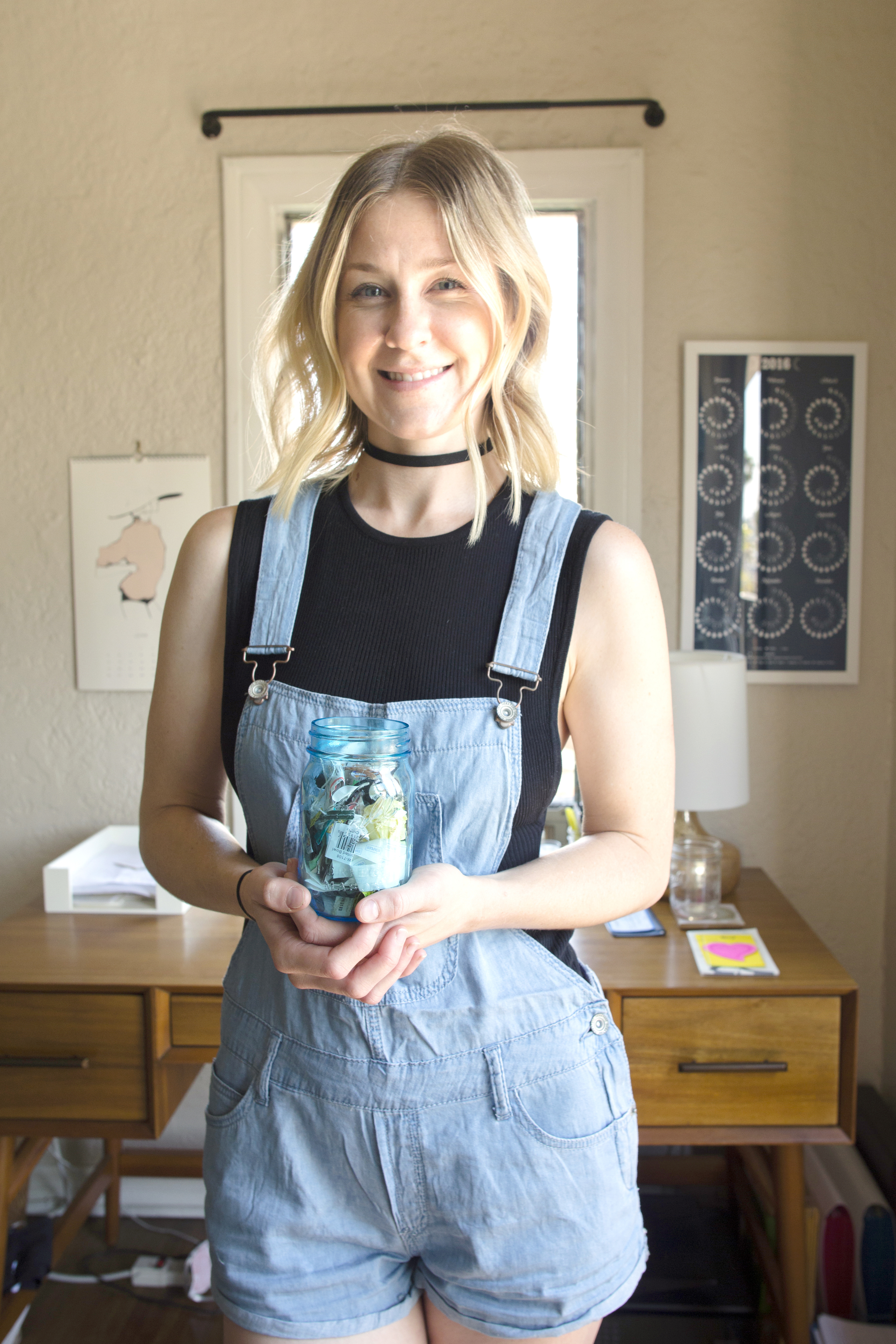
More from our blog:
Hello to 5 Time-Saving Beauty Tips from Nikki DeRoest
The Hello to Beauty founder is dishing the beauty goods.
Our schedules are crammed. We can barely make enough time to get to that 7PM spin class after work-- so forget a 30-minute AM prep before work when we need to look presentable. We need a beauty routine that works for our schedules, not against them.
When you work a 9 to 9 every second is valuable.
To help us hack our morning beauty routine, we asked Create & Cultivate DTLA panelist Nikki DeRoest and Hello to Beauty guru to dish the beauty tricks she uses to make her life a little easier. Check her 5 key tips below, and be sure to catch her on panel this May as she shares how to succeed in the business of beauty!
1. Style your hair the night before.
Wash your hair in the evening and let it air dry either all the way or 80% of the way and then finish the last 20% with a blowdryer. You'll save time washing it at night, and will also help the health of your hair. I often completely style my hair at night so that I can do minor touch ups in the morning. You know what they say, when a woman says she can't go out because she has to wash her hair....there's some truth to that!
2. Invest in a good at-home mani.
I always use a "gel" topcoat on all of my at-home manicures. My favorite one is from Sally Hansen’s Miracle Gel, and it prolongs any of my manicures to last at least a week, but I don't damage my nails like the in-salon gel manicures. (Tip: You can use ANY brand nail polish with that topcoat and it works wonders!)
3. Have a masquerade party.
I don't know if I'd call it a hack, but using a lot of face masques is a REALLY good idea! Your skin will love you for it. I switch up the different types of masques, and usually sleep in them.
4. Glow up.
Glowing skin will always make you look younger. Promise.
Make sure to always add a good highlight to the cheekbones to give yourself a youthful glow. My favorite is RMS's Living Luminizer.
5. Have your boss look nailed down.
If you are a busy boss, I think it's important to come up with your "look." That way when you are getting ready for your day-to-day, you don't have to think too hard and can feel confident walking out the door.
MORNING HACK: HAVE YOUR BOSS LOOK NAILED DOWN.
Tweet this.
I have my standard "look" and easily switch it up with different lipstick shades. Of course, in the evening or weekends it can be more of a free-for-all, but I think it's important to know your routine and look so you can get it done quickly.
Celebrating #WorldKindnessDay with the Founders of The Kind Campaign
Killing it with kindness.
Kindness Day was born when a collection of humanitarian groups came together on November 13, 1997 and made a “Declaration of Kindness”. Donating books, food or clothes to your local community is a great way to celebrate. However, these boss ladies went even further and launched an entire campaign.
Both Lauren Paul and Molly Thompson, co-founders of The Kind Campaign experienced bullying in middle and high school. Experiences that shaped who they are and gave them the first-hand knowledge needed when they launched Kind Campaign.
While attending Pepperdine University, Lauren had the opportunity to intern for Tom Shadyac on his documentary project, I Am. Wanting to do something since being "severely bullied" in middle school, Lauren shares that the experience working on a documentary gave her the idea to work on a documentary of her own. One that specifically addressed the issues of bullying.
Lunch in the Broadway Cafe at Pepperdine was the starting point, when both Molly and Lauren enthusiastically said, “YES” to an “uncharted adventure.”
“It was during that life-changing lunch,” shares Lauren, “that I pitched the idea about creating a documentary.” Molly was all-in. “From that moment on,” she says, “we dove head first into everything. The moment we turned on the cameras and held our first interview for the film, we both knew there was a huge potential for something greater.”
That was in 2008. Bullying wasn’t the hot-button topic it is now. They didn’t know if people would be willing to open up about their experiences. But the moment women and girls started talking it was clear that the issue had been swept under the rug for too long. Like Lauren, Molly had her own share of bullying experiences in high school. “Bullying specifically between females,” shares Molly, “was not addressed. It was almost expected and accepted as a rite of passage.”
The college seniors were about to launch a movement.
Those initial interviews for Finding Kind, paved the road toward Kind Campaign, which officially launched in February, 2009. Since inception, Molly and Lauren have spoken at over 400 schools in North American and the UK, activated 390 Kind Clubs across the globe, and Lauren shares that “Kind Campaign Assemblies are now hosted by faculty and volunteers almost every day of the school year.” The co-founders are getting ready to head out on their 12th Founders Assembly Tour.
It’s been an incredible journey for both. Lauren grew up in Orange County and Molly in Dallas, but after sharing a laugh over a YouTube video their junior year of college the two became “fast friends.”
“It feels very surreal looking back on the last several years,” shares Molly who gave birth to daughter Lyla last August and understands the power of the messaging more than ever. “When we first started Kind Campaign, we were running on passion and adrenaline, pulling all nighters and barely scraping by with enough funds to keep going and spreading the movement.” Now the goal of offering free global programming is a reality.
Lauren knows that more than ever young women need to know “that they matter, they are heard and they are equal. That no one can tell them who they are and what they can and can't accomplish.” She also brings up the power of social media and the influence it has over girls’ self-esteem. “There needs to be more conversation about how to have a healthy relationship with your phone. To remind girls that their worth is not determined by how many likes or followers they have.” Adding, “This is something we ALL need to hear and think about.”
More from the co-founders below.
What do you think young women and girls need to hear now more than ever?
Molly: That they are strong, powerful, beautiful, inspiring, unique, and more than capable of accomplishing anything that they put their minds to. And then remind them of this over and over and over again in order to combat the mixed messages that women and girls are fed by the media, by what is going on in our world today, by the experience that they have at school or in the workplace, and by the things that they start to tell themselves because it has become so ingrained within them. I think more than anything they need to be encouraged and allowed to be whoever it is they truly are, rather than to be told what it is they can or can't do, or be put in a box. Now, more than ever, I think we need to remind ourselves and our peers that we are enough, more than enough; and no one can take away our intellect, our self-respect, our beauty, our talents, our voice, or our worth
How can we each carry kindness into the world?
Lauren: Serving others doesn’t necessarily mean starting your own non-profit or dedicating your whole life to community service. One of my favorite quotes was said by Howard Thurman. It reads: “Don't ask yourself what the world needs; ask yourself what makes you come alive. And then go and do that. Because what the world needs is people who have come alive.”
I deeply believe in that motto. There is nothing better than a person who comes alive when they tell or show you what they do or what they’re passionate about, whether that’s being a teacher, sailing, owning a bakery, being a lawyer, singing or being a mom. You will be the best you if you find a way to do what you love and love what you do.
Molly: Every single person has the ability to change the course of someone else's life, just by being awake, being aware, and being kind. We truly do not know the battles that others face in their day-to-day lives, so if we just focus on ourselves and our ability to carry kindness into the world, and we are a light in someone else's life (however small it may be), we have the chance to make someone's day and even save their life.
What is a time in your life when you thought, 'I can't do this anymore?'
Lauren: When I went through my experience being bullied in middle school I remember waking up every morning and thinking that there was no way I was going to make it through another day of school. I went to bed every night not wanting to wake up in the morning. I truly lost myself. But with the support of one friend and my family, I was able to dig myself out of that depression and now I look back and that dark time and know that it all happened for a reason. Without that experience, I would not be doing the work I am doing. I am now able to stand in front of hundreds of girls in our assemblies and remind them that their school experience is just one chapter of their story. That no matter how dark the chapter is that you are in, there is a whole life ahead of you, waiting to be lived, filled with love and adventure.
What's a surprising story you heard during a school assembly that's stuck with you?
Lauren: Rachel is a girl we met during our last Spring tour while in Utah. At the end of all of our assemblies, we take a picture with the group of girls we are speaking to and post the picture on Kind Campaign’s social media. We were scrolling through the girls comments on her school’s photo and came across this comment from Rachel:
“I was at the Kind Campaign assembly at Draper Park. You guys really changed my point of view on everything. I can relate to everyone in the film. Every girlfriend I've had, I have lost.This morning when I woke up I was thinking about committing suicide. I came to school today on the verge of tears. Once I got in and sat down I wasn't really paying attention but once I watched the movie and I was in tears. I came up and shared my Kind Card. It was about one of my best friends. He stood by me through all my hard times. Once I got home I realized that even though some girls can be rude and don't understand what their words can do that it shouldn't be worth dying over. I called my best friend and talked to him for an hour. I was just crying my eyes out. Your assembly today? Yeah, it saved my life.”
We were really moved after reading that and immediately connected with her through Instagram and offered further support with our in-house counselor. Our on-call therapist counsels girls and parents who write to Kind Campaign and need extra conversation and support. This service is free of charge. I still keep in touch with Rachel and she is happy, healthy and doing so well!
What does female empowerment mean to you?
Molly: Everything. Female empowerment is everything. Celebrating each other, our accomplishments, our differences, our failures and our victories so that we feel emboldened and proud of who we are with the knowledge that we are good enough. It has taken on a new meaning since having Lyla. Even though it's always been important to me, now it's even more personal. Not just for myself, not even for all of the incredible young women we meet through our work, but for her - my little heartbeat. She needs to know her worth and feel supported and celebrated. Not judged and picked a part, scrutinized under a more harsh microscope than others.
"Female empowerment is everything."
Tweet this.
Lauren: It means getting to know yourself. Loving and respecting your body, heart and mind. It means doing your best to let go of those female insecurities we all harbor. It means feeling genuinely happy for other women and celebrating their beauty, uniqueness and accomplishments without going to a jealous or competitive place. Don’t be a part of drama and gossip.
What’s on your career bucket list?
Lauren: I’ve always dreamt of writing a book. I would also love to continue speaking in other countries. Molly and I took our Kind Campaign Founders Assemblies to the UK last year and I would love to see our programming continue to spread globally.
Molly: Honestly, in so many ways I feel like I've already exceeded what any bucket list could capture. Not to sound cheesy, but I really do feel so unbelievably lucky to be in the position I am and do what we do. We have always said, "If we can just impact one person, then it has all been worth it." And thanks to social media for making this world seem so small and allowing us to see Kind Campaign's impact, we have the opportunity to hear from that "one person" who has been impacted on a regular basis. So I guess my career bucket list would be to keep Kind Campaign's messaging current enough as time goes on to continue to have such a profound impact on people. And to meet Oprah.
How This Female Comedian Went From Master of None to Master of All
There's no such thing as a career path.
Noël Wells spent one-season on Saturday Night Live before she landed opposite Aziz Ansari on Master of None, where she played Rachel.
She's also writes and sings lead in her band @t.h.e.m.a.r.y.s. and Power Couple (working title) a show she created, wrote, and is attached to star, was picked up by Comedy Central.
If that's not enough, earlier this year at SXSW Wells made her directorial debut in Mr. Roosevelt, a coming-of-age comedy that Wells wrote, directed, and stared in. The movie follows a young comedian Emily, played by Wells, who has gone "viral" with a spaghetti vid. But going viral isn't all it's cracked up to be, and when the titular character (spoiler: her cat) falls ill, Emily treks it back to her hometown of Austin where she must face the life she left behind. Namely, her ex-boyfriend and his Pinterest-perfect new girlfriend, who has gallery-walled the living room space and has the pair off coffee.
What follows is a frank misfortune of events (plus some smack talking on LA Mexican food) that leaves Emily wondering WTF happened to her life? We caught up with the quad-threat to real talk airbrushed armpits and why "Hollywood is just a bunch of weirdos trying to find their way."
Important question first: Why name the cat Teddy Roosevelt?
I wanted the cat to have a sort of timeless iconic name, the sort of name a younger person would think to name an animal, but also one that could sound like an actual important person so audiences who haven’t read the synopsis could have the potential of being surprised about who Mr. Roosevelt is. Originally I named him Mr. Rogers, which felt very much like “childhood” and burying the past, but my producers were working on a Fred Rogers movie already and so we had to change the name. After a couple of ideas, Teddy Roosevelt felt like it matched a big, orange cat and had the gravitas of something bigger. Since then we have had a lot of weird Teddy Roosevelt coincidences surrounding the film, so it feels meant to be.
Second: Do you really think LA has bad tacos?
Well I think my real battle is the big burrito/taco standoff. Tacos beat burritos, hands down. As far as LA tacos vs. Austin tacos, I like smaller taco trucks in LA, but I think generally I prefer Mexican food in Texas. It’s just more flavorful! Please don’t hate me!
Now...Working with Aziz you said that you felt the two characters were “on equal footing.” Why, besides the obvious, was this important to you?
I just am not interested in being an actress or creative that doesn’t have some say in what’s happening. I like collaborating, I want to be engaged. I have too many things inside me and I need places to put them. When I don’t, I get really depressed and despondent.
Do you feel like you’ve been able to be your authentic self in Hollywood?
I’m sure we all cave to some pressure to be like “something” else in order to fit in, and as much as I think I’m always being true to who I am, I see many ways I chase after the wrong things or people in this town. That being said, Hollywood is just a bunch of weirdos trying to find their way, and because of that, I’ve been able to find my true self more and more and it’s even welcomed. The most awkward things for me are glamorous events. I’m not great on red carpets or photo shoots, but I’m learning how to have fun with image where before I would think I was a liar or faking if I dressed up. I think I’m realizing I’ve been in the glamour closet and I actually like being fabulous. Time will tell.
Wells in Mr. Roosevelt
You’ve been promoting your directorial debut, Mr. Roosevelt, which, you also wrote and star in. More women are taking their careers into their own hands. Why was this an essential part of your journey?
I am always thinking about things to make and write and create, it’s always in my head and I go crazy if I’m not making something. This just felt like a natural progression of that journey. I think now it stands as proof to myself and other people that I have the capacity to do much bigger things.
Speaking of your journey, in the movie your character, Emily, works an editing job while pursuing her dream, what are some of the odder jobs you’ve taken while hustling your dream?
Oh boy. I’ve been working since I was 15, oftentimes having 2-3 jobs at a time so I’ve had many an odd job. A few that come to mind: I was a manager of an ice cream store, I created Wikipedia pages for businesses, I wrote and photographed how-to articles for listicle websites along the lines of “How to make a smoothie” or “How to give yourself a pedicure”...and I used to make my own clothes and sell them on eBay.
Mr. Roosevelt addresses the aimlessness that so many young women feel. What’s your advice to them?
We are in uncharted times economically as so many careers shift into tech and so much is being outsourced. I think my advice is really about healing and community. We’ve become so fractured as a culture, the only way to sustain ourselves is to come back together, and if you take care of yourself and get better, you’re going to be able to help other people too. This gives you a sense of purpose, and you get better, so it’s a win-win.
"The only way to sustain ourselves is to come back together."
Tweet this.
There’s a brief moment in the film when Emily looks at her diploma that’s been left in a box in a shed-- and there’s this universal feeling of 'oh, right, this thing. What IS this THING?' And she puts it back. Have you had similar moments?
Yeah. My favorite part about college was that I picked up a lot of useful skills in production classes, but I think in many ways, it seemed like a developmental delay. A diploma doesn’t really mean anything, really. After college I sort of realized I was trying way too hard to succeed in a system, and that success wasn’t really making me happy. I missed out on other real-world experiences I should have been having. But it’s different for everyone!
This also might seem rather minute, but when the she meets up with the crew at the swim hole, no one has perfectly shaved armpits. And it felt like another fresh breath of relief. Let’s not airbrush armpits! Let’s not airbrush life. There’s obviously some poking at Pinterest-life throughout the movie. “Pecans from another state,” meltdown in mind here. Would love hear your thoughts on this.
My big thing in life, is I’m just not interested in manufacturing or falsifying anything. Beauty is all around us in many shapes or sizes, and in many ways it’s all perception. We get to say what is beautiful. So for me, confidence is beautiful. Love is beautiful. Genuine self-expression is beautiful. So images can be beautiful, but often times, beauty gets distorted, and then the essence of what is beautiful is twisted, and it confuses people and makes them feel bad about themselves. I grew up hating everything about myself because of these distortions, and this has been my personal journey as a woman, to just learn to love myself. And part of that has been by seeing through these distortions, and also recognizing other people who are distorting things are also confused. So Emily’s critique of these perfect women is also problematic, if that makes sense. She’s not seeing them for who they really are, which are hurting women just like her.
"Beauty is all around us in many shapes or sizes, and in many ways it’s all perception."
Tweet this.
Accepting that everything changes is part of growing up. Do you remember a point like that in your life?
This is going to sound dumb, but just making this movie is a major lesson in everything changing. You have something very set in your head about how it’s going to go, you have all these plans and goals about what it will be and look like and what it will do for you, and by the end, if you held onto that image, you wouldn’t have made any progress and you would be in despair because it absolutely is not anything like what you wanted. But that’s okay, it’s been an insane ride and I honestly know I’m better off for it being so difficult and challenging.
Female friendships are super important in the movie. How did you find support while making the movie?
The female actors on the shoot were all really incredible, and they kept me going, and my cinematographer Dagmar Weaver-Madsen was my rock through the shoot. She totally understood the spirit of the film from the beginning, and is also incredibly perceptive about the pressures and roadblocks that women face day-to- day on set. Anytime I would get discouraged, she was there pumping me up and supporting me unconditionally.
Do you feel supported by Hollywood?
Hollywood isn’t really one thing or one entity. I will say I have found my people in the city of Los Angeles, and I’m working to find my creative partners as well. Like anything in life, it’s a journey trying to find where you fit in.
Do you feel stronger doing something on your own?
I’ve always been one to do things on my own, but this has shown to me you really could take everything away from me, put me on a desert island with nothing but some stick and some sand, and I’d still figure out a way to put on a show. But also, I don’t WANT to be on an island alone, I’m really sick and tired of doing everything alone. I want to make things with people.
What type of roles are you most interested in?
I like looking at people’s darkness, the thing that makes someone tick, and also the things that make them lovable even if they’re outwardly being bad or insufferable.
We recently talked to Zoe Lister-Jones who employed an all-female crew, which we found incredibly inspiring. Who have you recently been inspired by?
I’m really impressed with a lot of my female friends as of lately. After Trump was elected, it’s been a year where everyone is looking inside and at themselves and figuring out what they can do to change themselves so they can be of service to the world. I have friends who are hosting salons at their homes, organizing writer’s groups, spear-heading political fundraisers, getting us together to volunteer across Los Angeles, and creating content like I’ve never seen before. No woman I know is content with despairing for too long, we’re all figuring out how to come together.
Given the recent exposure of sexual assault stories in Hollywood, what would you like to see change in the industry?
I just think I’m exasperated by the abuse on all levels. I am here to make art, and I wish more people were into the creation process rather than the fame or money or accolades. That may not change, so I think just rooting out abuse in all forms is what I’d like to see. Outside of sexual harassment, there are a lot of bad bosses yelling and screaming and abusing their employees, and there are people who commit a lot of creative “crimes” to get ahead. I wish more people would operate from a place of integrity and accountability.
Have you experienced situations that have made you uncomfortable and how did you handle it?
All the time. I’ve never gotten it quite right. I’d say about 50 percent of the time I stand up for myself in violating situations, and 100% of those times it initially appeared to backfire on me. But as time is playing itself out, I see now that defending myself or leaving a bad sexual situation or standing up to bullies was the right thing to do, and that will hopefully empower me to do that always. It’s better to be ejected from toxic environments than to stay and be eaten alive.
"It’s better to be ejected from toxic environments than to stay and be eaten alive."
What’s coming up next?
A lot of writing, a lot of percolating. Hopefully more directing and acting.
To check out Mr. Roosevelt, click here.
Top photo credit: Beachside
MORE FROM OUR BLOG
How This Massive IG Star Handles the Haters
It's so simple, it's brillz.
She’s got jokes. Which also means, she’s got brains.
Arielle Vandenberg, who is on a first name basis (@arielle) with the digital world, has been making videos and thereby making people laugh for decades. She says she made her mom laugh all the time when she was little, but it was her grandma who thought Arielle was, “the funniest kid ever-- she even wrote everything I said down into a book,” the actress and comedian tells us.
It was also her grandma who told her “Don’t do drugs,” when she first thought about moving to LA. "I think that's pretty great advice,” she laughs. While GMA might have kept the digitally savvy star on the straight and narrow, it's her hard work, diligence, and “being true to myself,” that have really paid off.
In December of 2015 the actress and comedian was one of the most followed personalities on Vine, with a fanbase of almost 2 million. People tuned in to watch her goof off, ask life’s big mysterious questions, and upload videos with bestie and now boyfriend (AKA from Cutty to CUTIE) Matt Cutshall. Though the video app announced its shuttering in 2015, her feat of amassing such a loyal and large following can't be ignored. It comes down to creativity and precise comedic timing. If you can get people to laugh in six seconds or under, with an iPhone, you’re doing something right. She's transferred her following to Instagram, proving that it wasn't a one-off. She's good a social. Like, really good.
Calling herself “the professional Jim Carrey impersonator,” it was the funny man who got Arielle hooked on comedy. “I wanted to be a comedian because of Jim Carrey. I would sit in my room alone and just make faces in the mirror for hours. And also Tina Fey, well because she's a powerhouse of a woman!”
Growing up outside of Los Angeles, Arielle got the bug for acting when she was young. She’s had roles in numerous TV shows like How I Met Your Mother and Bones. She’s opinionated, telling Esquire, “If you don’t like animals, you’re not living,” not worried about fangirling out over Justin Bieber or dressing as the pop star for Halloween (a role she reprised this year), and says “internet bullies” have been challenging, but jokes, “haters gon hate.”
It’s easy for her to keep going, even in the face of Vine’s shuttering. She continues to build her career in the face of a tectonic shift in the digital landscape. “I’ve always loved making people laugh,” shares Arielle, “so I made it my job. And now I have the best job in the entire world!” She can also bust out “performance dance” anywhere and everywhere to keep her spirits up and her morning prayers “make the day a million times better.”
"I've always loved making people laugh, so I made it my job."
Tweet this.
The multitalented digital star preaches kindness— makes sense she’s BFF with last year's C&C 100 honoree Lauren Paul. “Teaching young girls to be kind,” she says, is immensely important. “Kids are the future and kindness is the way.”
In the last five years Arielle says she’s “gone to third base” with her career, which, guess what? means we can still expect her home run. What might that mean for her? Making Jim Carrey (who else?) a costar, creating her own show, and “purchasing a wiener dog.”
Alrighty then.
MORE FROM OUR BLOG
How Cold-Calling Chanel Landed One Woman Her Dream Job
Twist ending on this one.
Alyssa Wasko cold-called her way into a job a Chanel. For most, that sounds like a dream job. (And it was.) But after six years at the fashion house, the budding designer struck out on her own, launching DONNI (previously Donni Charm). Wasko named the brand after her late father, whom she lost during her time at Chanel. She started making scarves as a way to cope with his passing, but it quickly turned into something more.
Today, DONNI, is a collection of everyday essentials, each with endless ways to wear. Scarves, capes, and more are made in Los Angeles by women who are like family to the brand. Something her dad would certainly be proud of.
You started you career at an incredibly chic fashion house. How did you land the job?
Persistence. I called the head of Chanel USA’s Visuals and Image department every day for about 3 months leaving him voicemails until he finally called me back. I think he gave me the job so I would stop bothering him. He was my boss for 6 years and now one of my closest friends.
Where does that drive and ability to pick up the phone come from?
I think it was how I was raised. If you want something go and get it. But, above all, I am old fashioned and I believe that the best things happen from a phone call. Every day there seems to be a new means of communication and I just like to keep it classic. The phone leaves no room for misinterpretation.
What did you learn while working there?
So much. What to do, what not to do. Working for a big corporation, you learn about infrastructure and procedures, experience that have proven invaluable for running Donni. I think my biggest take away is how important it is for each team member to see how their work directly affects the outcome and the brand’s success. Every email, phone call, meeting, brainstorming session, or even mistakes, by a member at Donni directly correlates to our growth and I think that is such a rewarding feeling. And I hope what makes them happy and excited to come to work each day!
When did you decide to strike out on your own?
I had already started Donni when I was working at Chanel, there were a few years of overlap. I was very lucky that my bosses were so supportive of Donni from the beginning. My father passed away during my first summer working with them so they lived through it all with me in a sense. Because I was able to sustain both for a while, it was hard to figure out when made sense to focus fully on Donni. But, as they say, man plans and g-d laughs and it just kind of happened after a few big orders and trips to our factory in LA. It just became too hard to sustain both and I wasn’t able to put 100% into both anymore.
Sometimes it’s the hardest moments that lead to our greatest development. Can you chat a little about this and how the loss of your dad gave birth to a new chapter?
My mantra and truly my survival was constantly telling myself to act and make decisions that would make my dad proud. A lot of people told me to take a semester off of school to cope, and while I considered it an option I knew my dad would have laughed and said “get your tush in gear. Wasko’s don’t give up.” I not only went back to school, but I took on another 3 classes to my already full course load and a few odd jobs. When that wasn’t enough, on an afternoon that wasn’t sufficiently busy I decided to make a scarf for myself and a friend adding a good luck charm to each. I had always loved scarves and found them so to be comforting yet effortless. Before I knew it, my piers wanted these scarves, and I was so confused! I went to school in Arizona where it was 90 degrees daily. But that’s how I realized my product was a real business, because people wanted more than just the scarf, they were buying into the idea, and the feel good component that it represented.
What would you encourage young female entrepreneurs to test out before they dip their toes in the startup world?
It sounds cliché, but don’t just start a brand to start a brand, let the idea find you—make sure you are truly solving a problem or filling a need, and make sure each of your products goes back to your fundamental solution. But furthermore, anyone can have an idea, and it is execution that determines your success or failure.
"Don’t just start a brand to start a brand, let the idea find you."
Tweet this.
What do you think are some of the biggest misconceptions about starting a business?
That it has this glamour to it. It doesn’t. You are always on the clock, always schlepping, always thinking of how to make things better—even when they are great. There is always room for improvement. I think a lot of people think you start something and hire all of these people and you can go on vacation whenever you want. Couldn’t be farther from the reality, its hard work! And it never stops. Ever.
You did a slight rebrand this year. Can you chat about that decision and why now was the right time?
Who knows if it was the right time, but it just happened. I felt simply that we had outgrown the Charm. I started this brand in college, and I have grown up a lot since then, so I wanted the name to reflect the more sophisticated lifestyle brand that we have grown into.
How do you expect DONNI to grow and change?
Retail is changing a lot these days, so I do see expanding our Direct to Consumer business, but I also try not to worry about the future, and just keep allowing the change as it comes. So far all of our growth has been such an organic evolution. Each pivot and change coming when something presents itself. I hope that that is how it continues. For a very long time.

